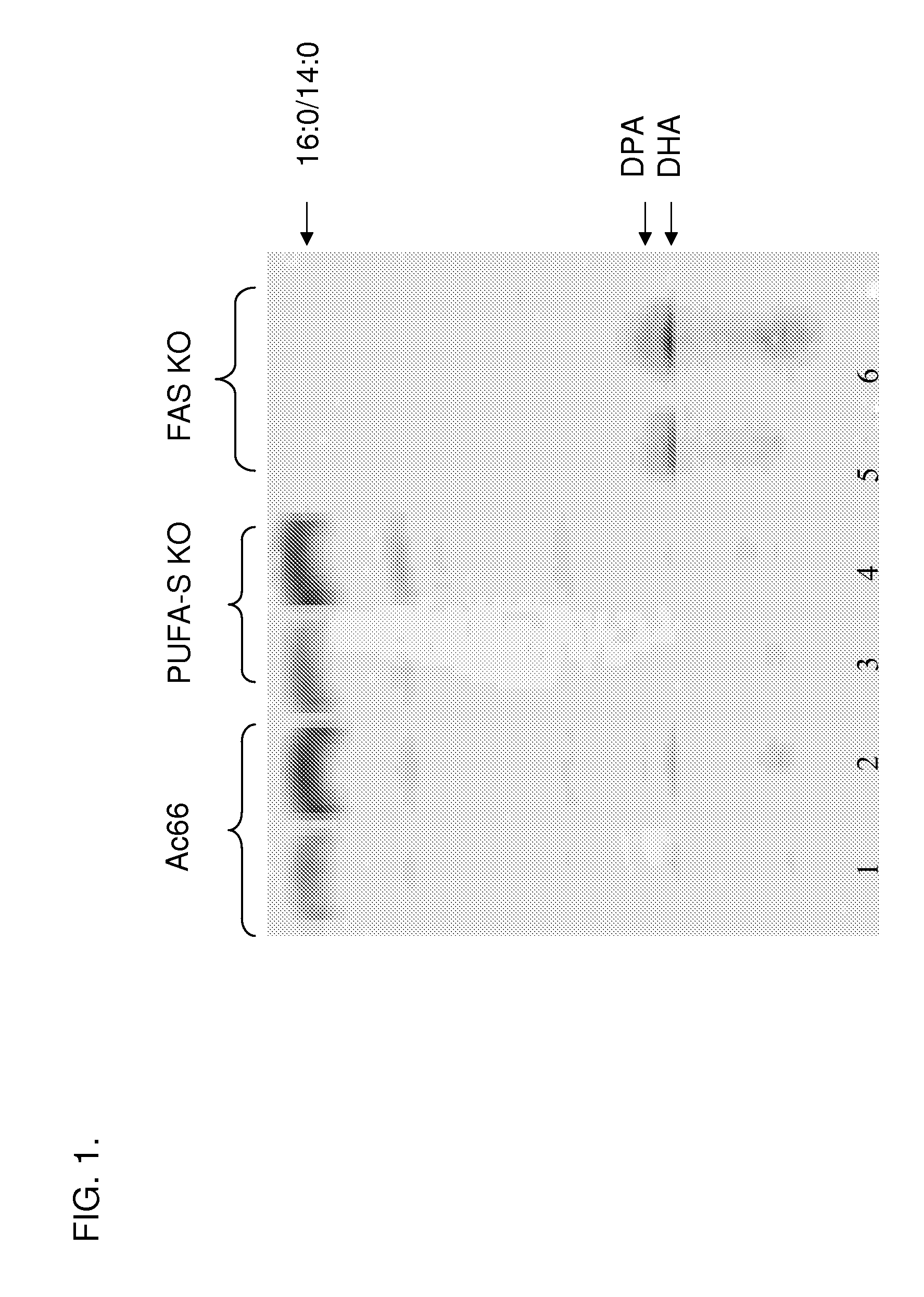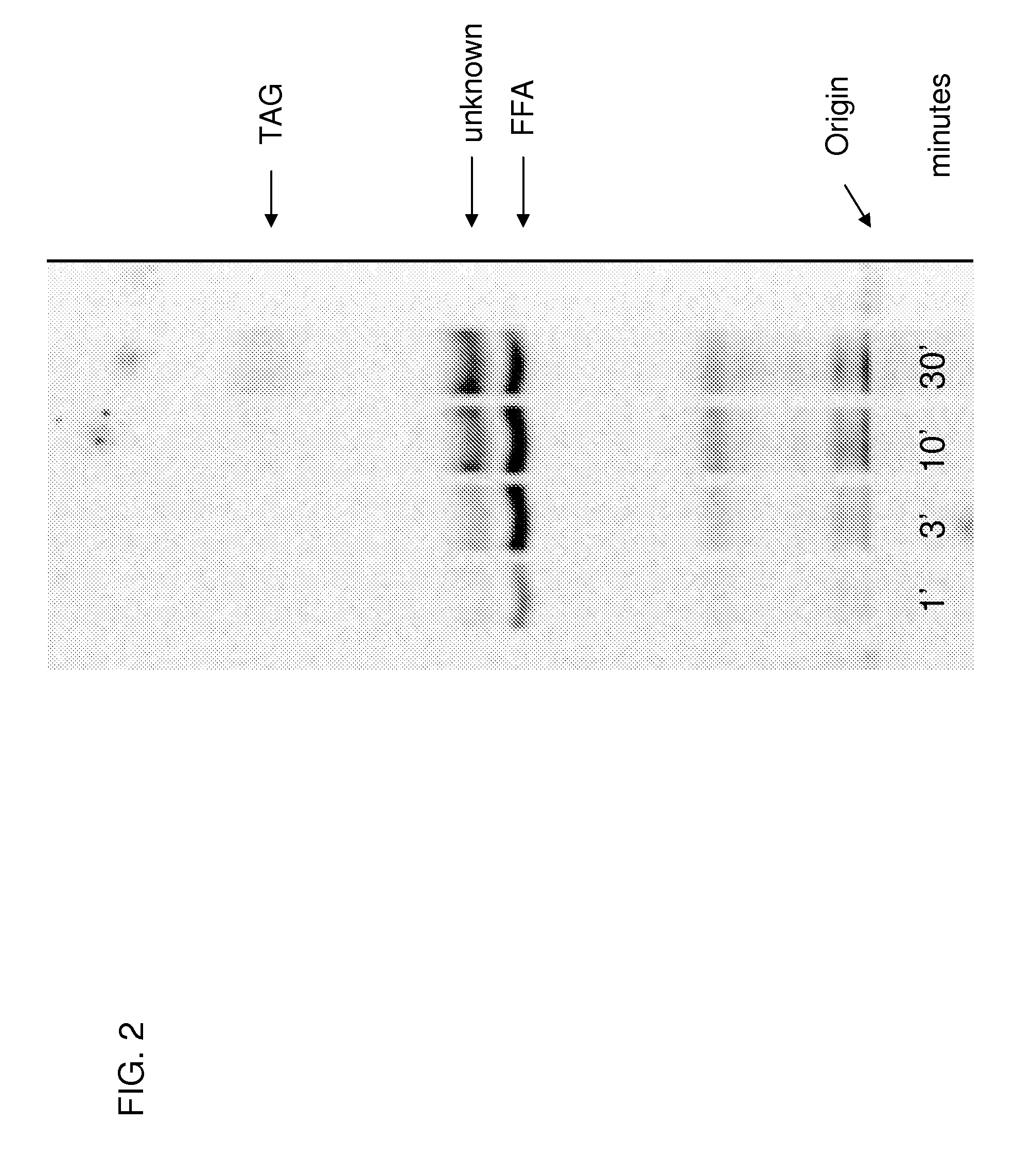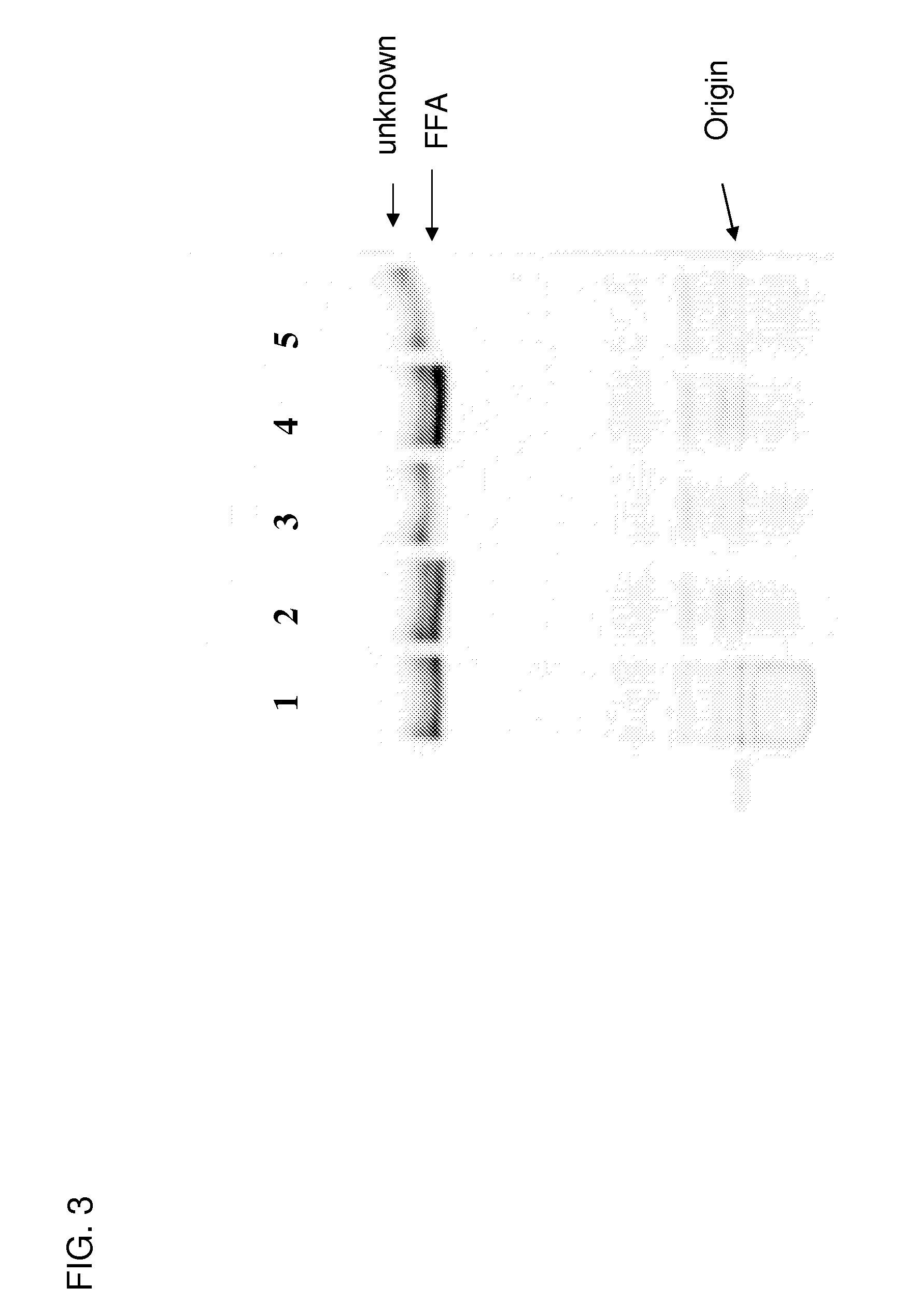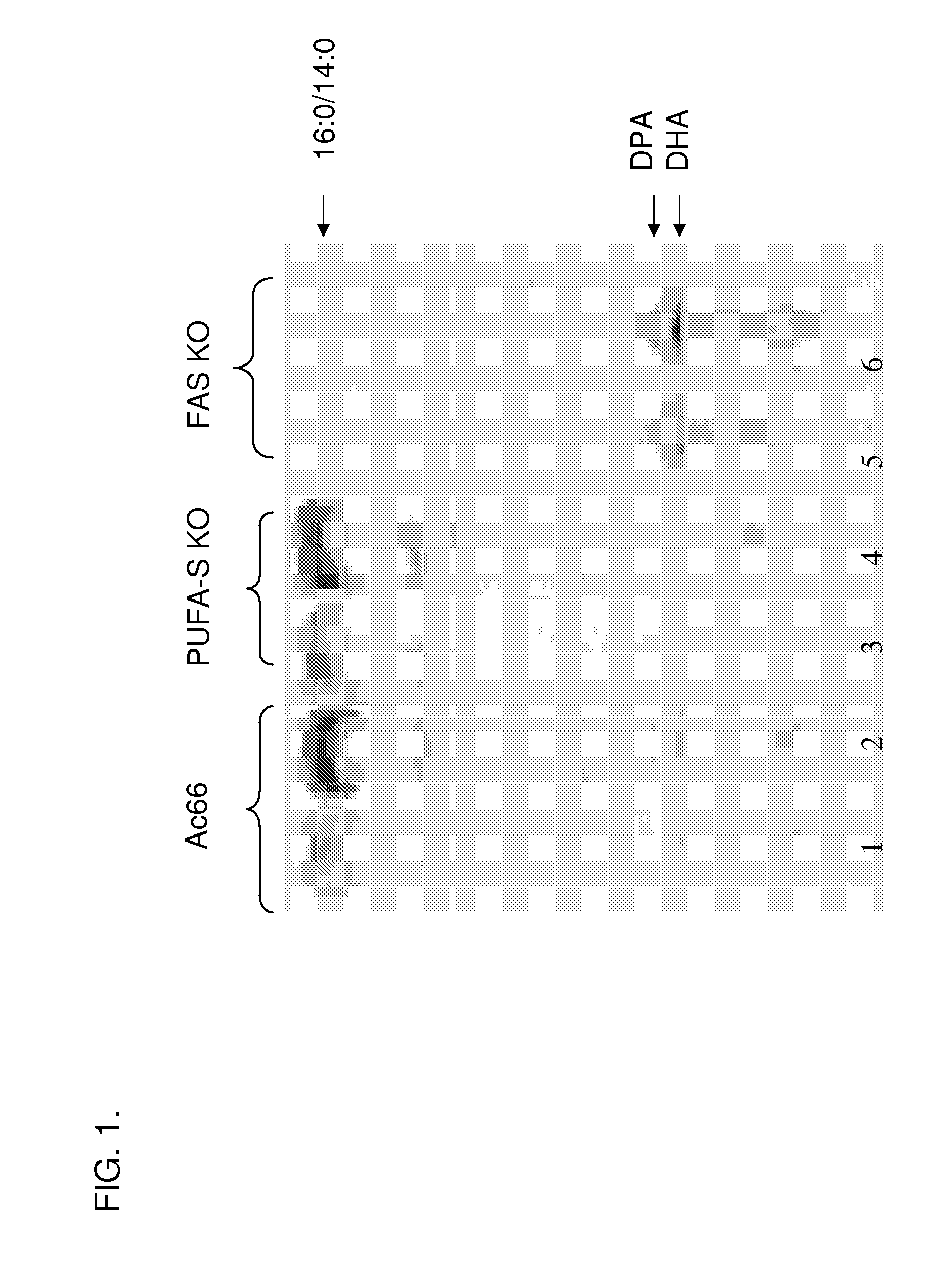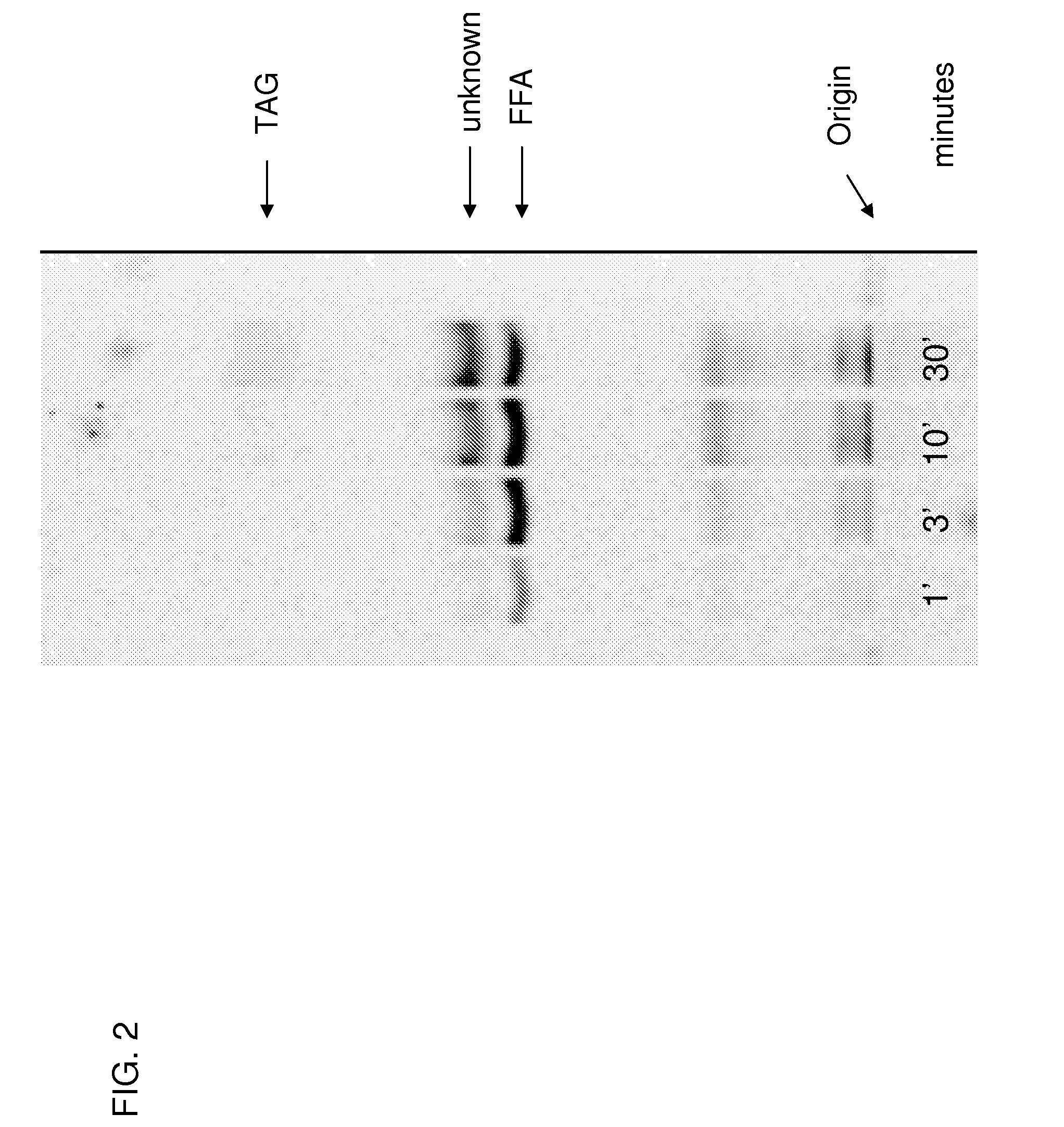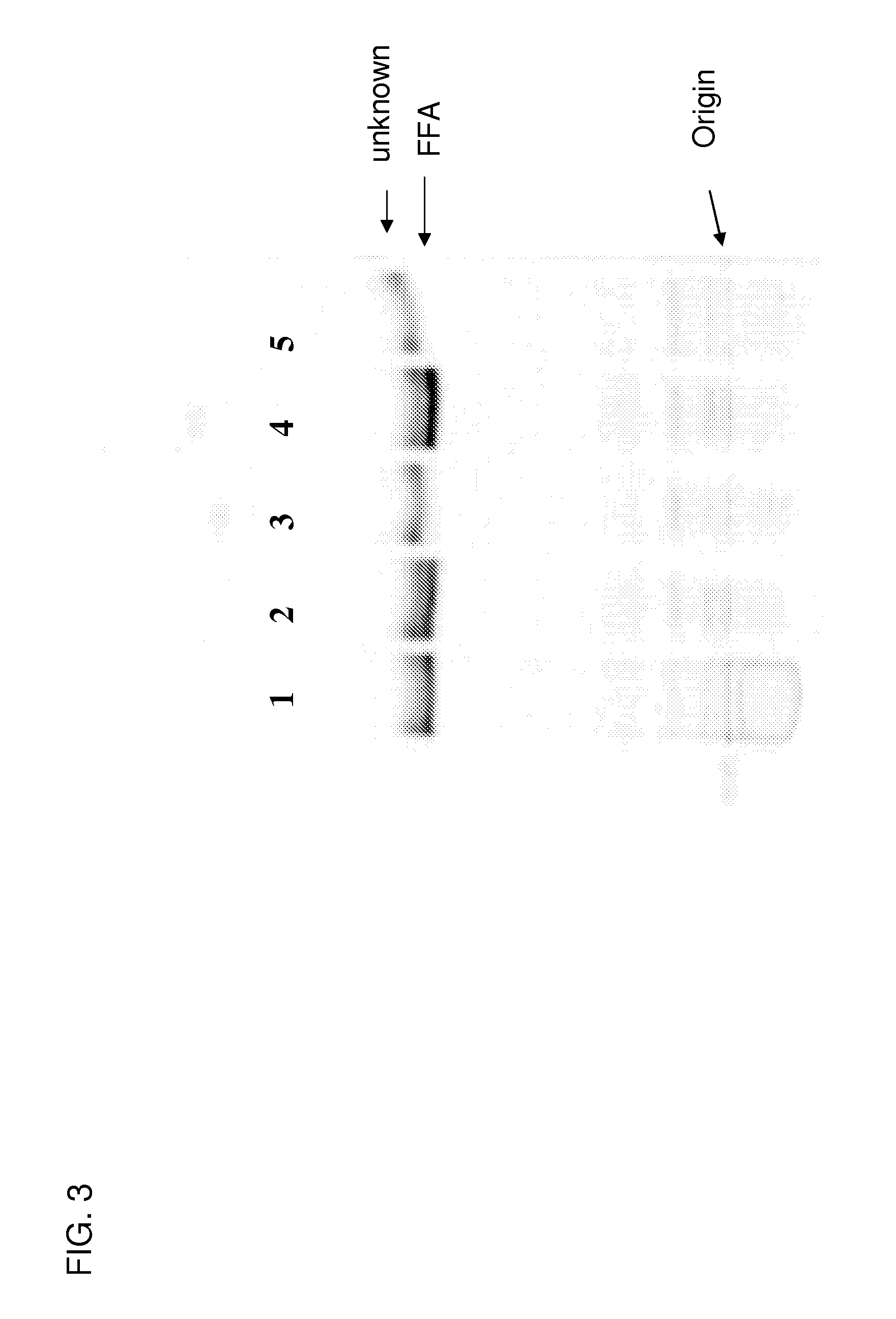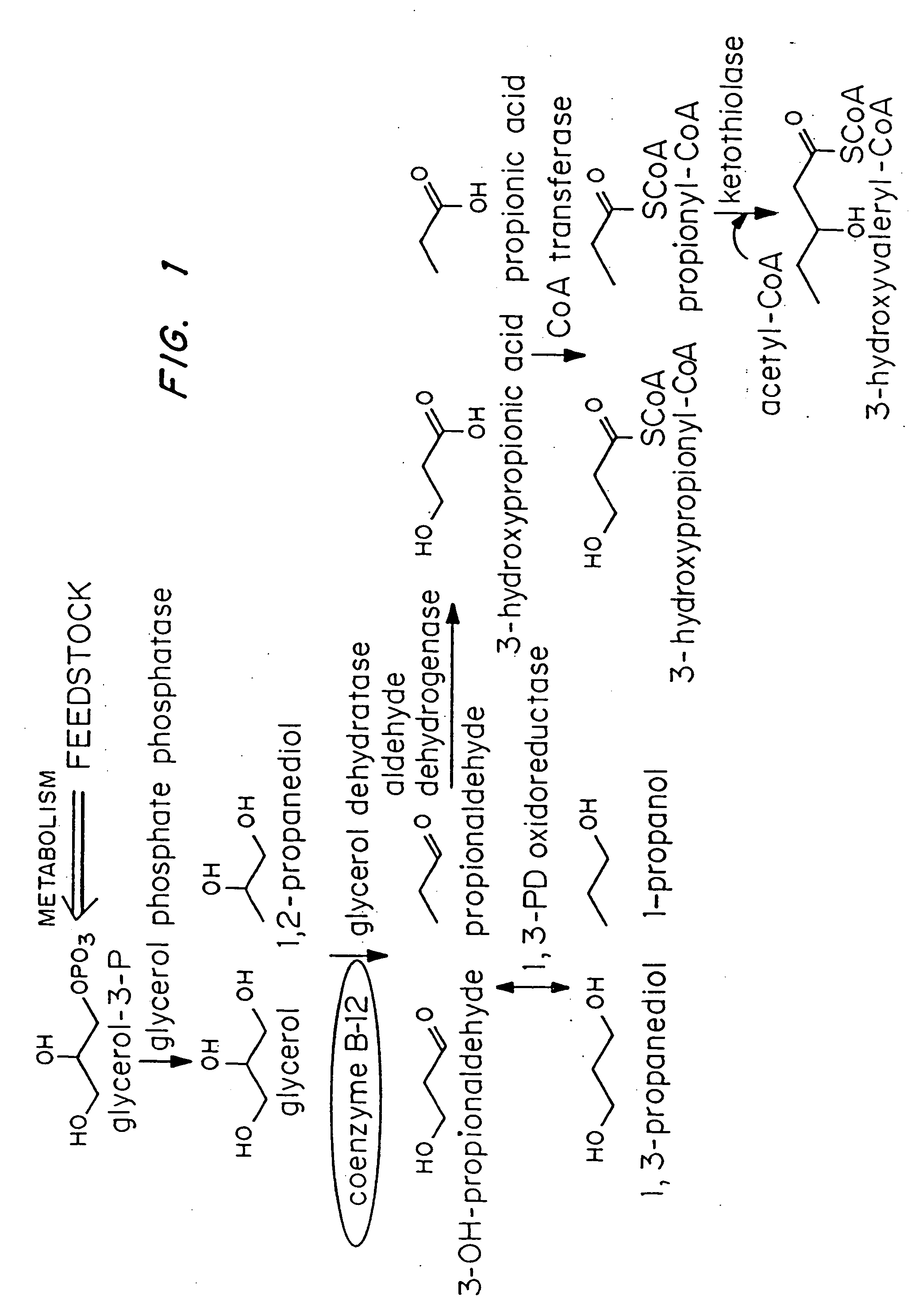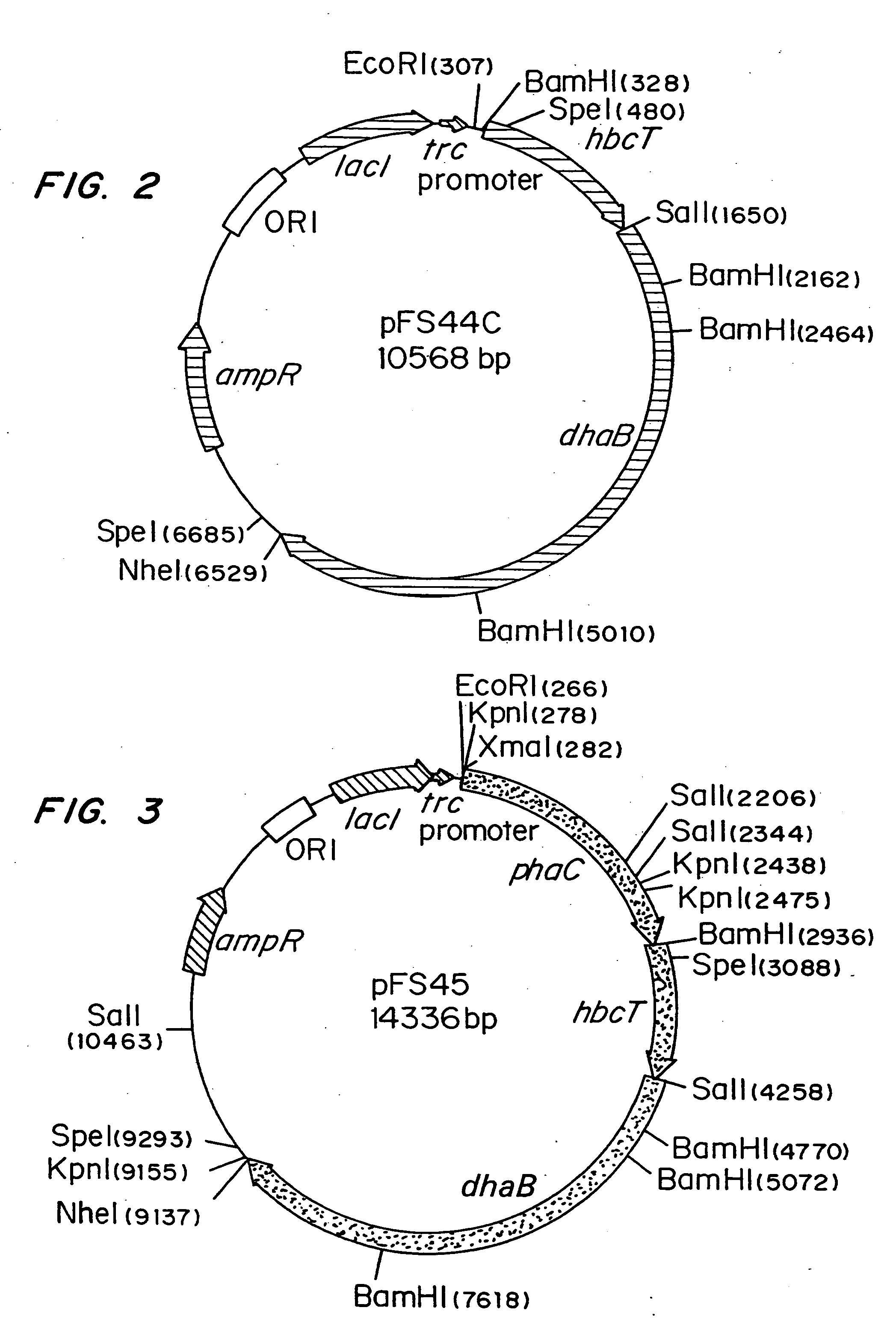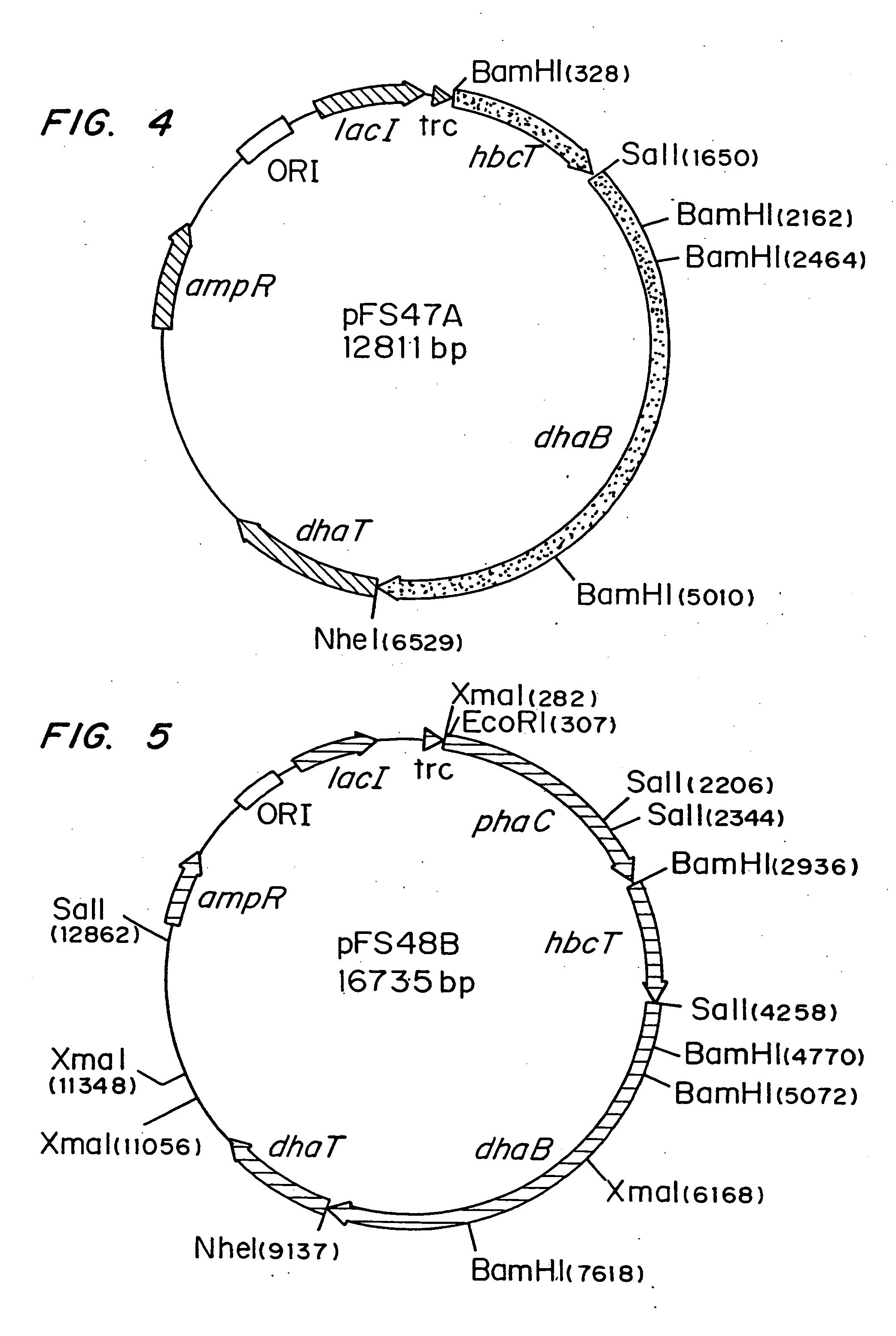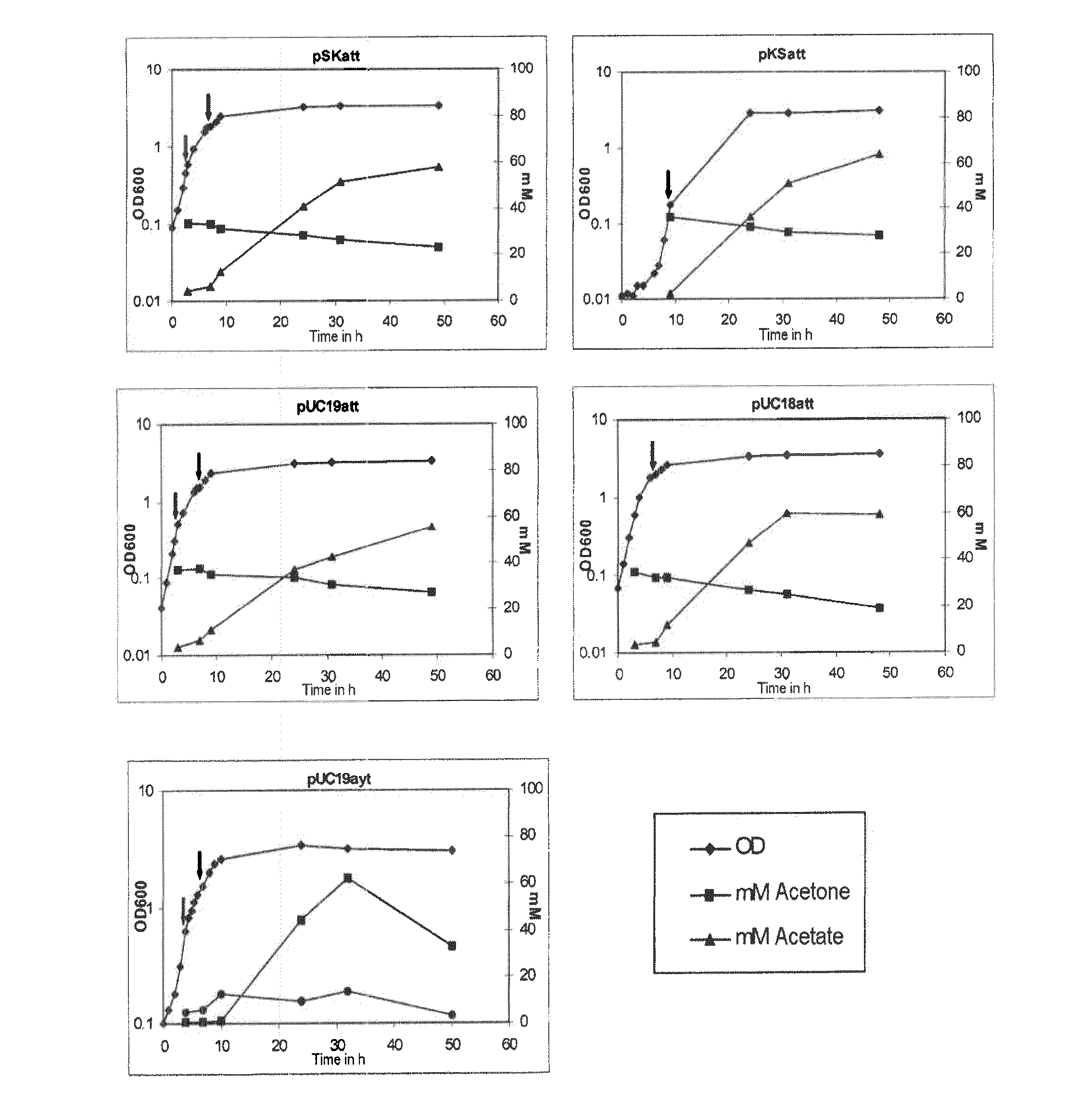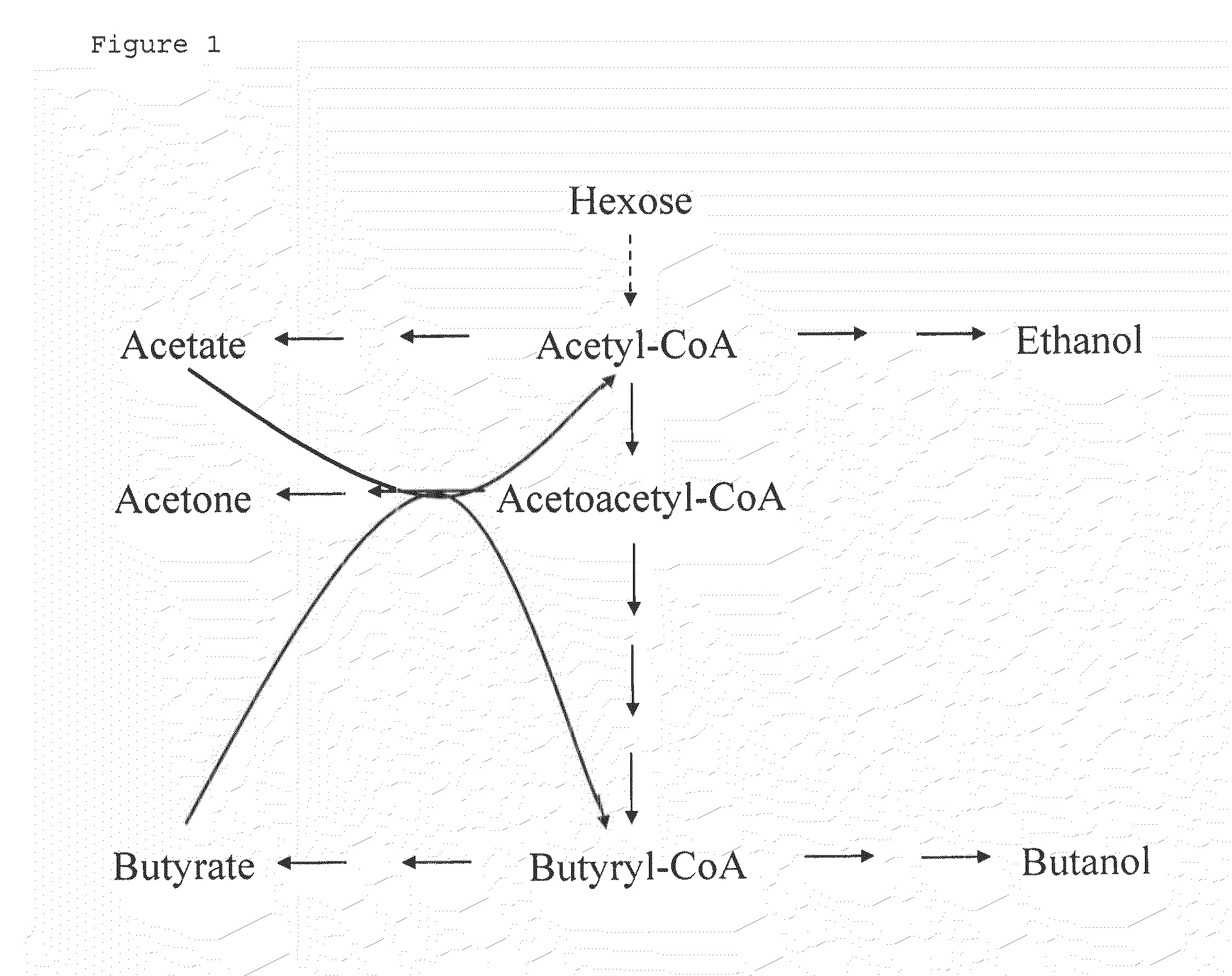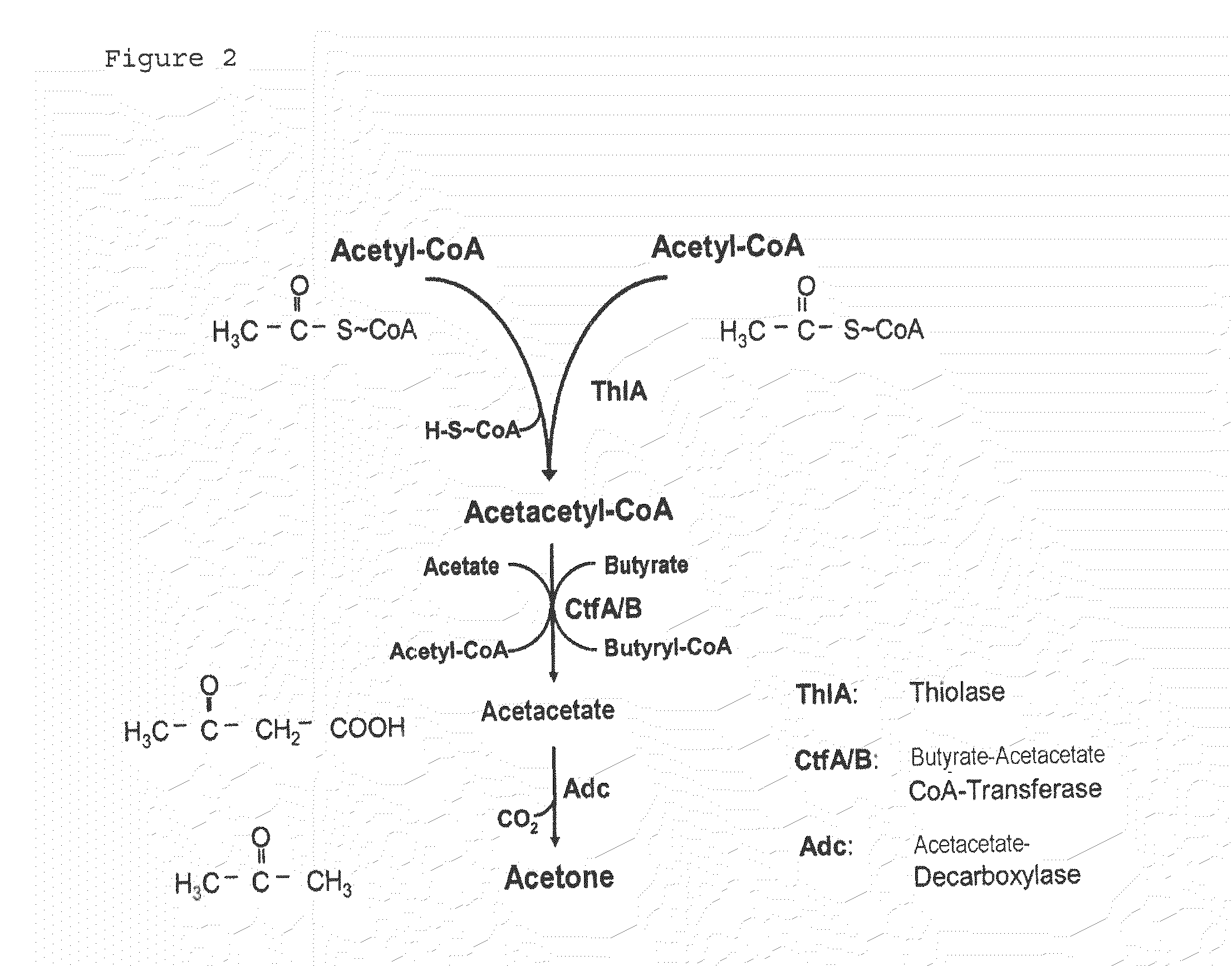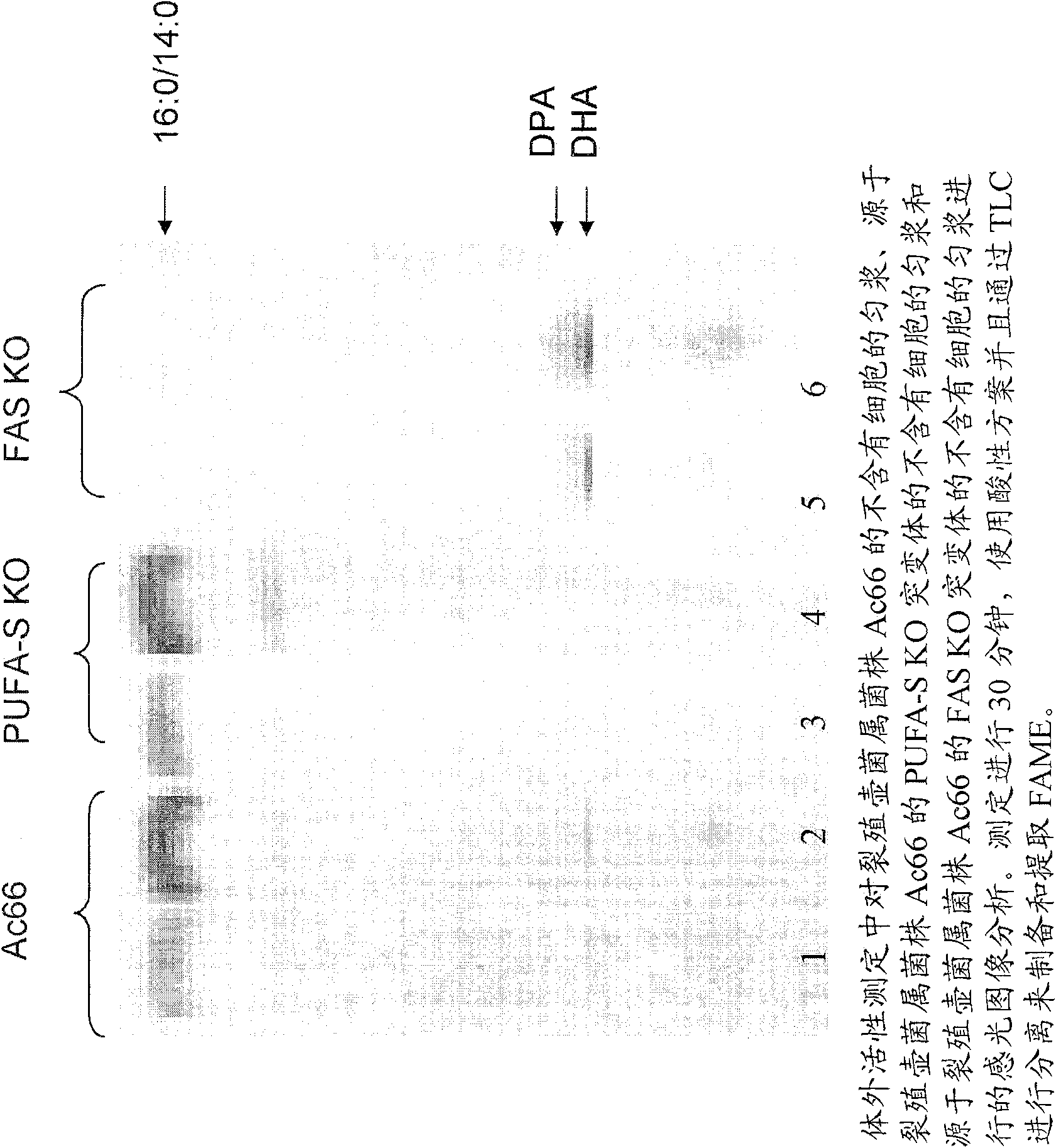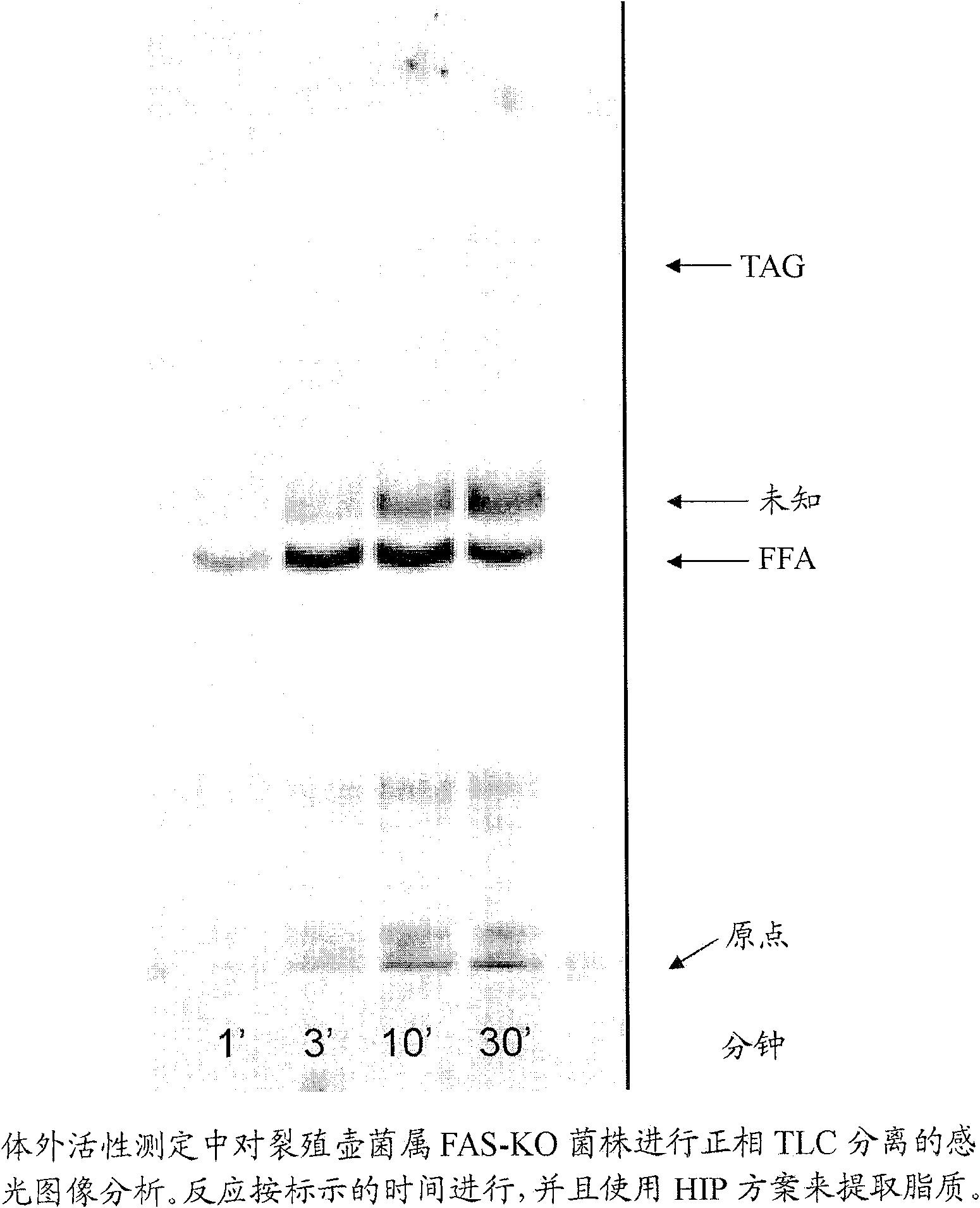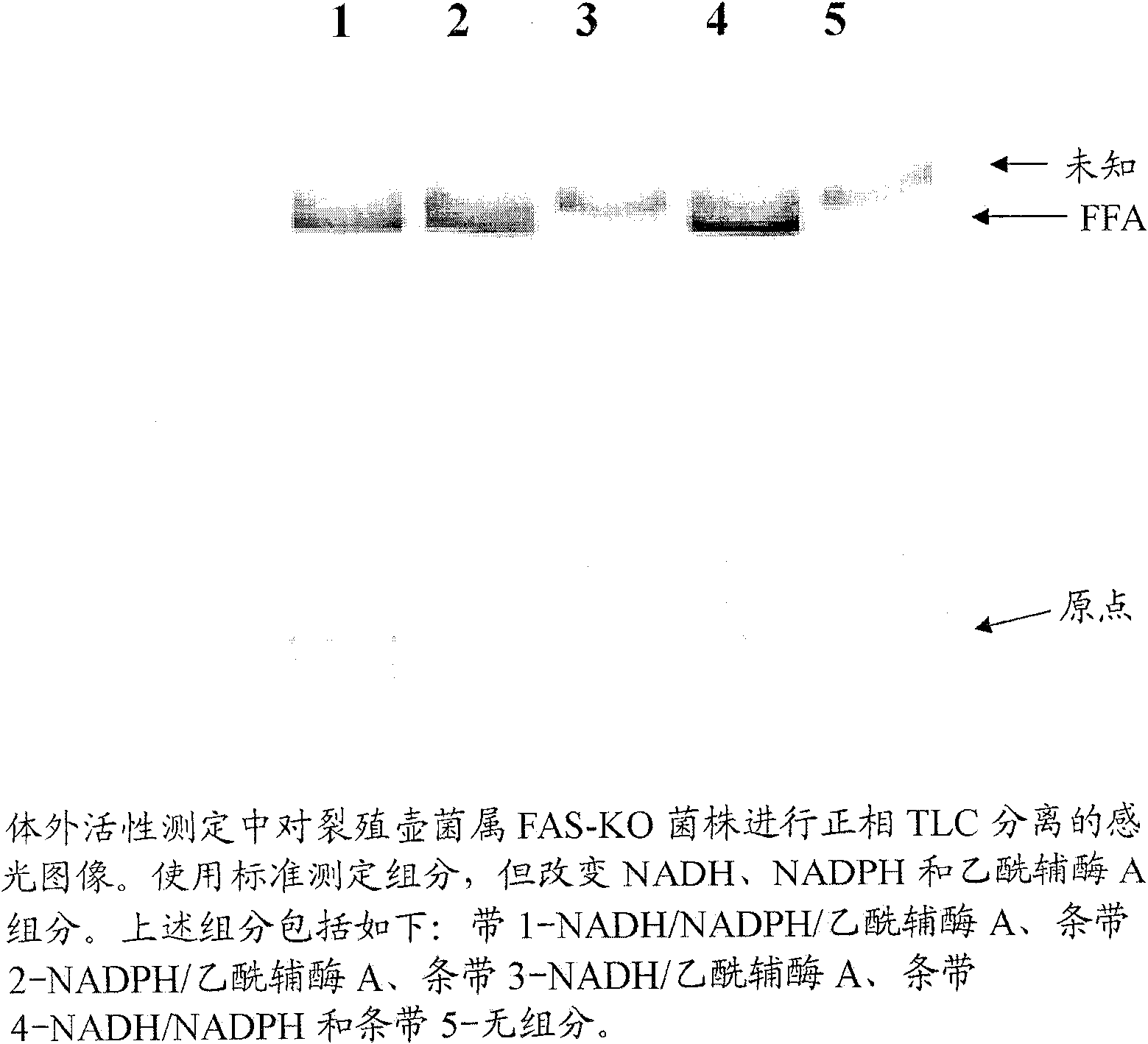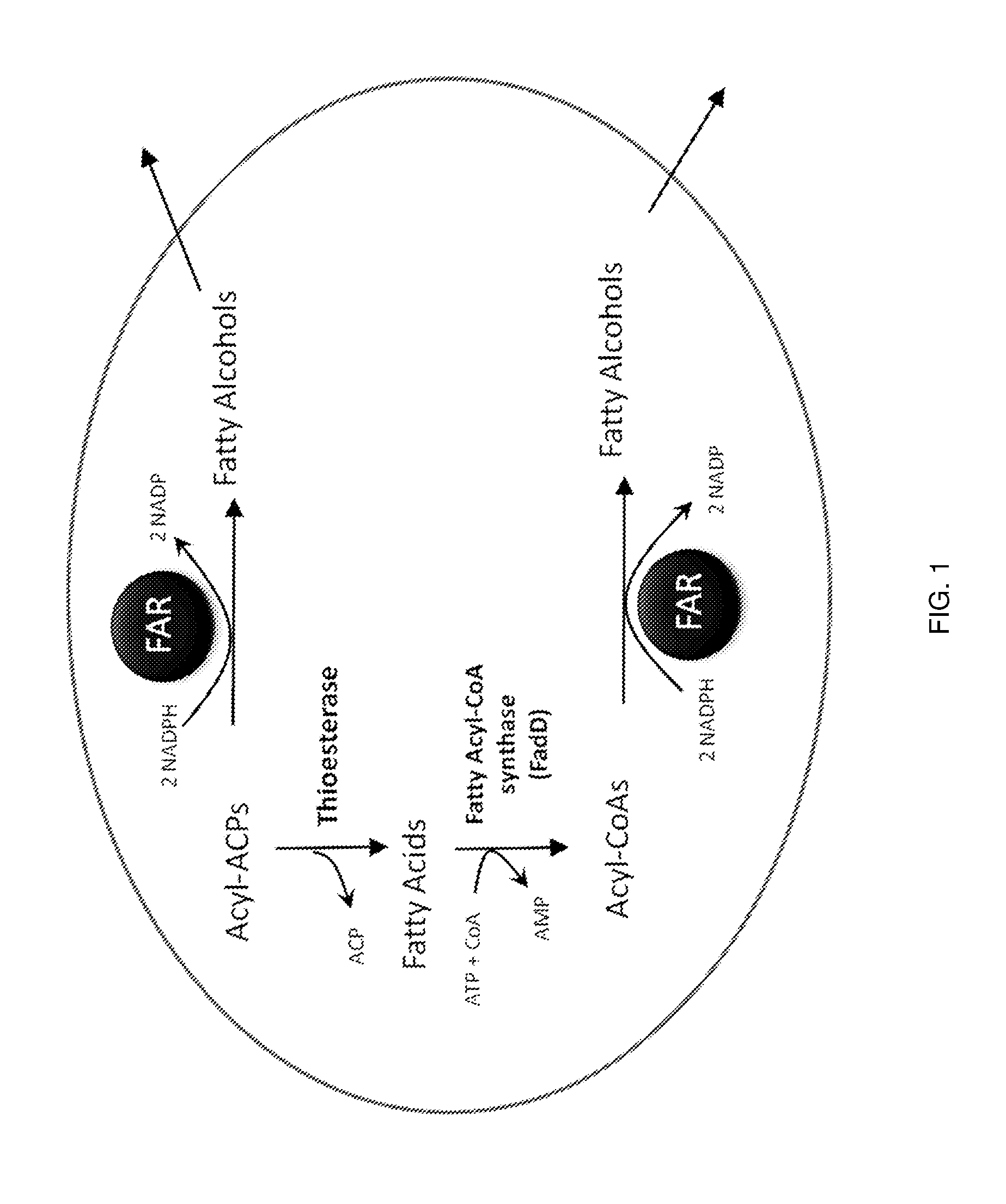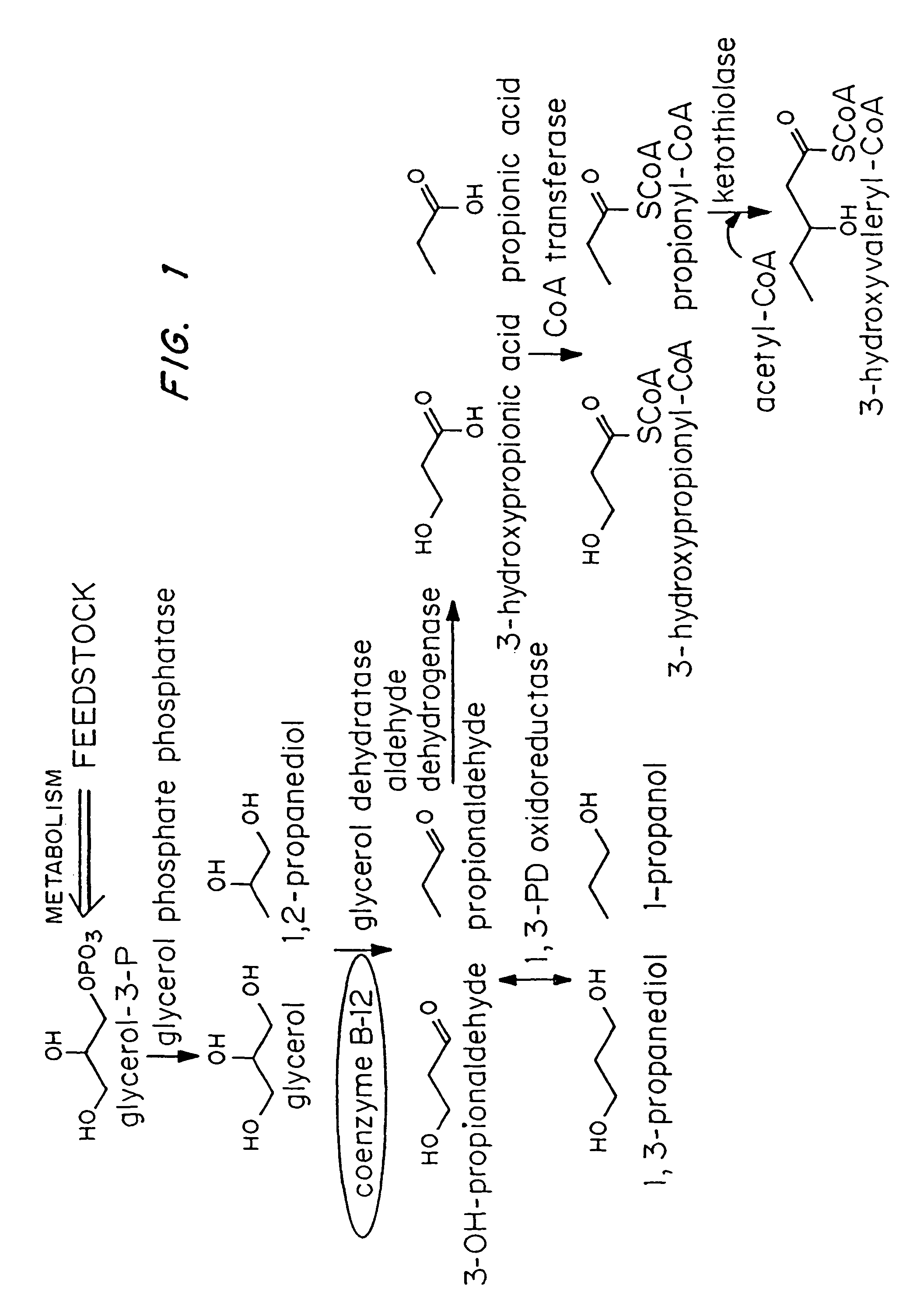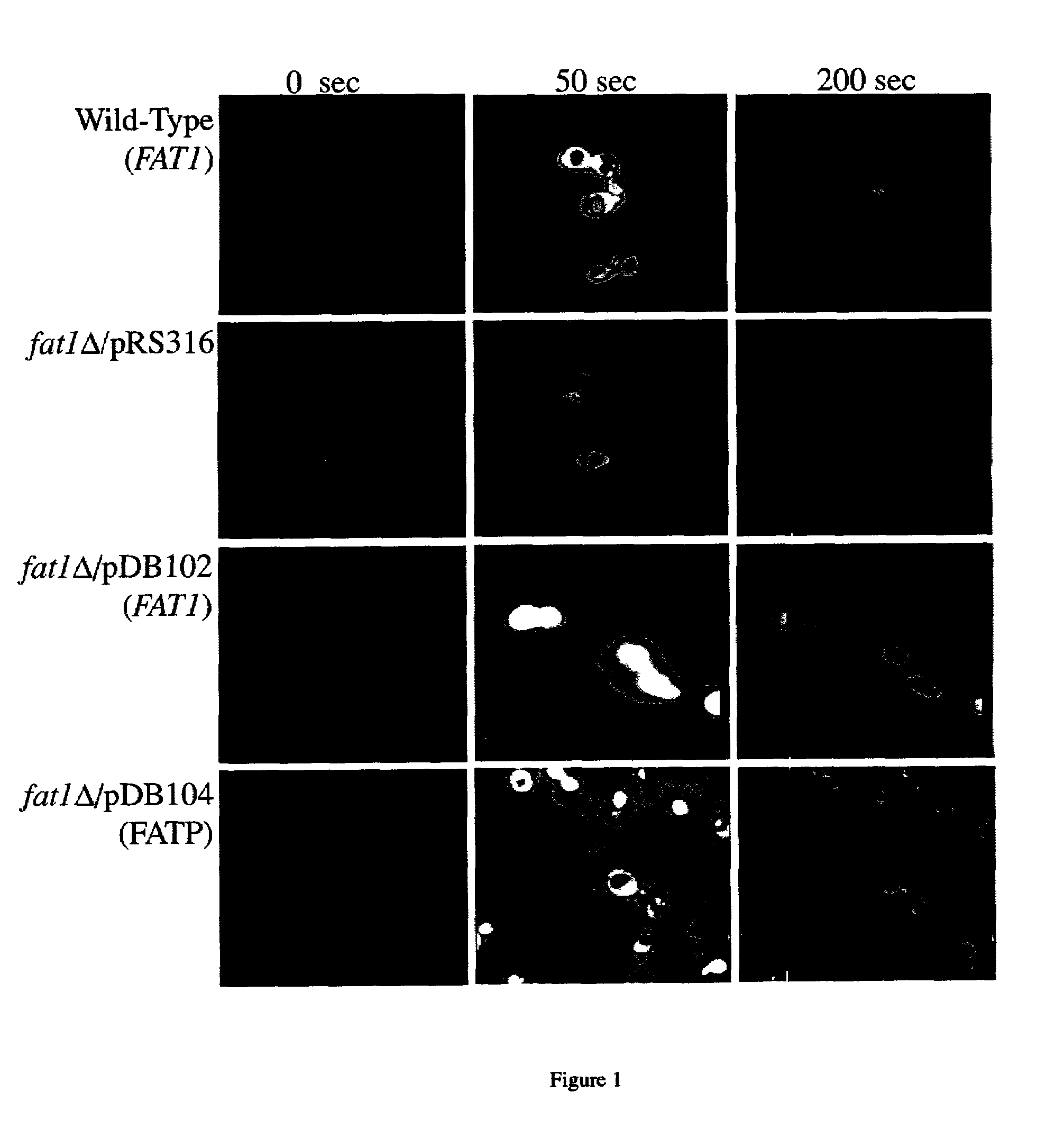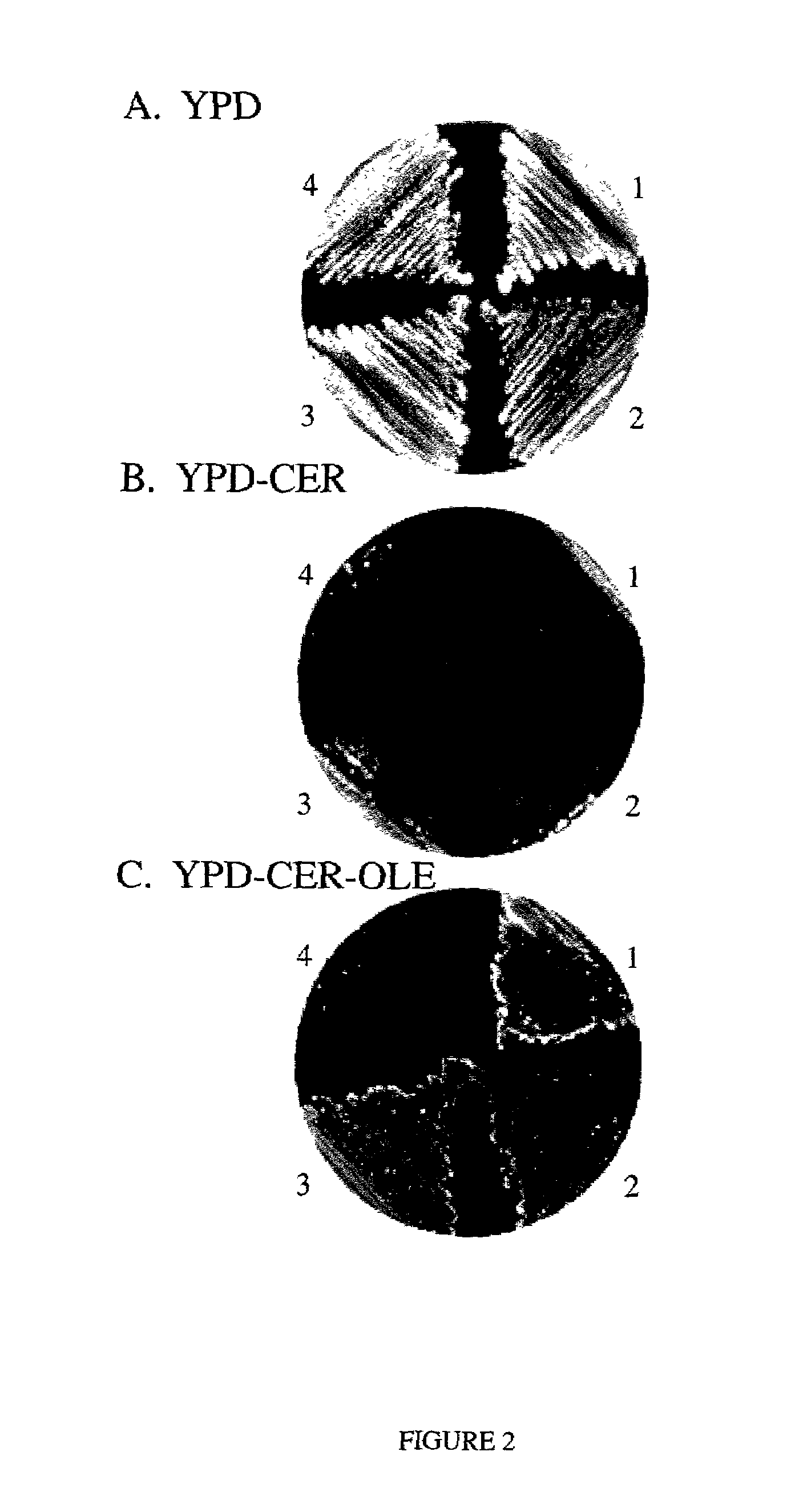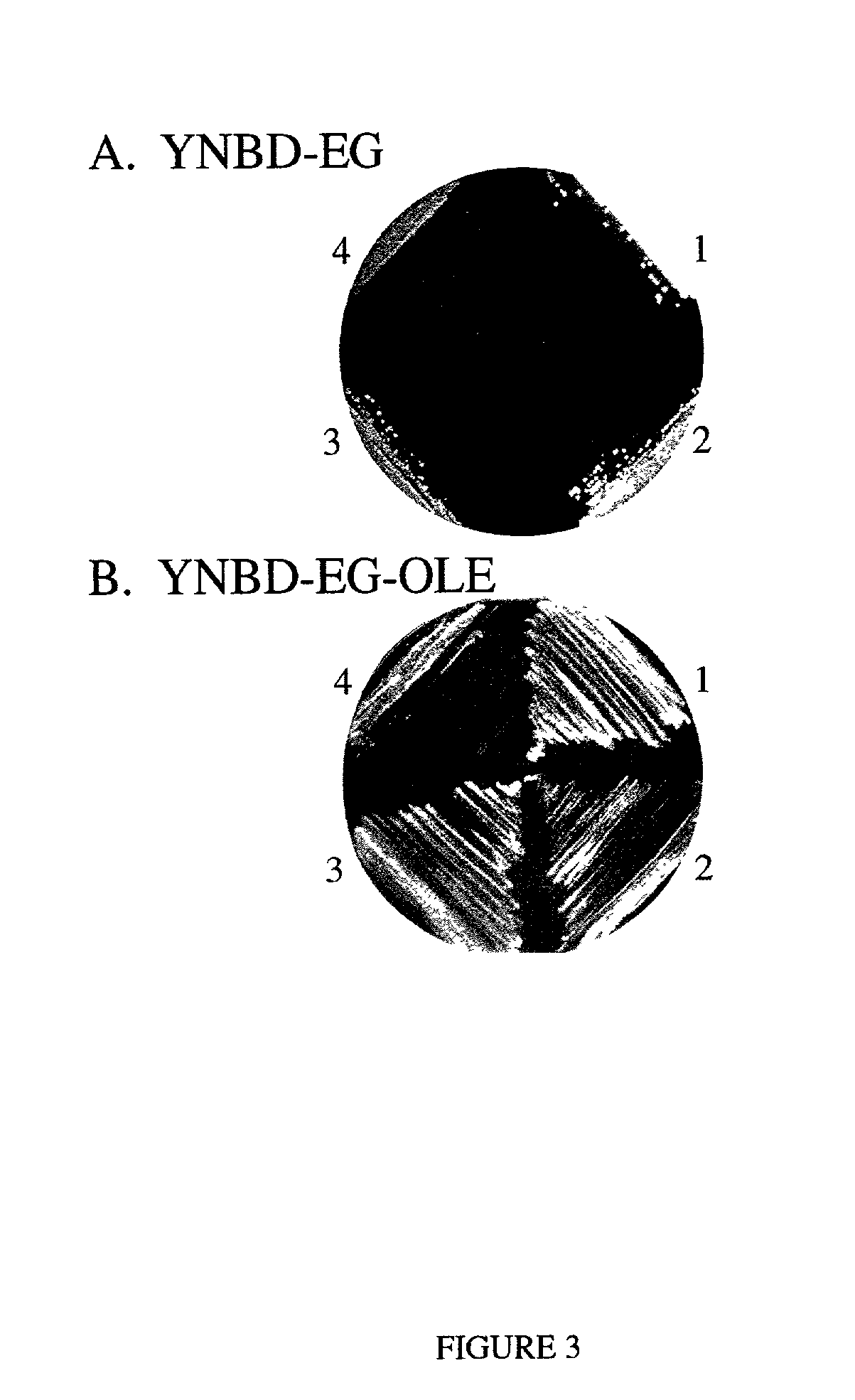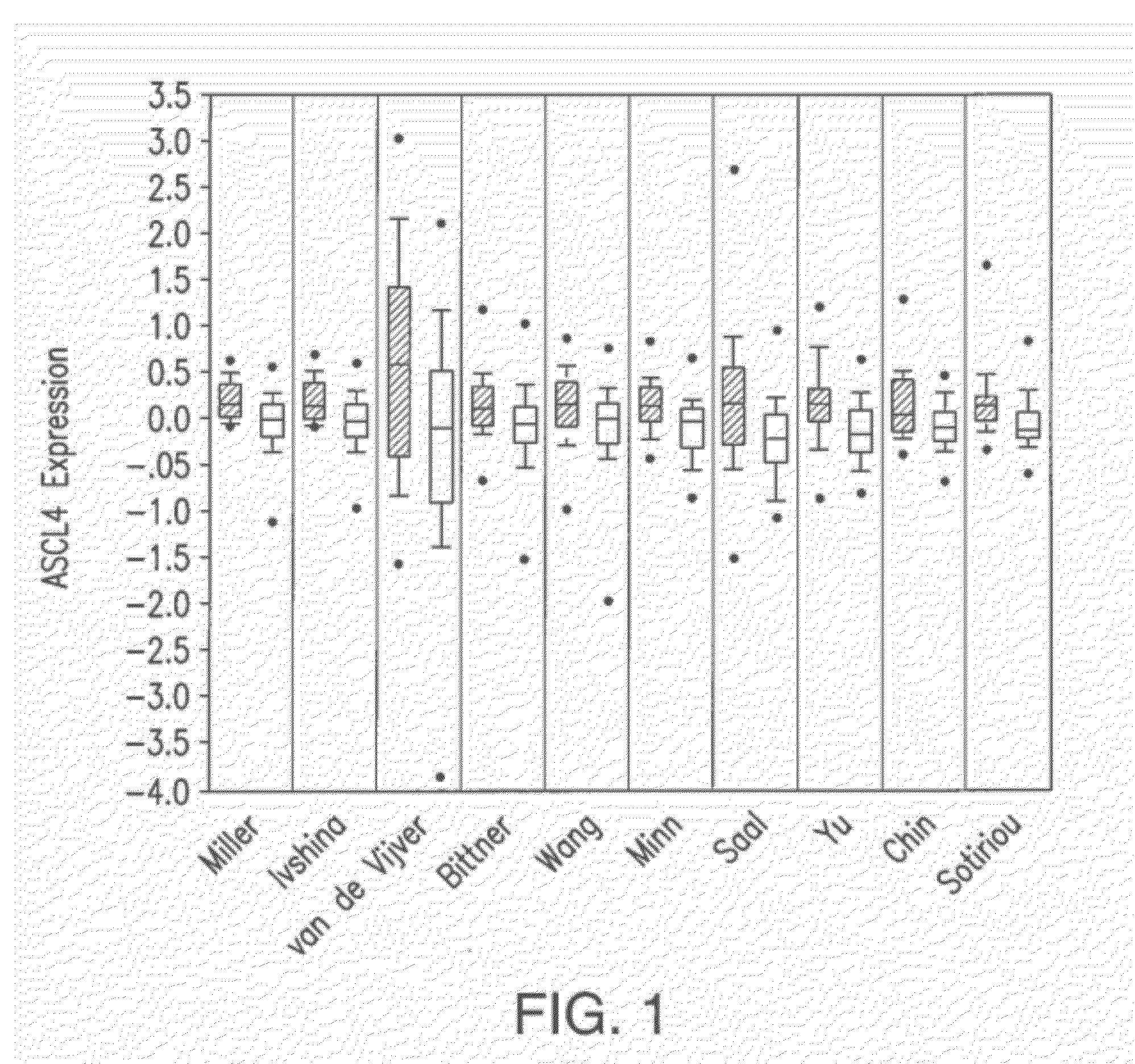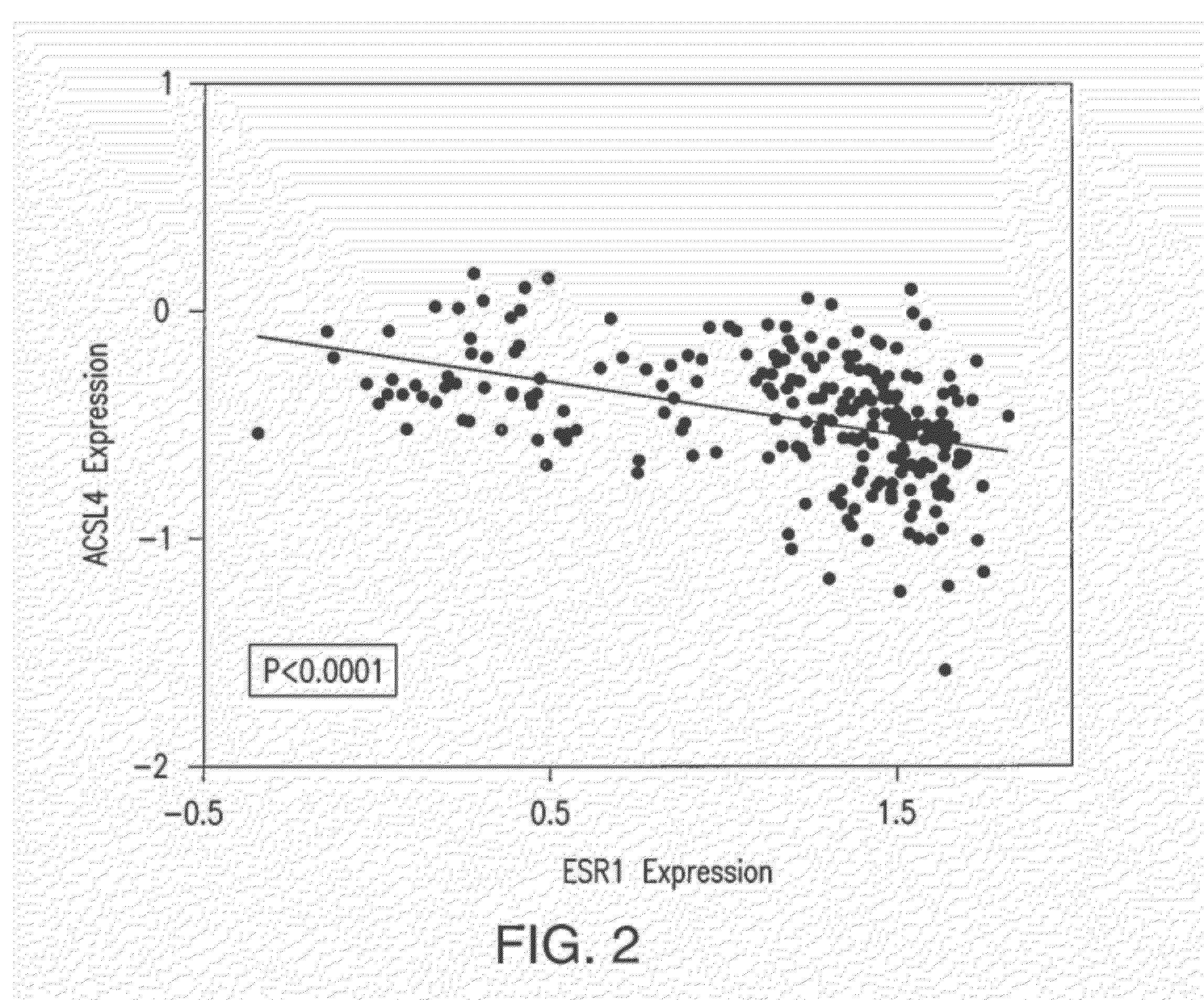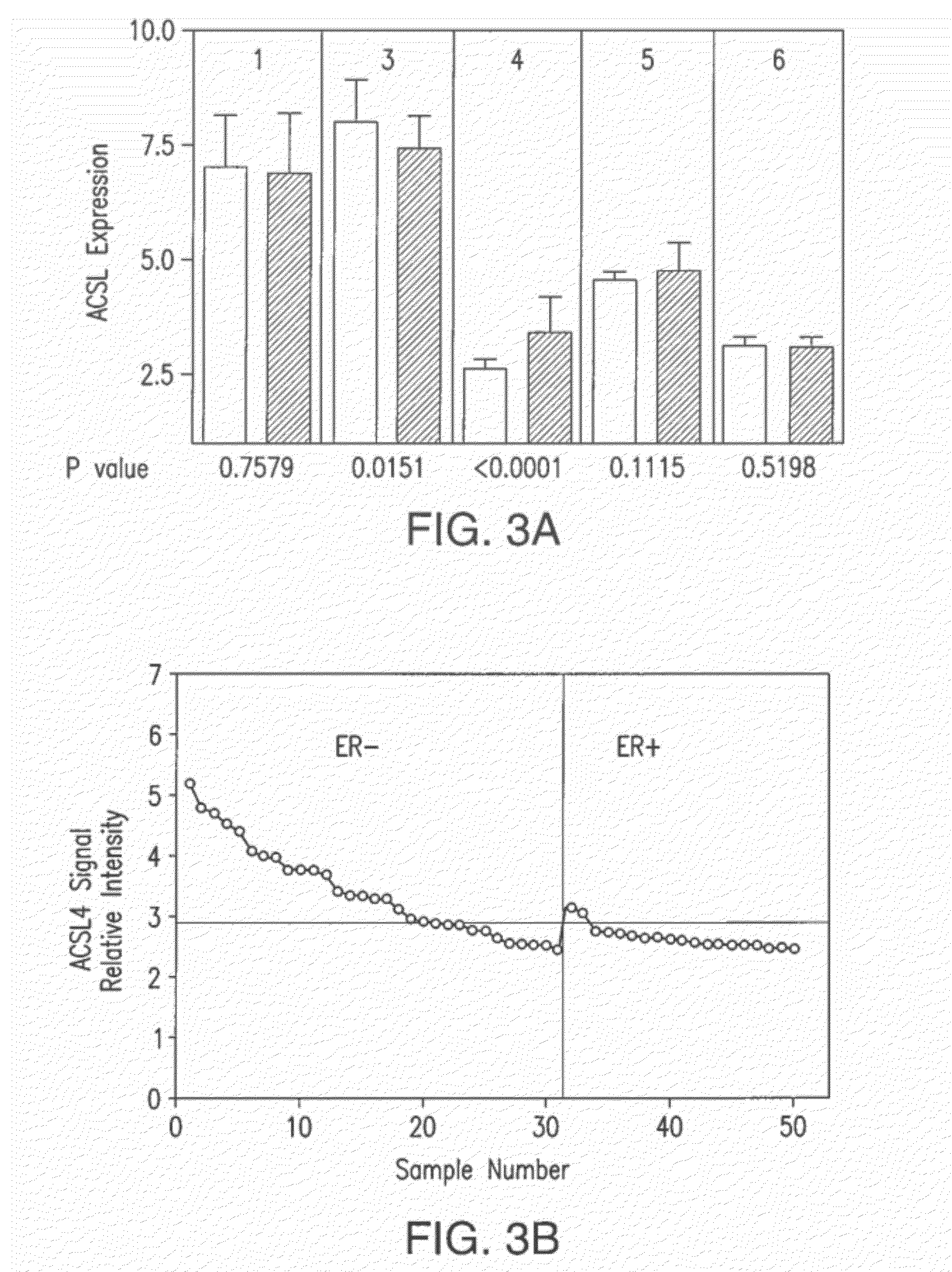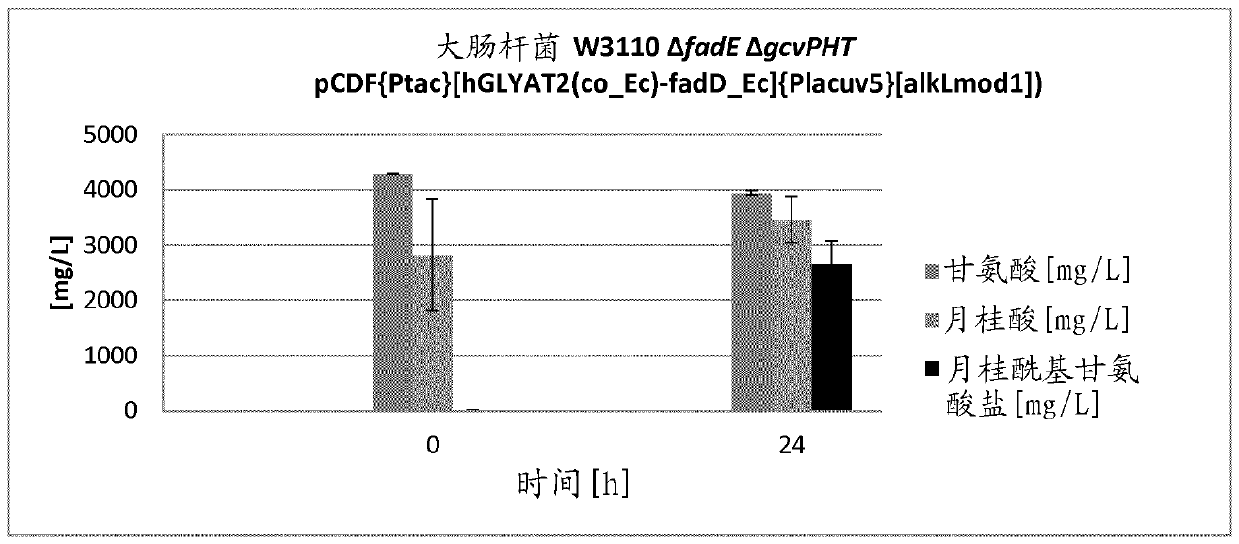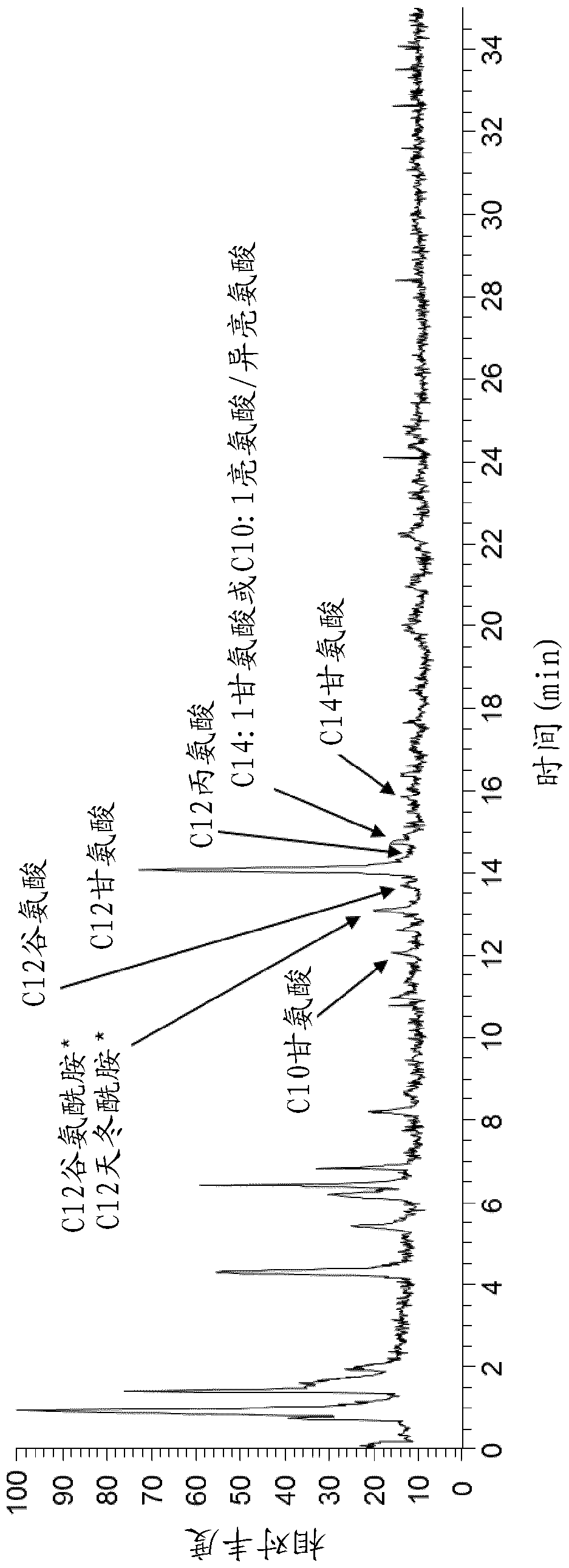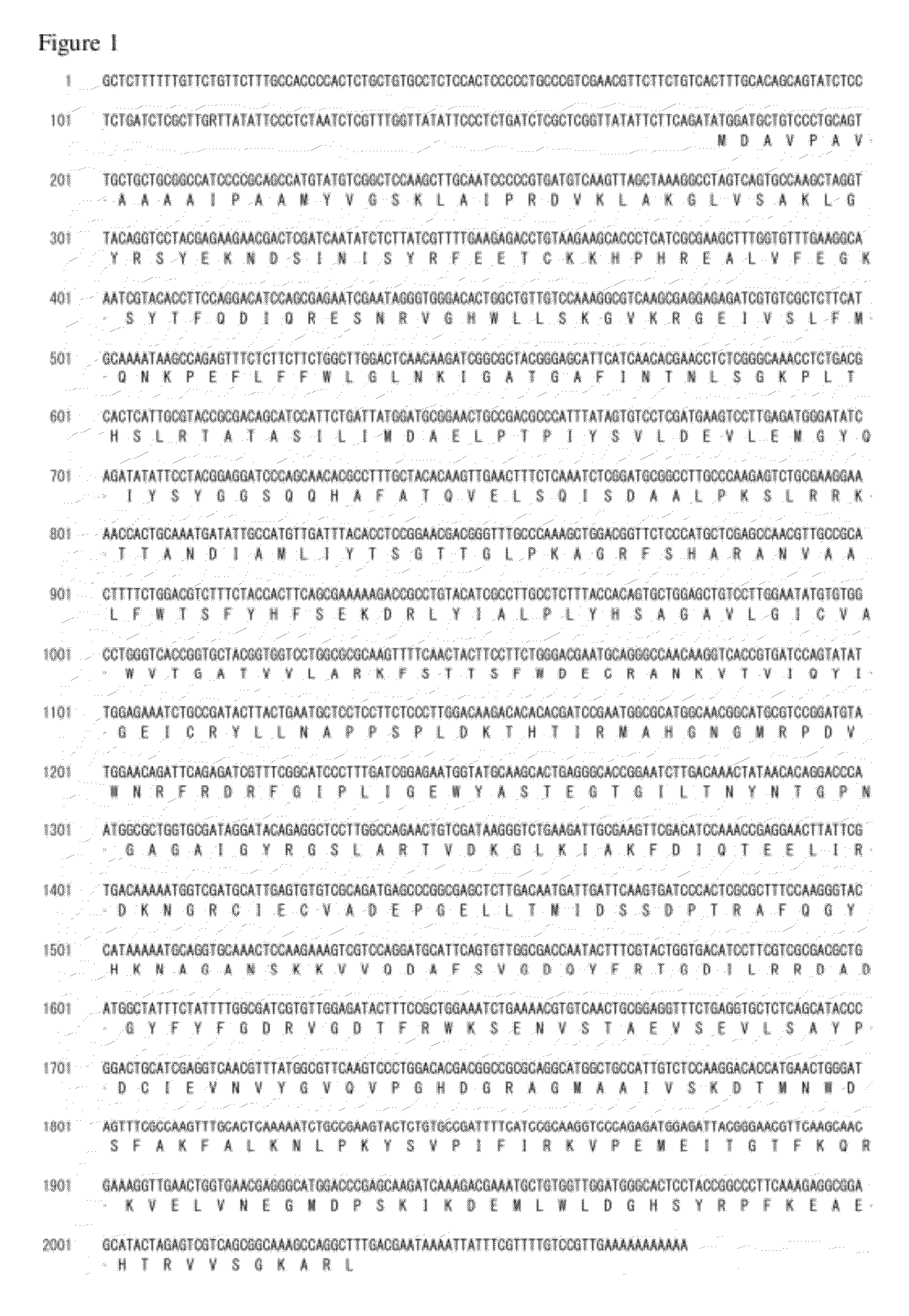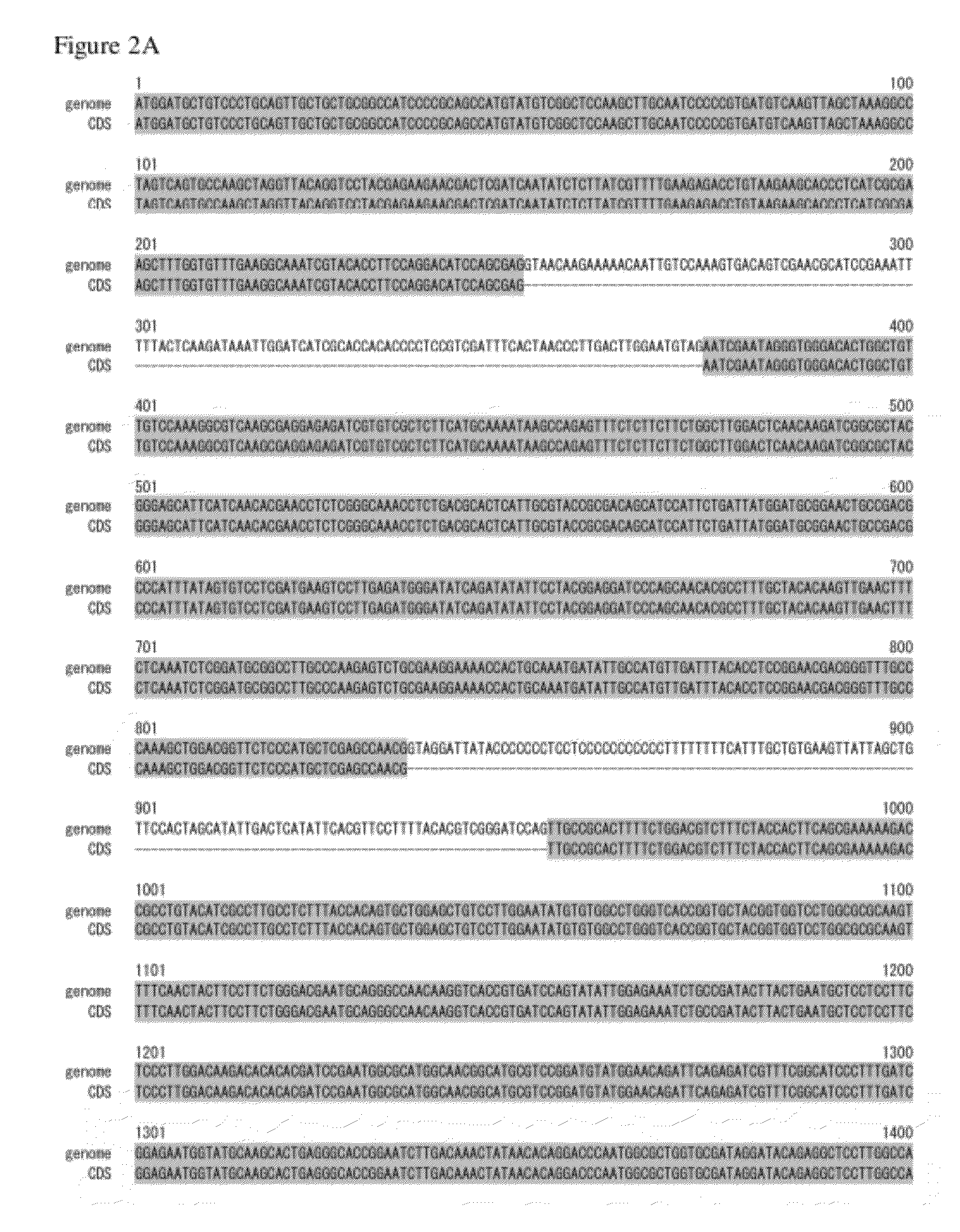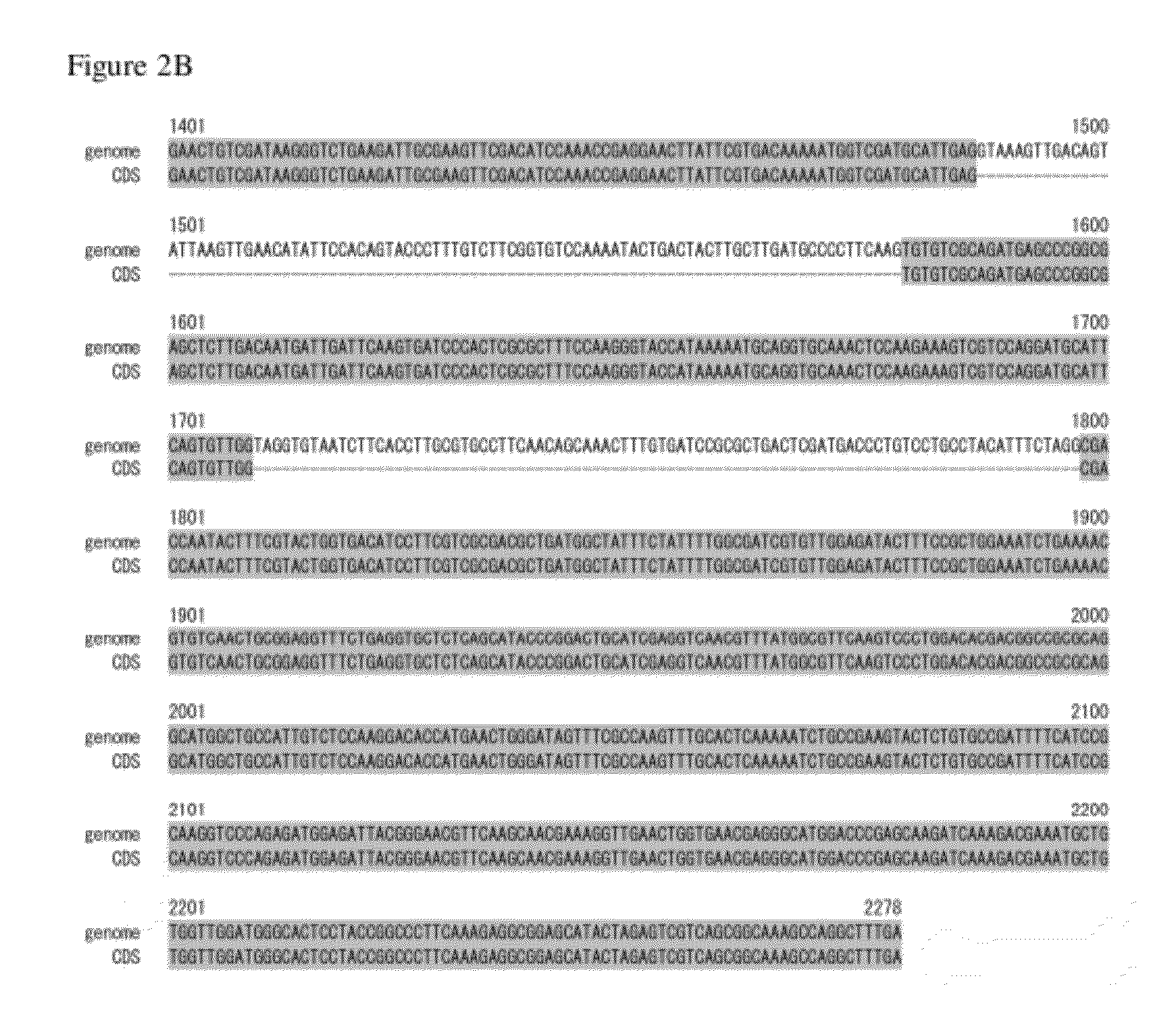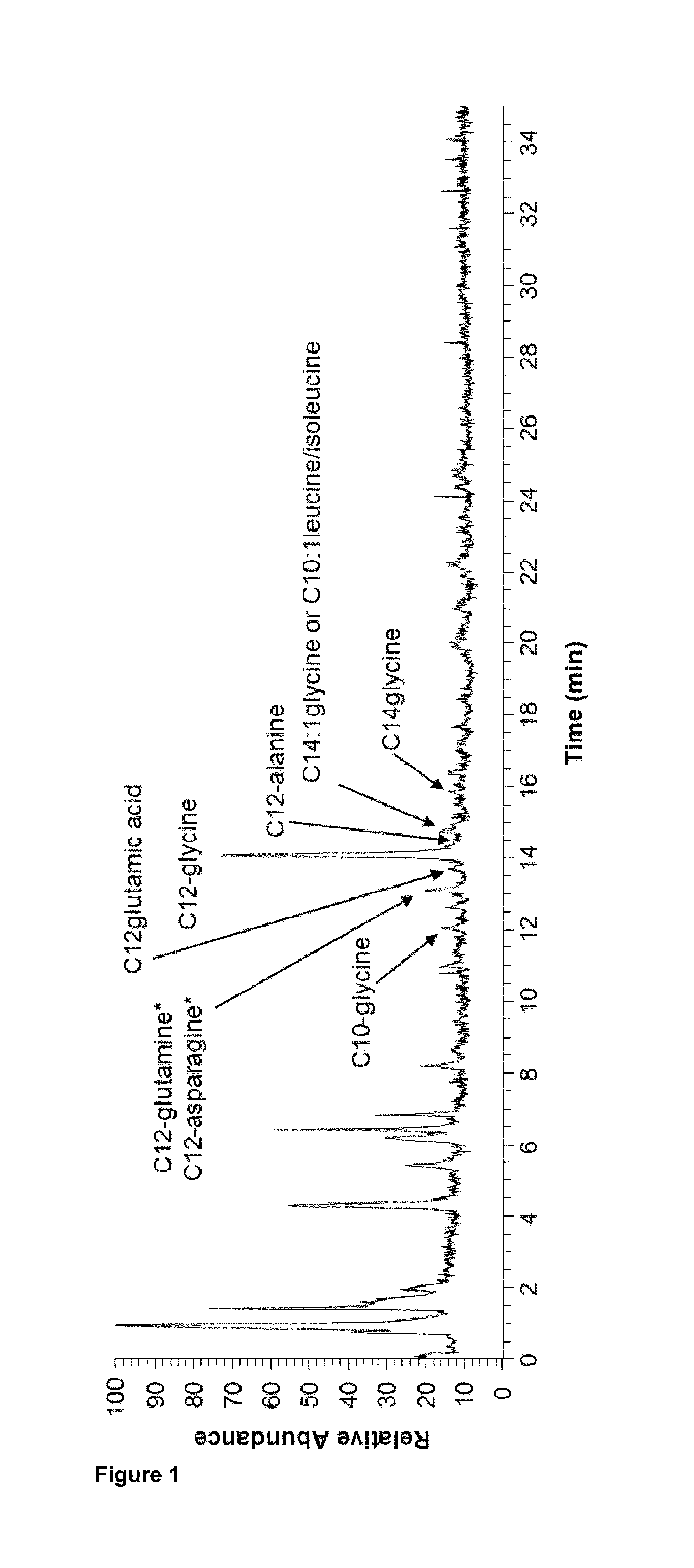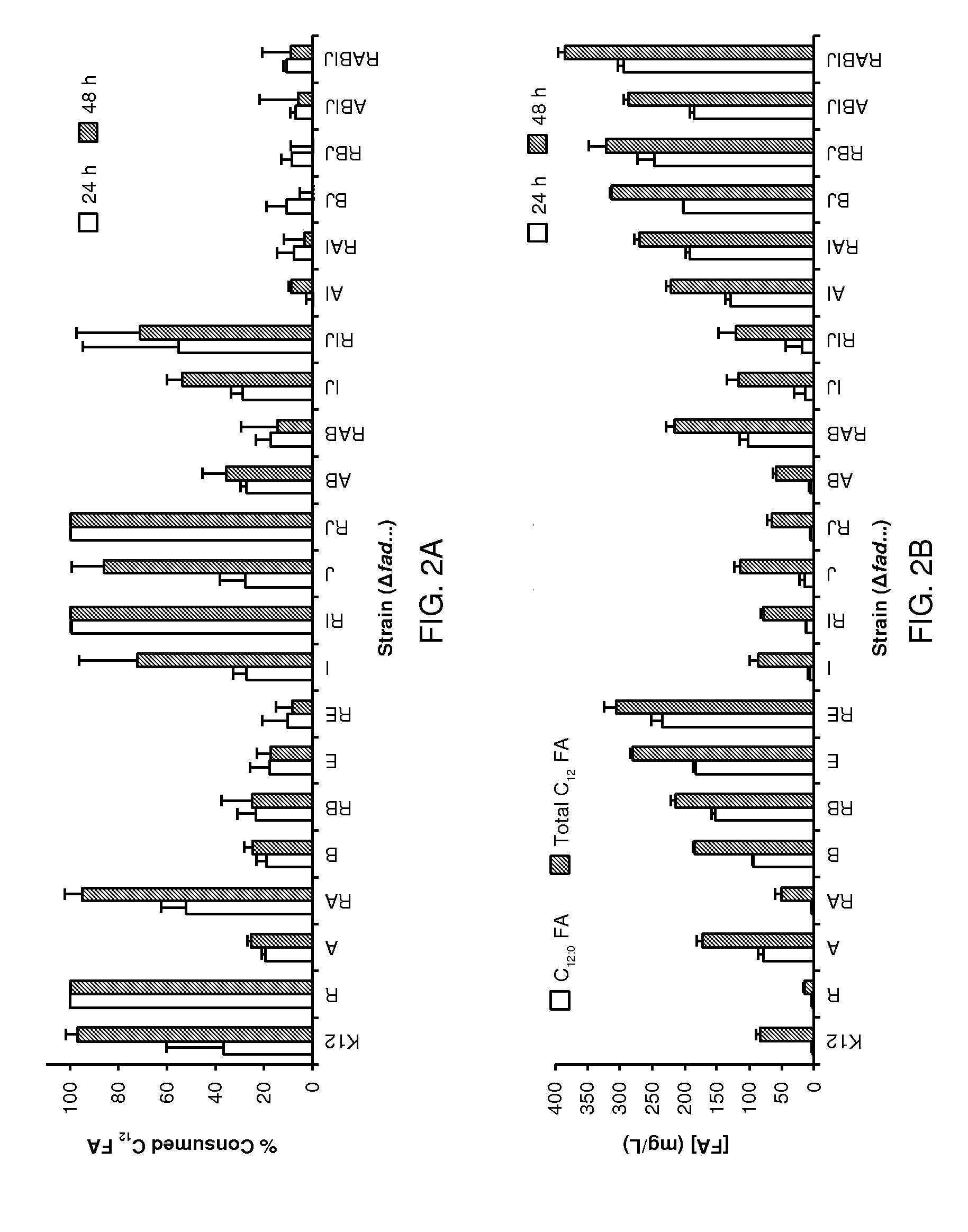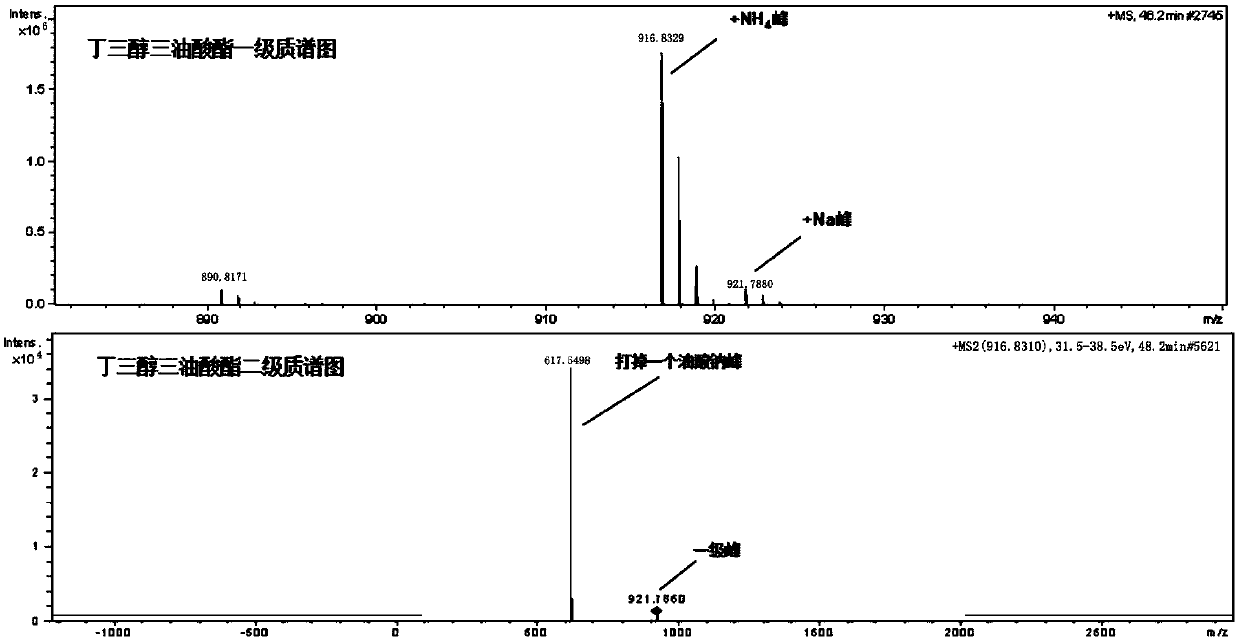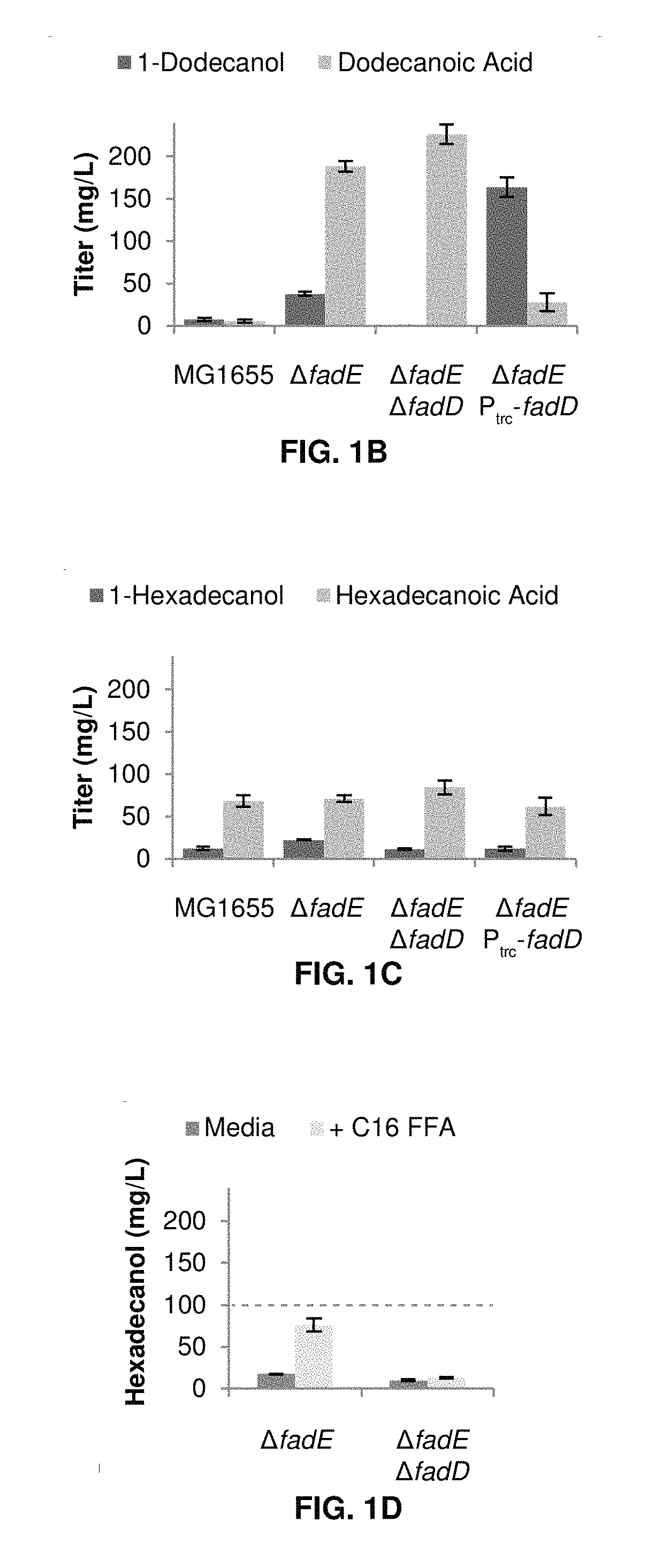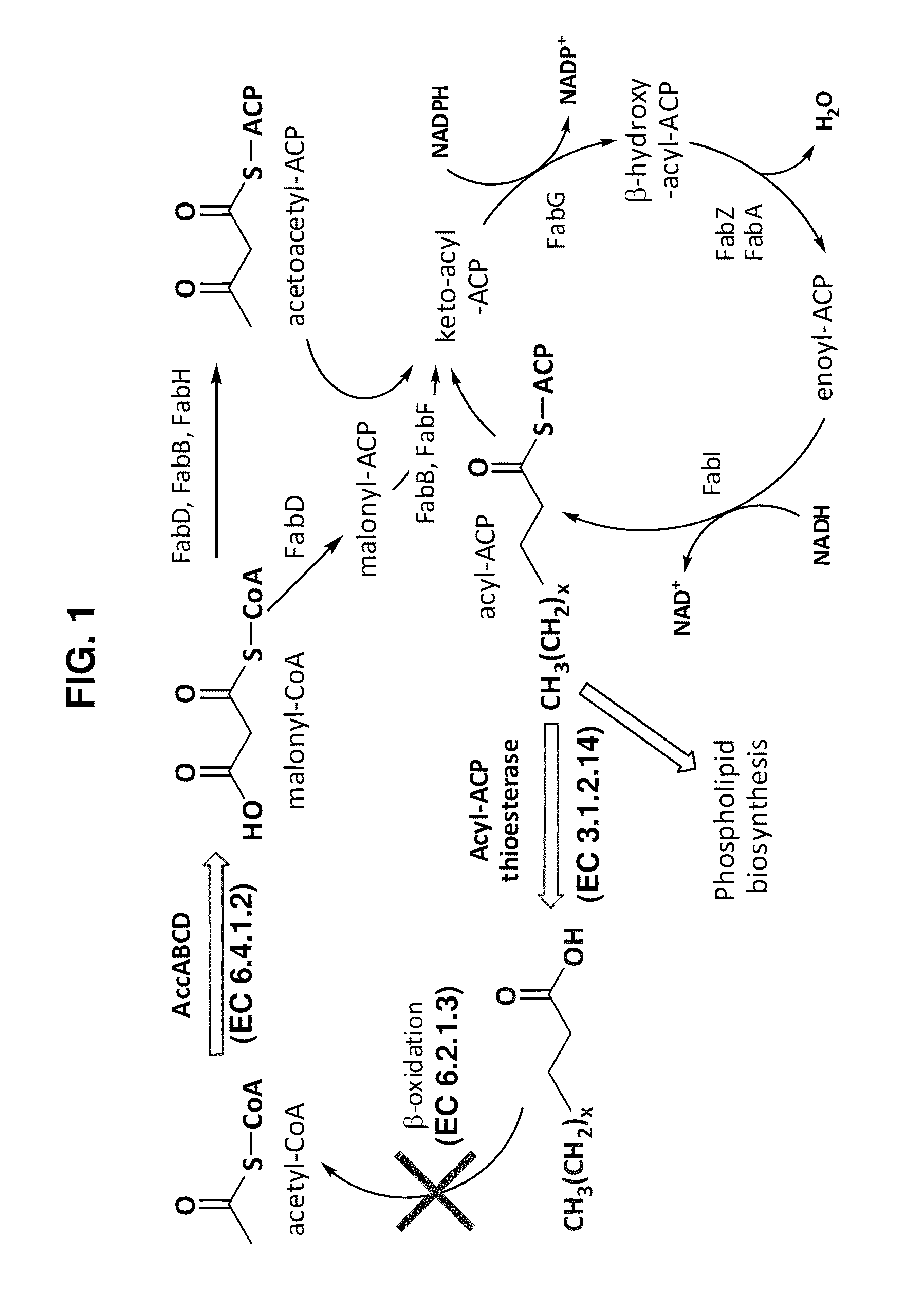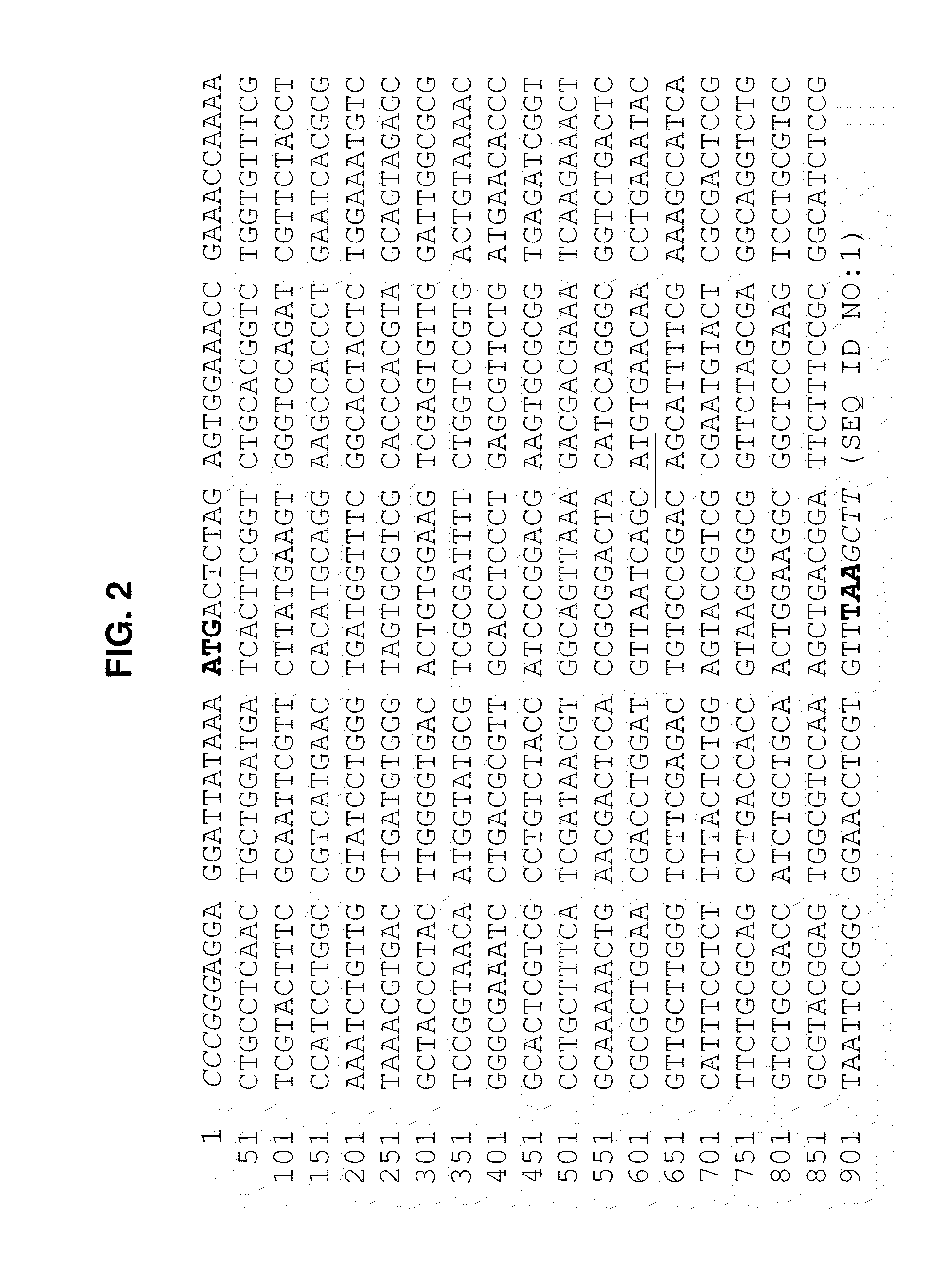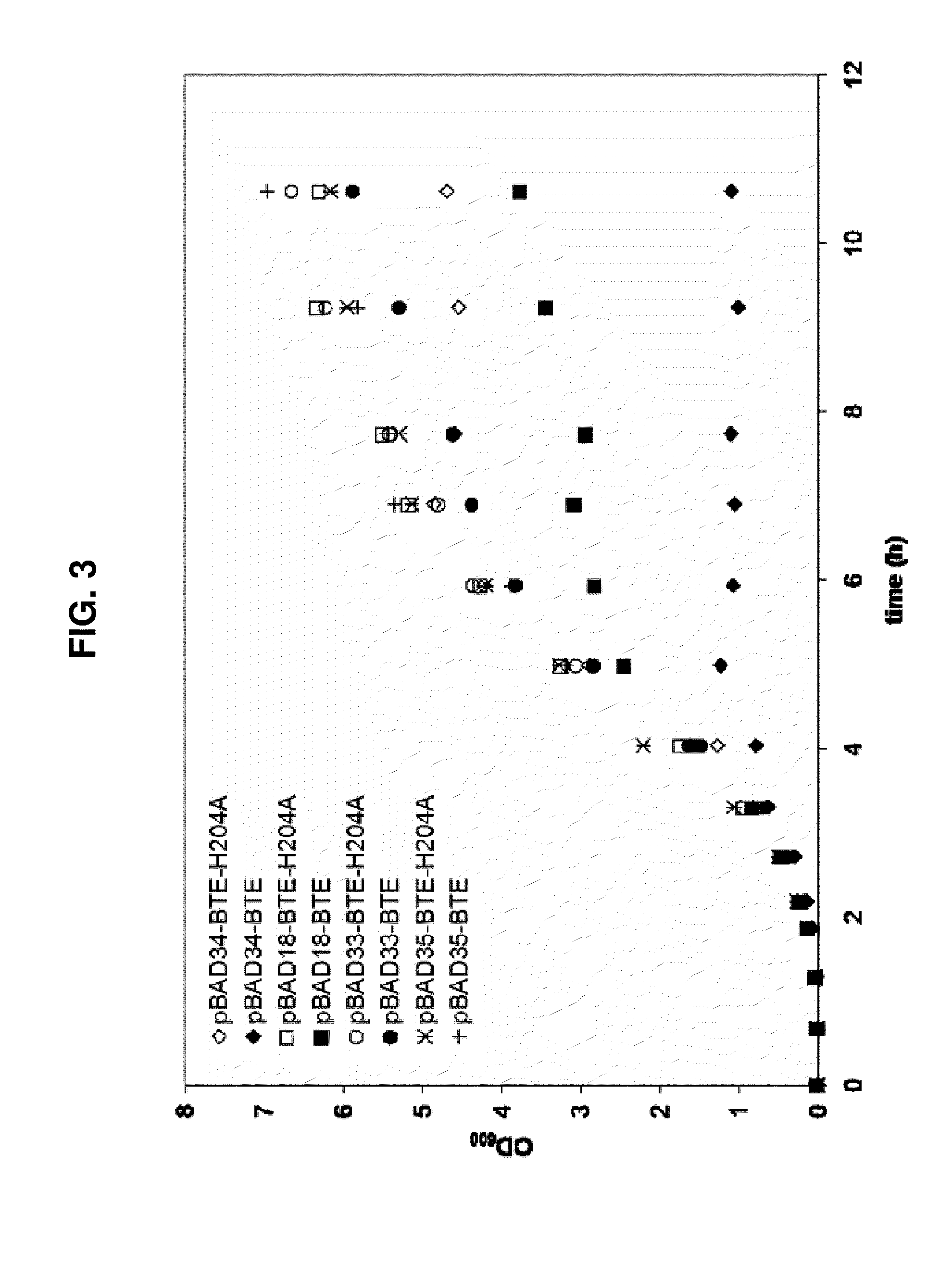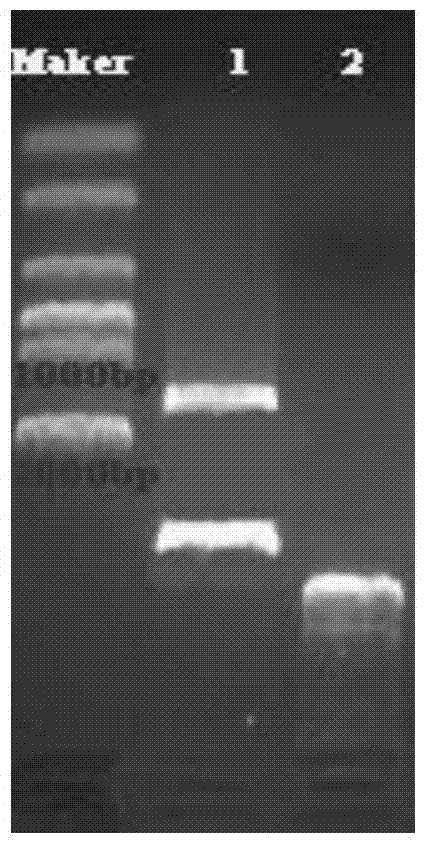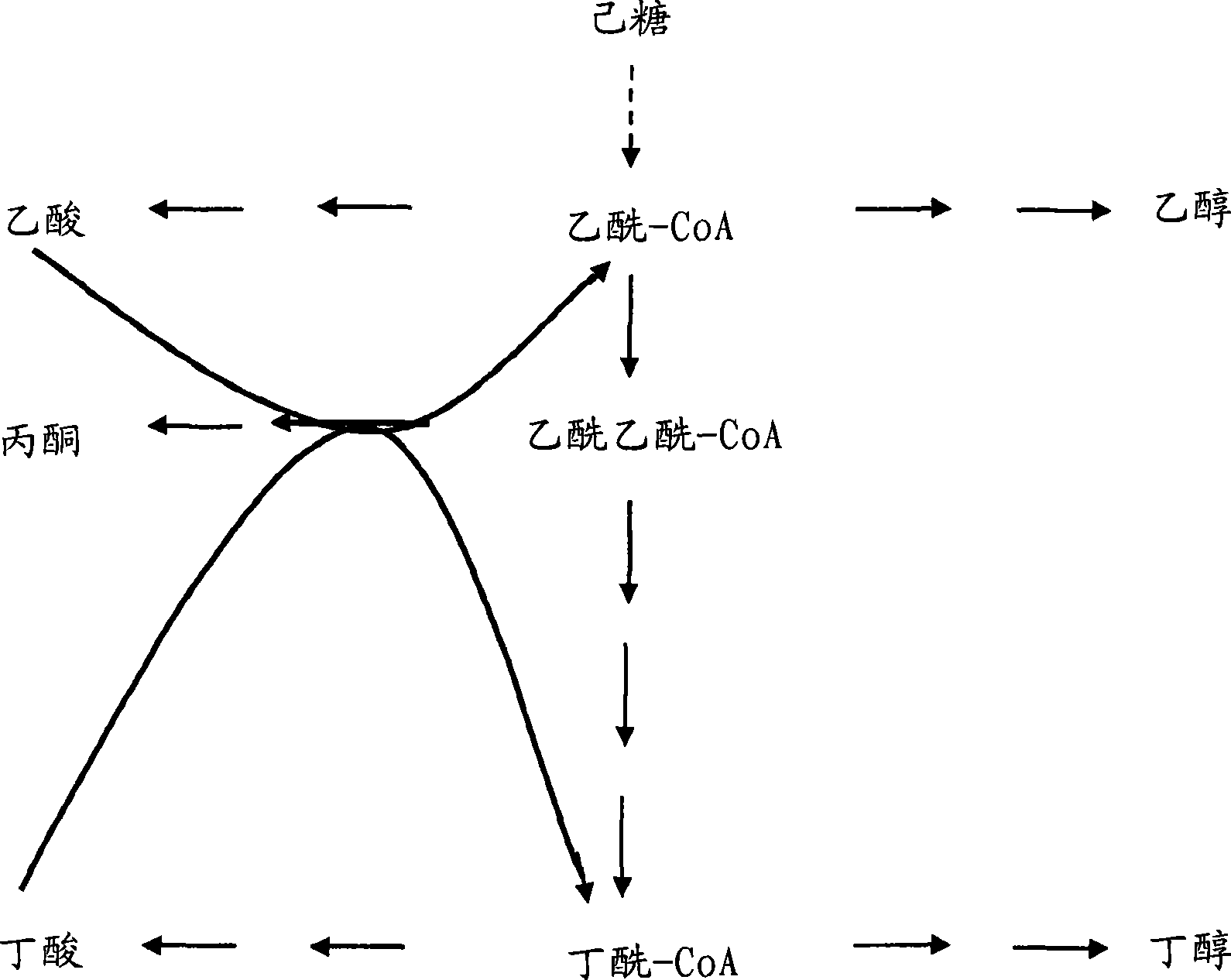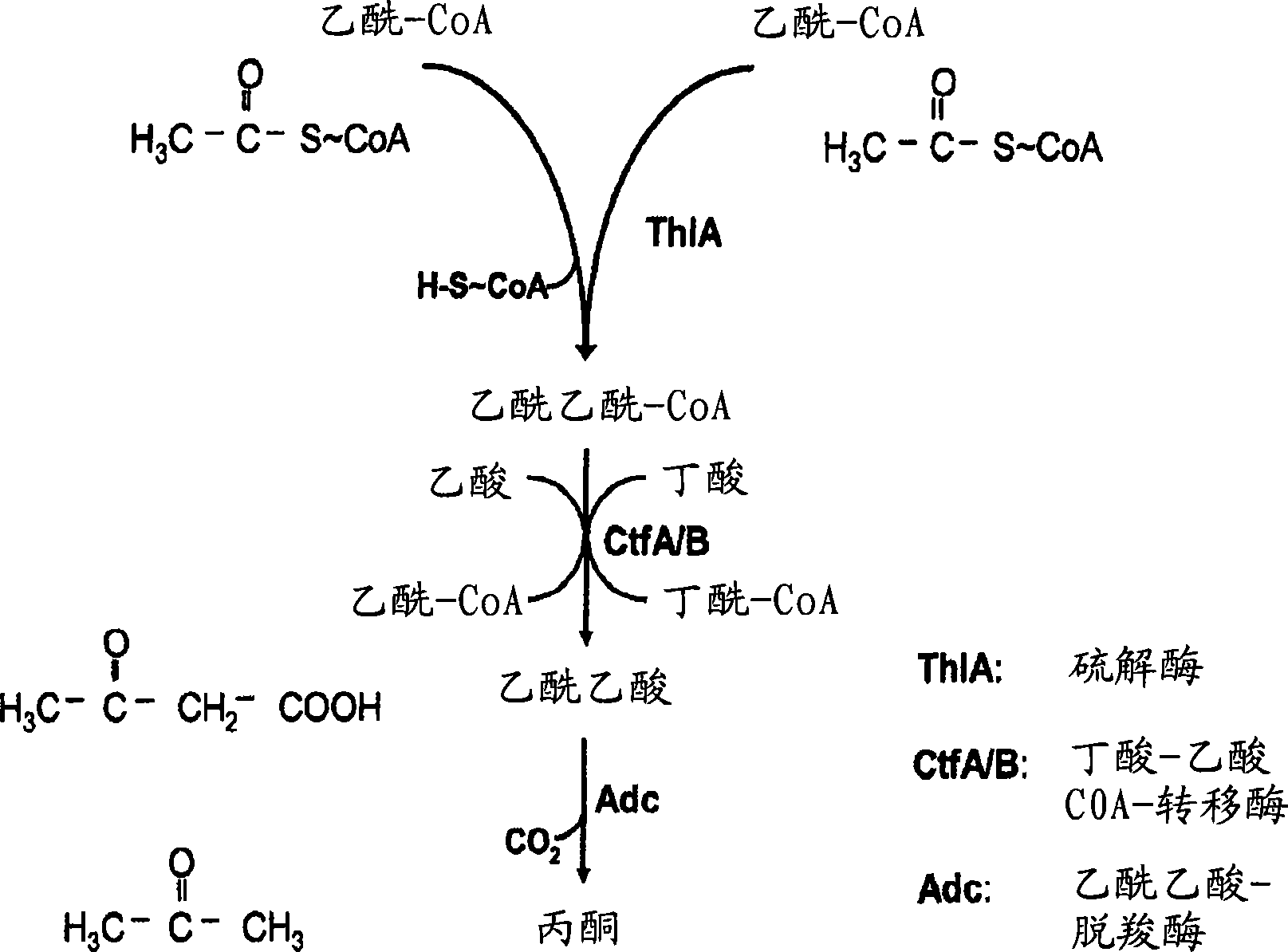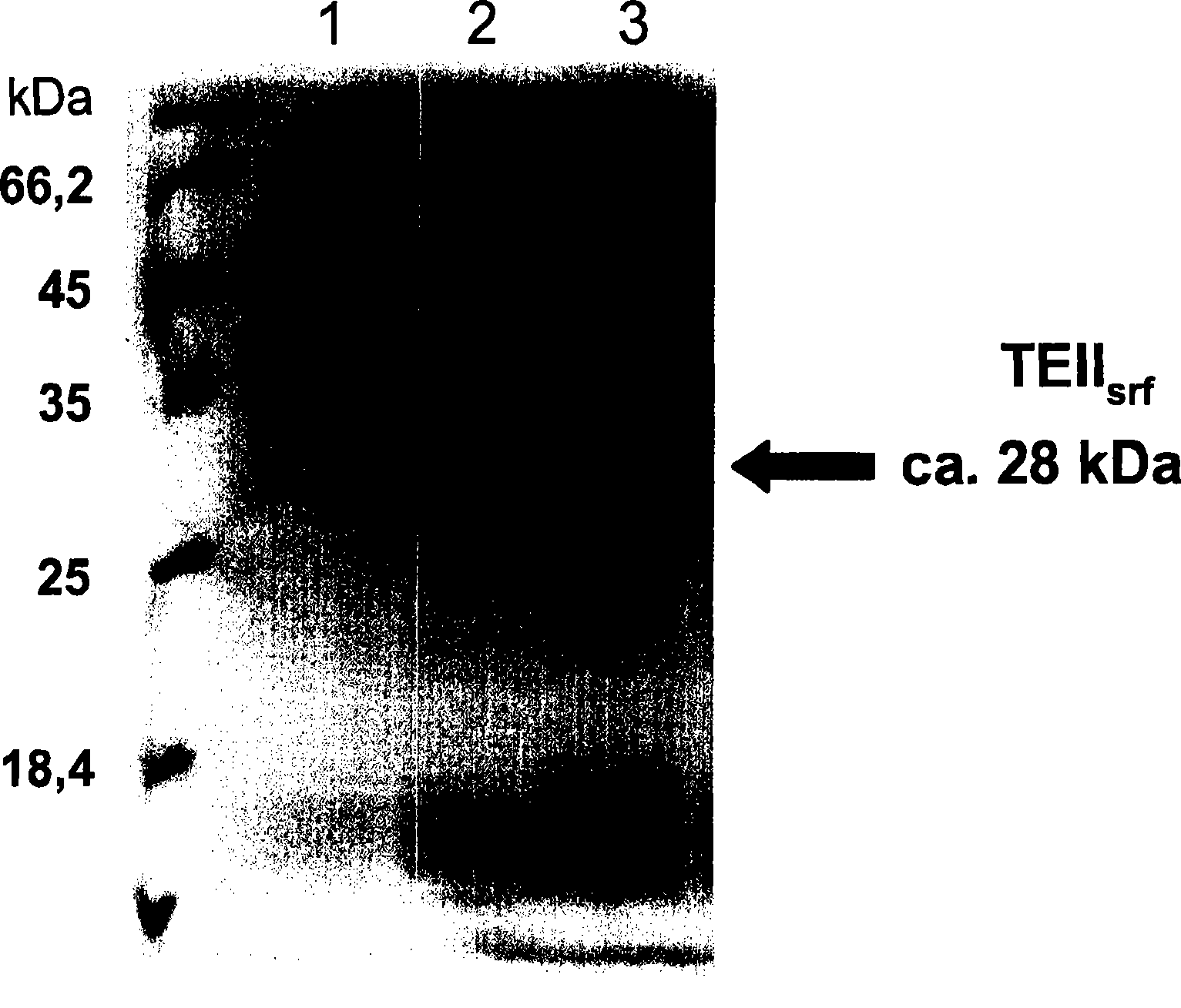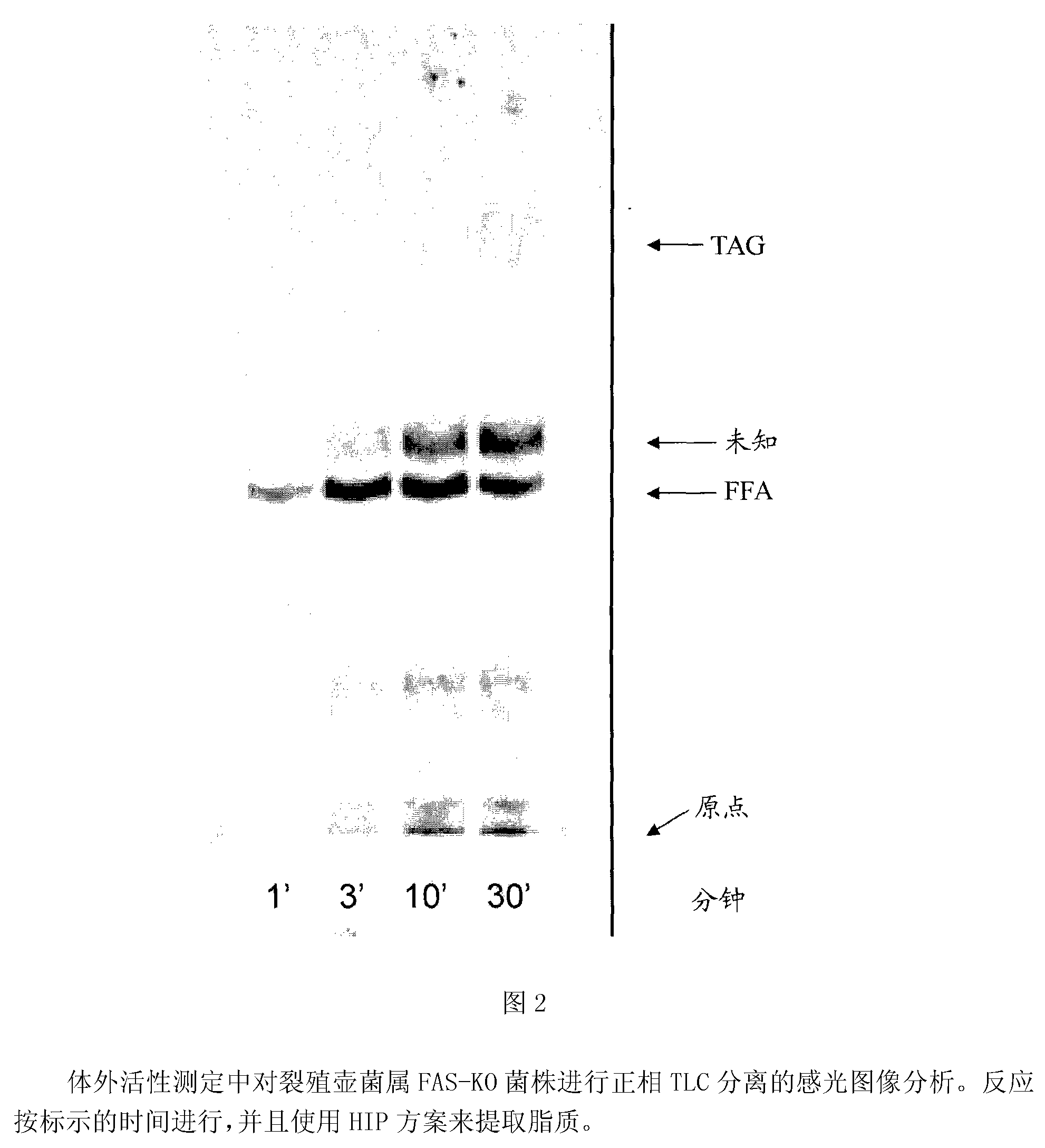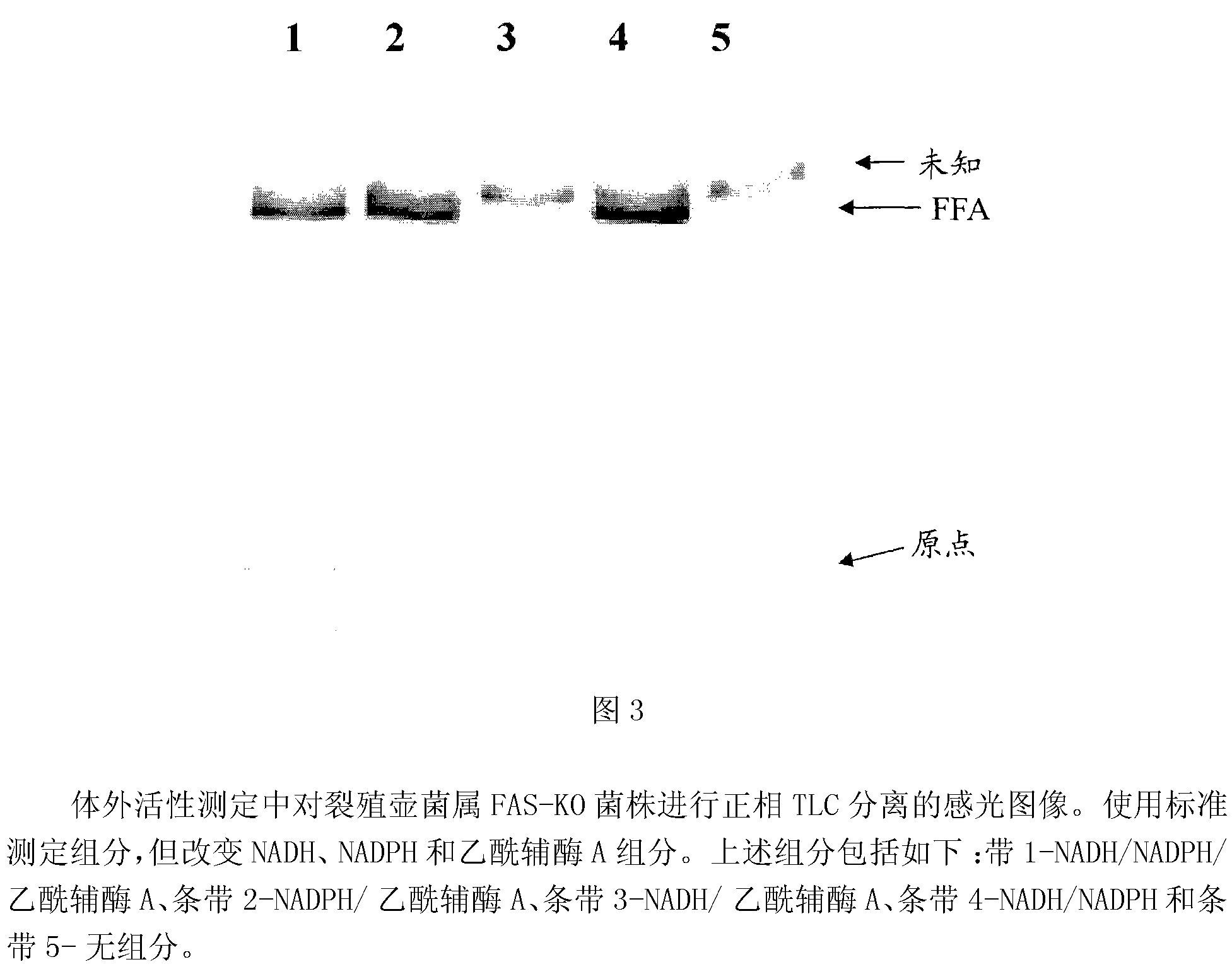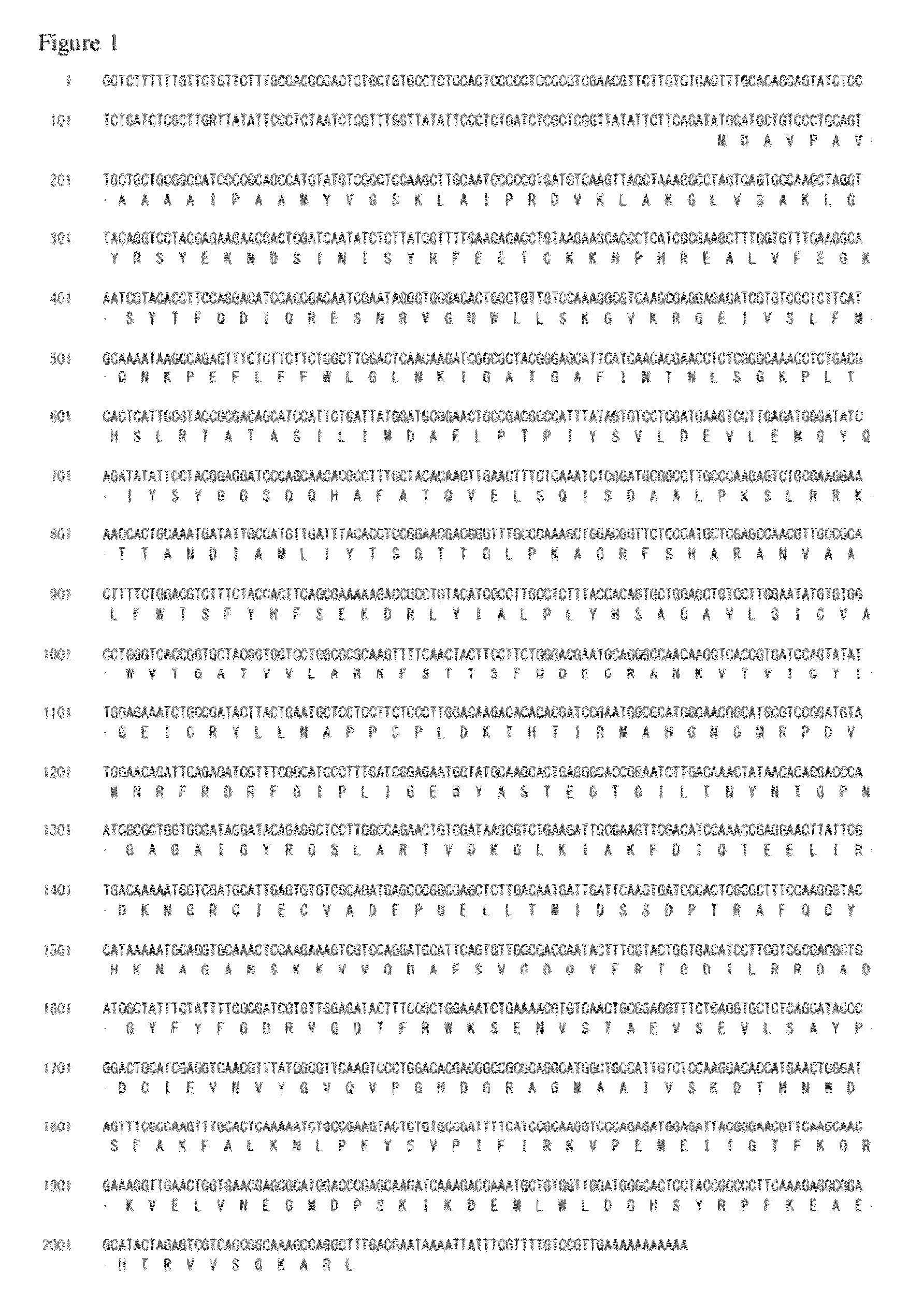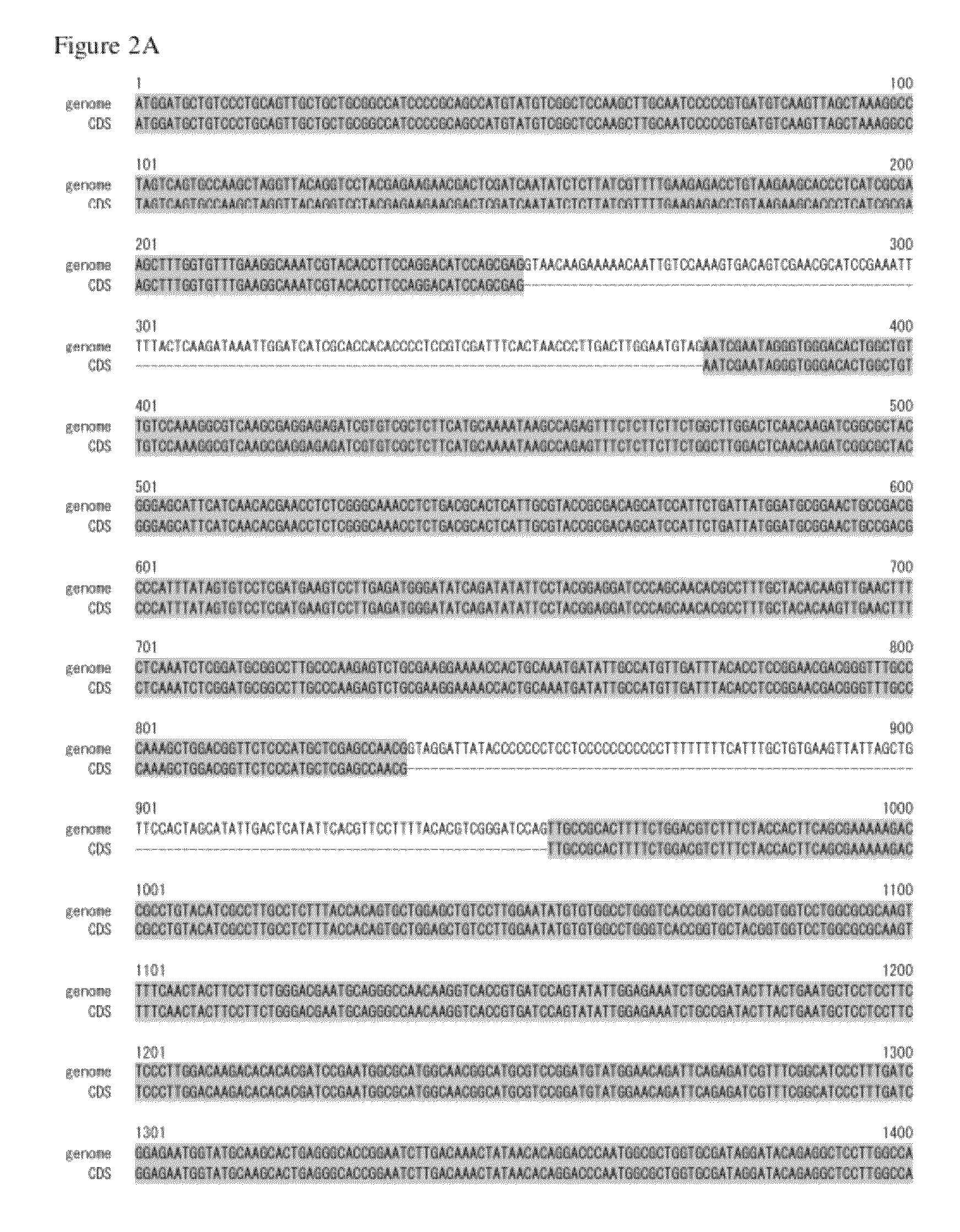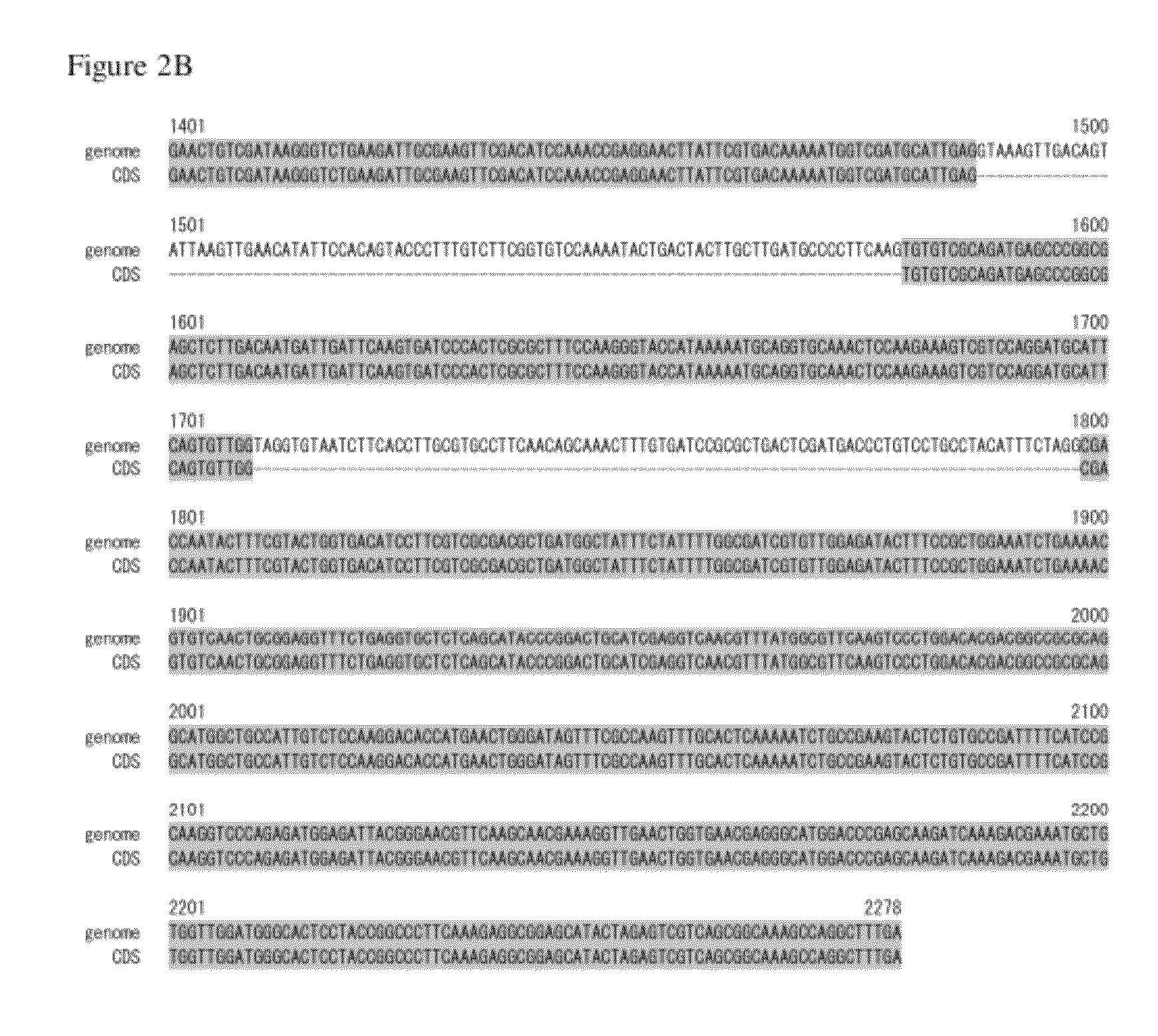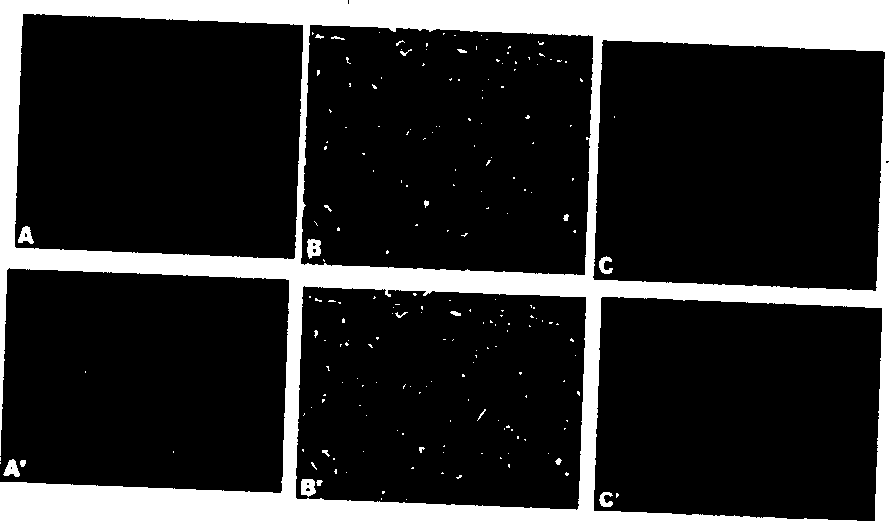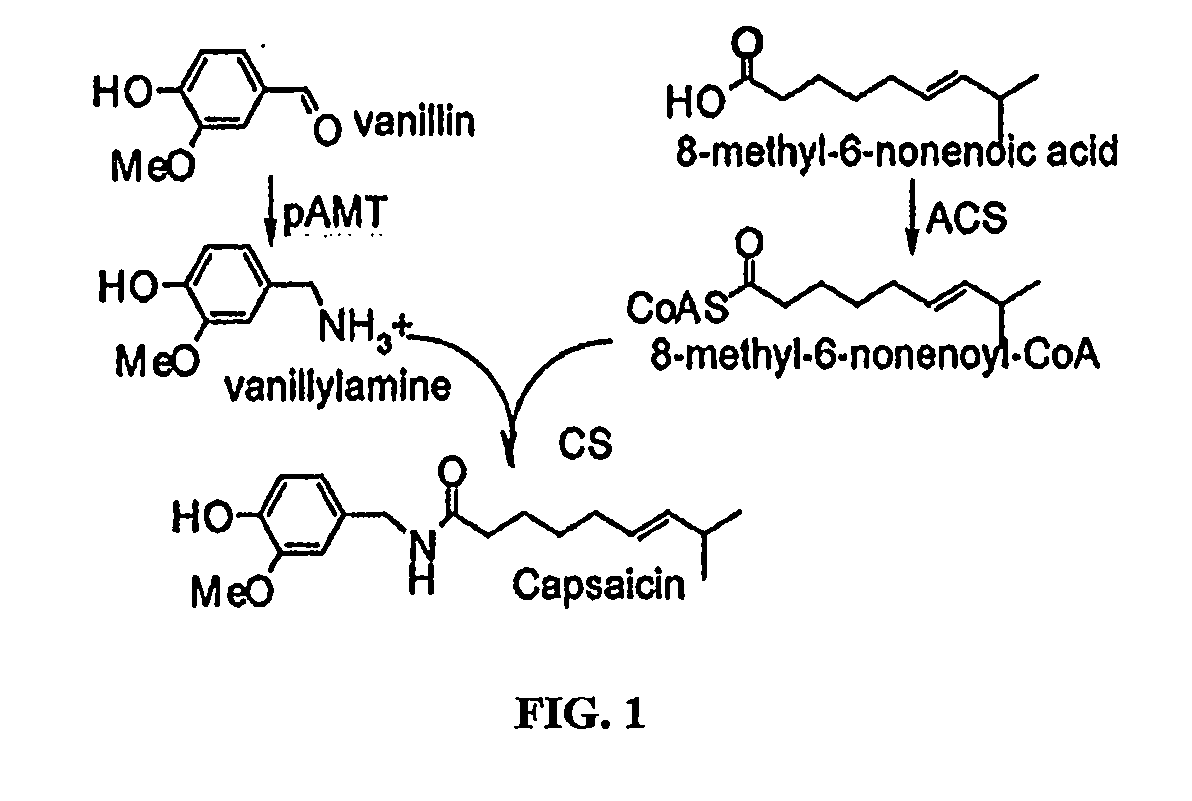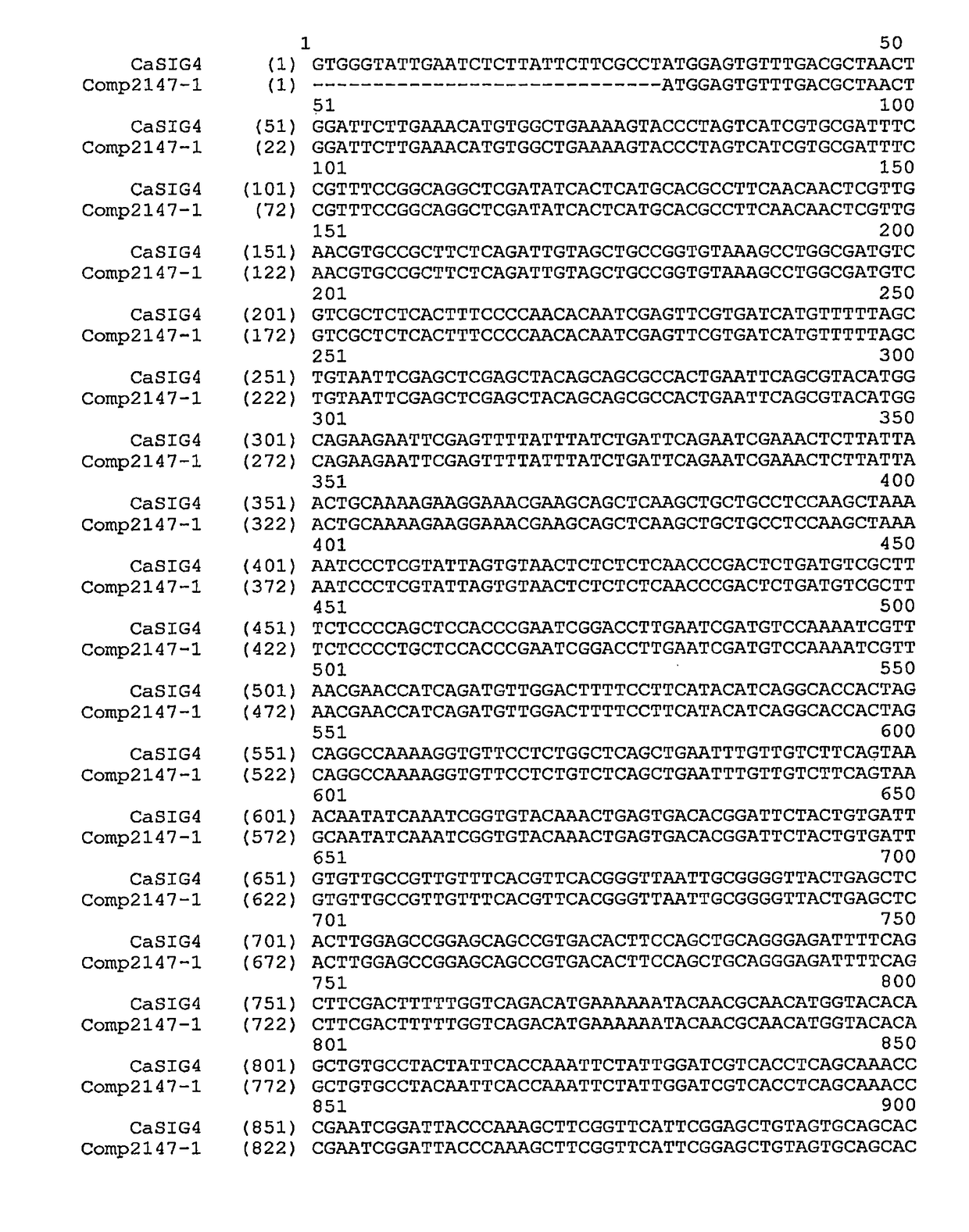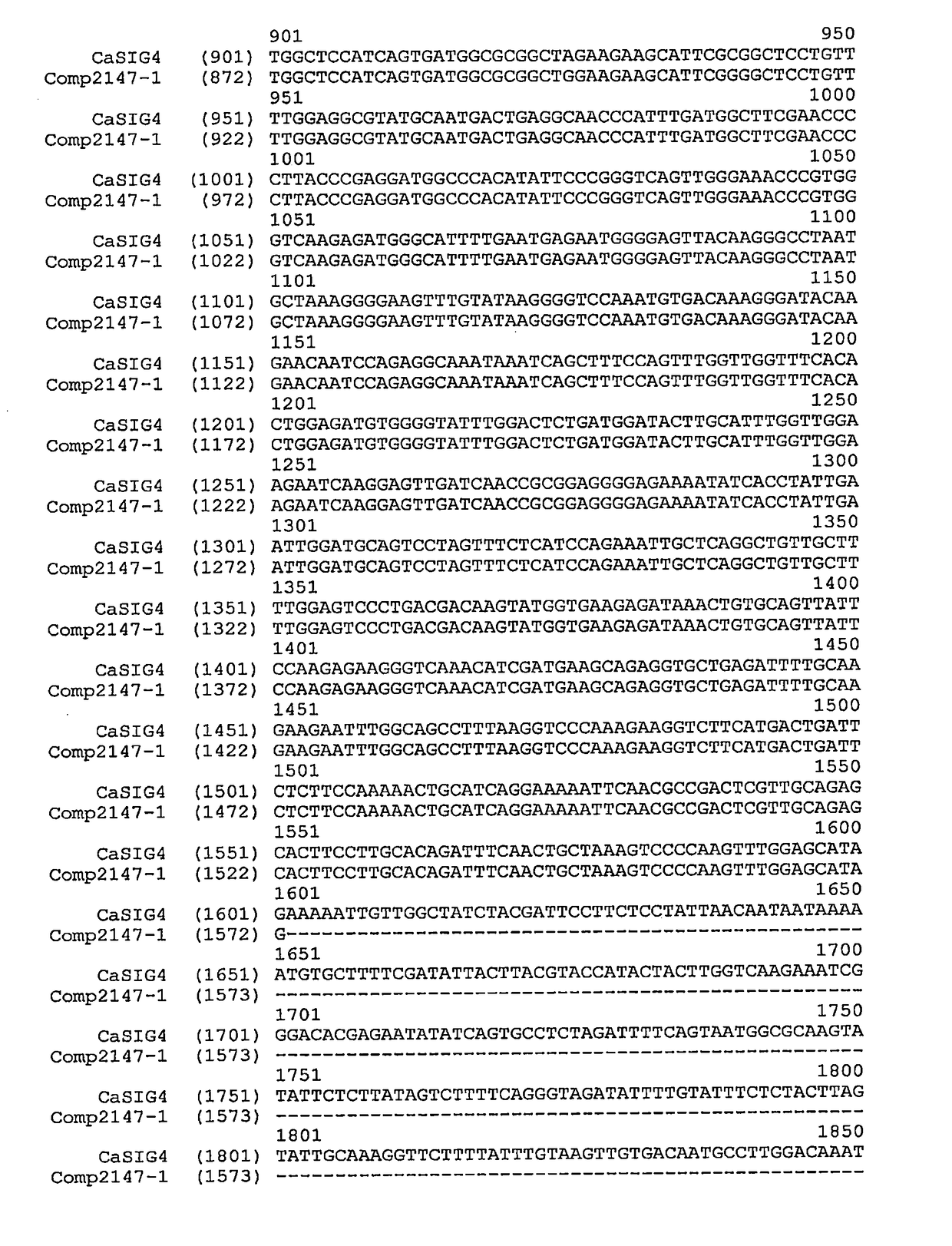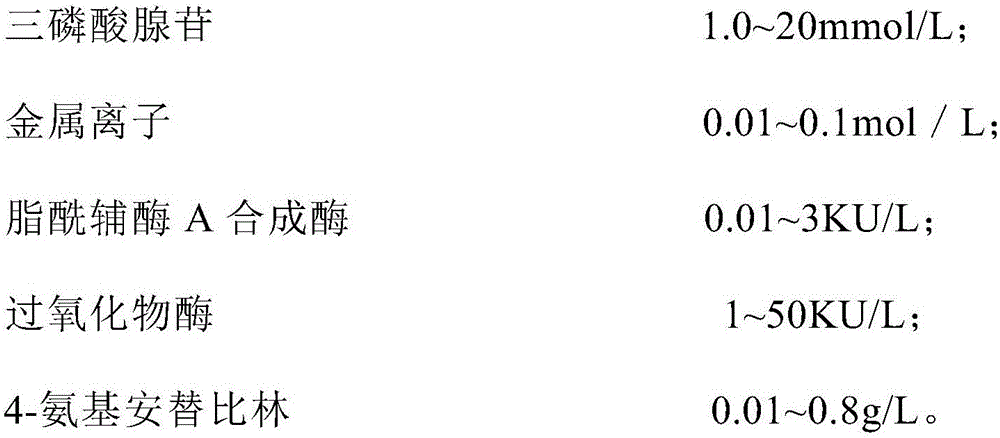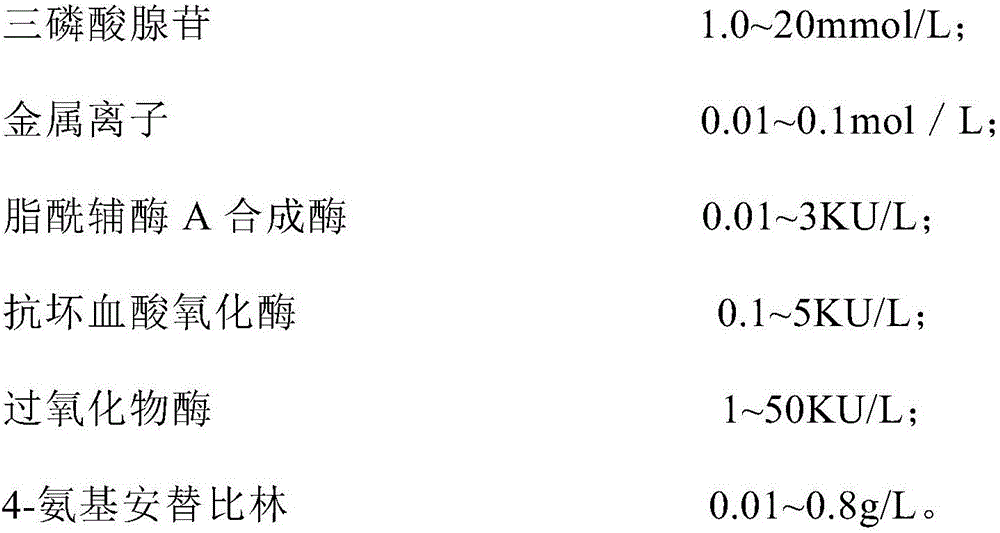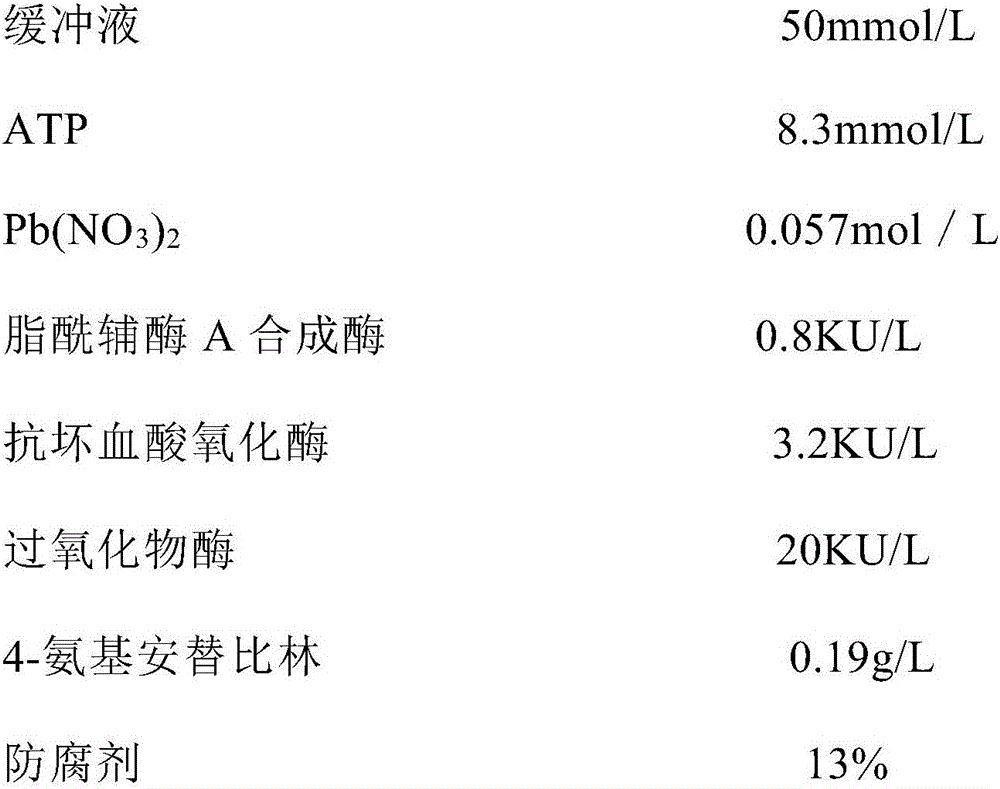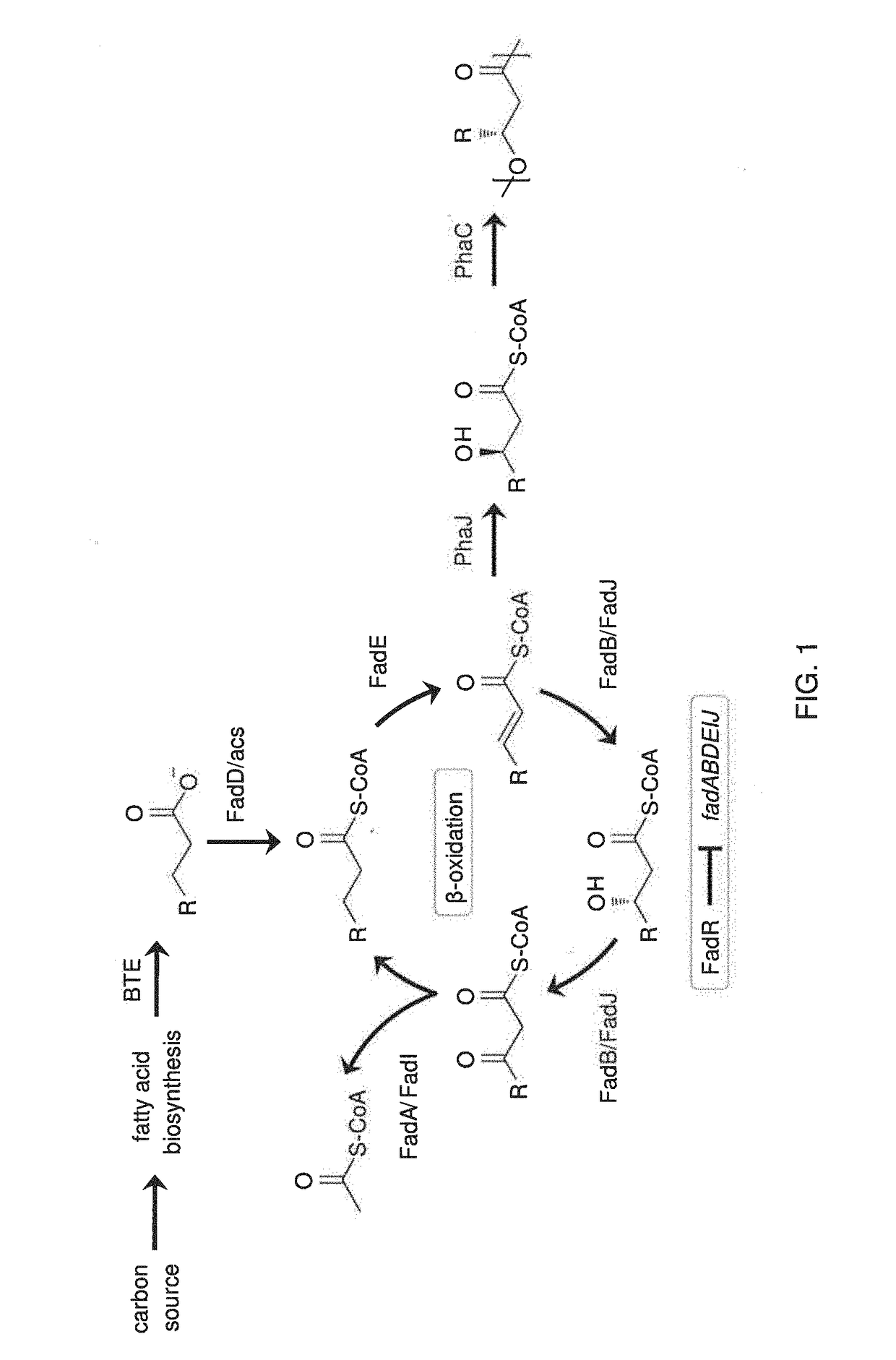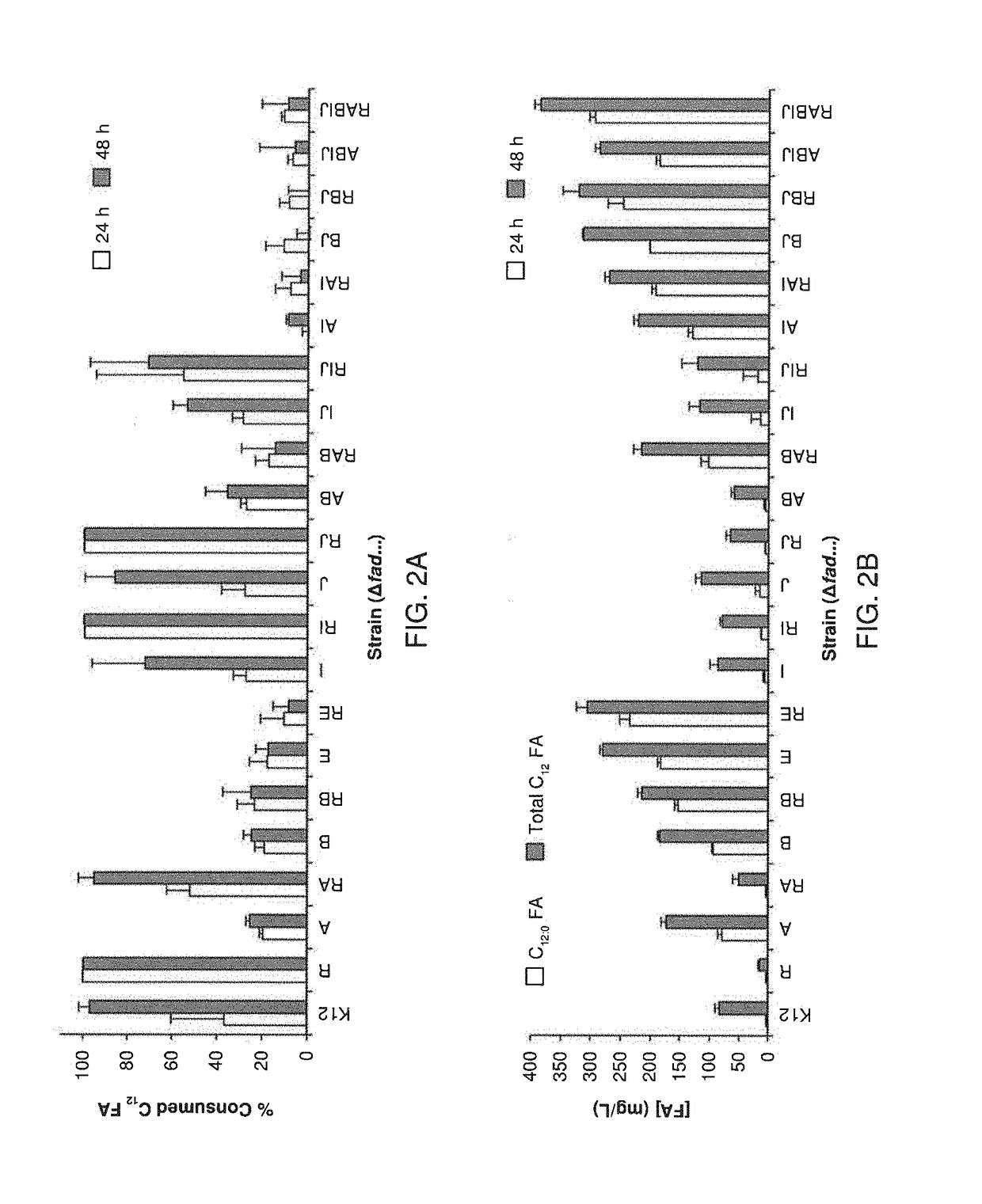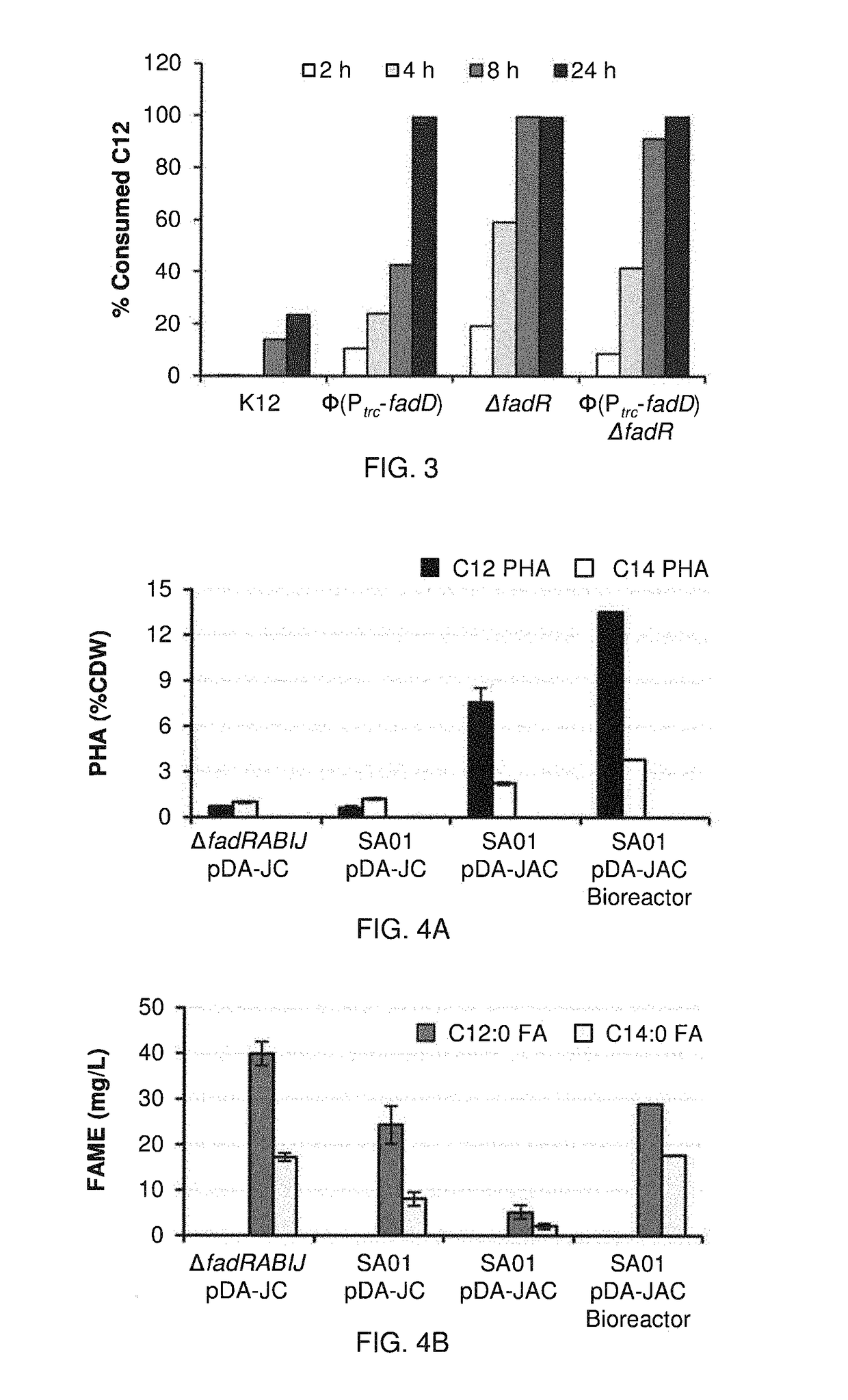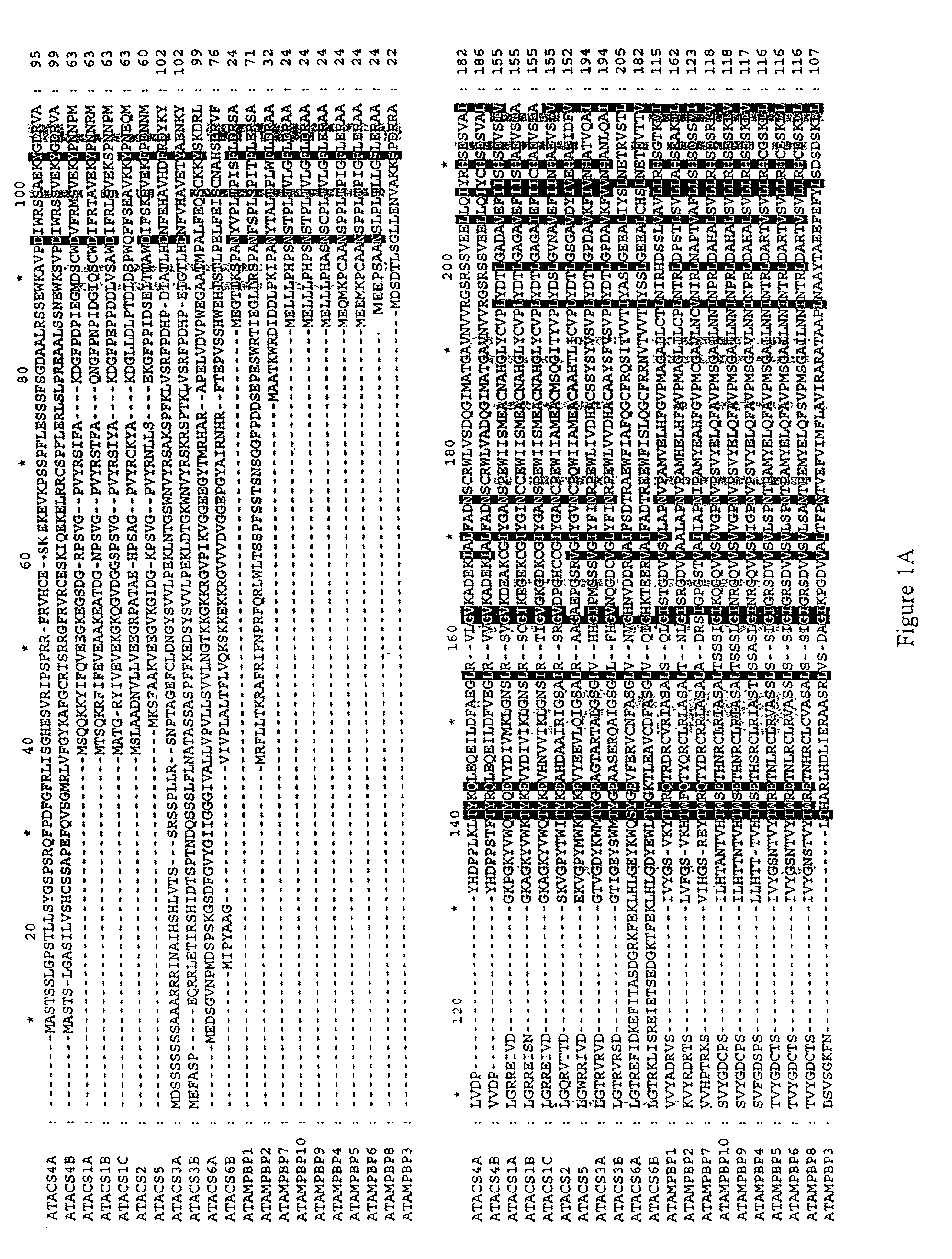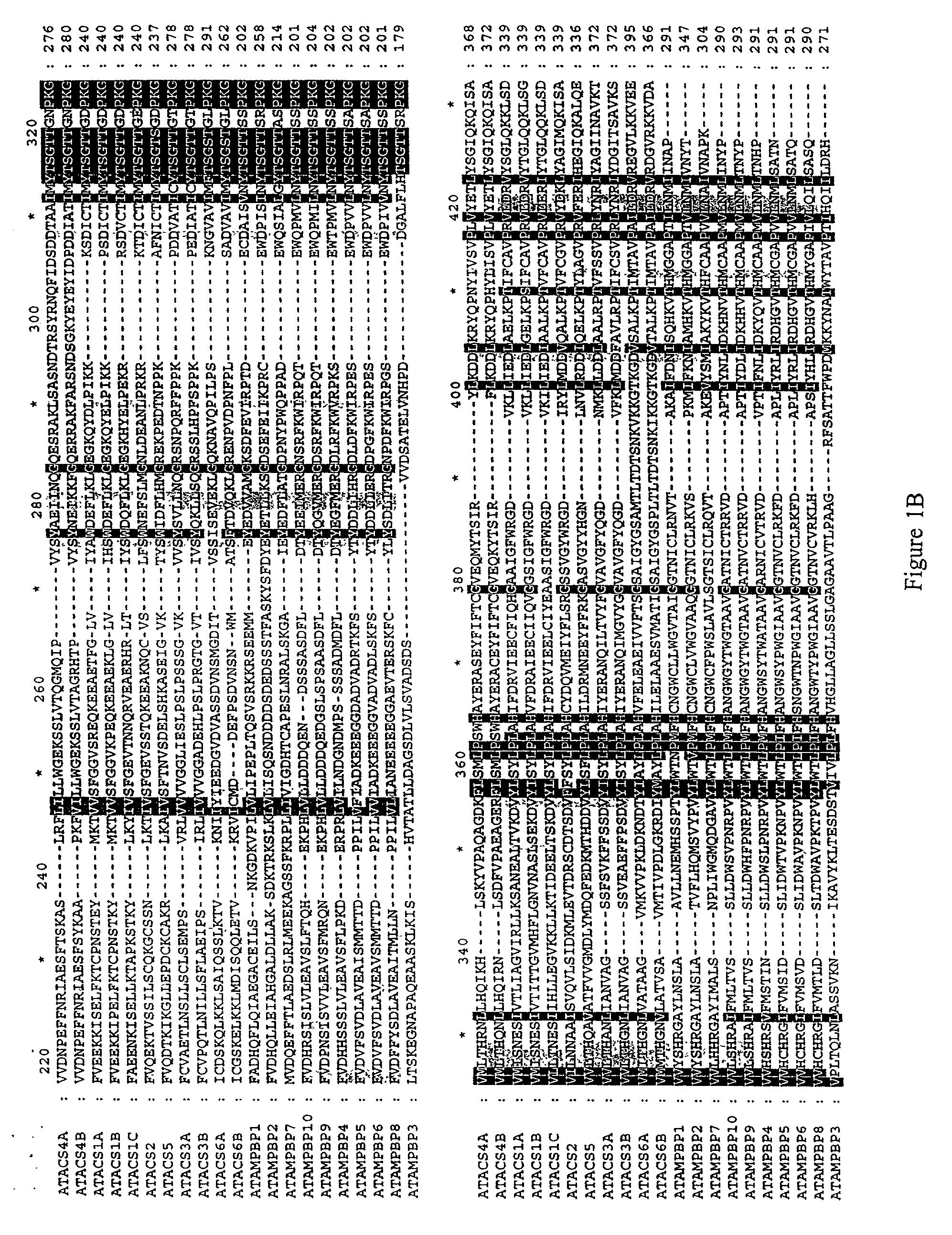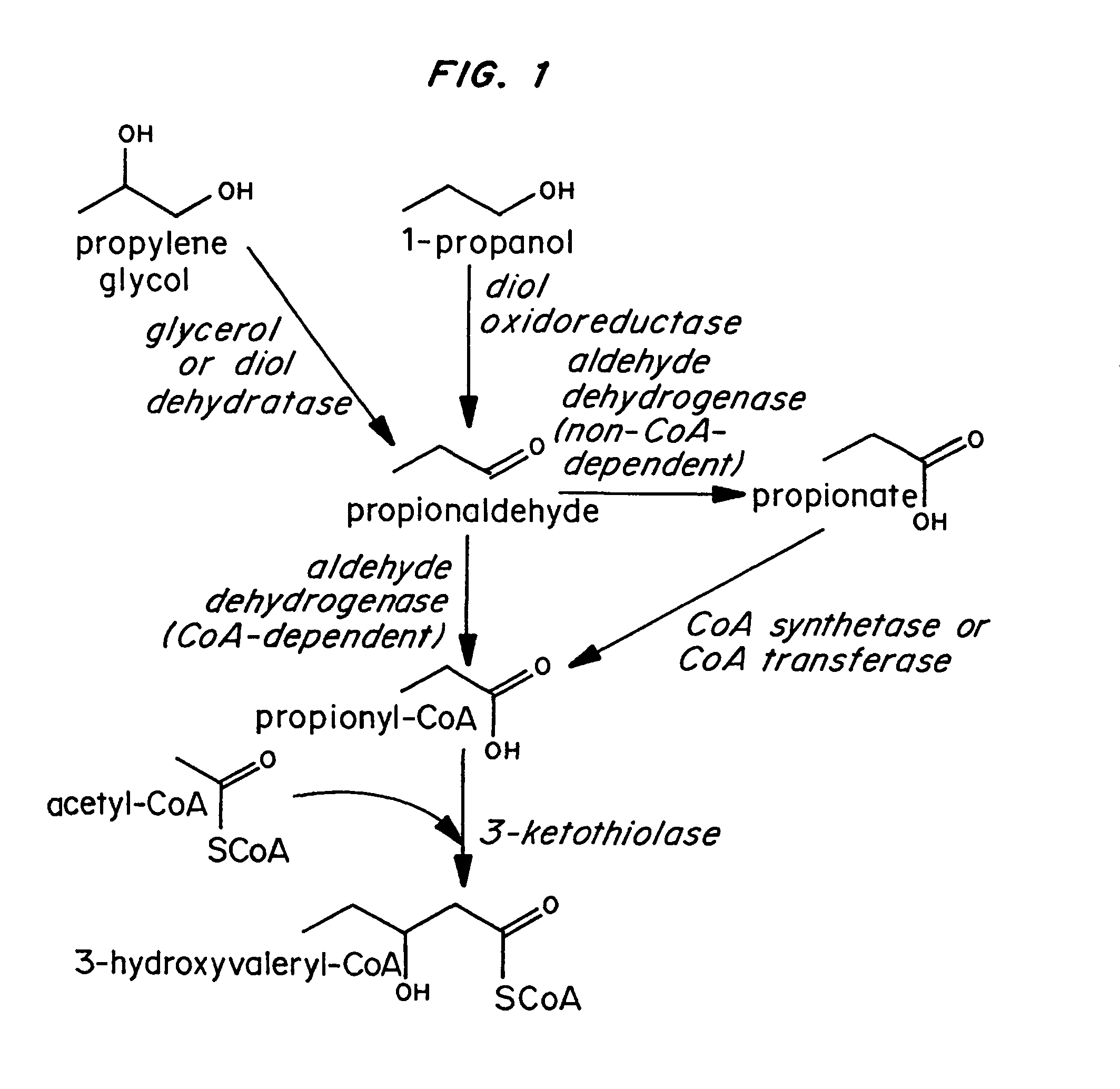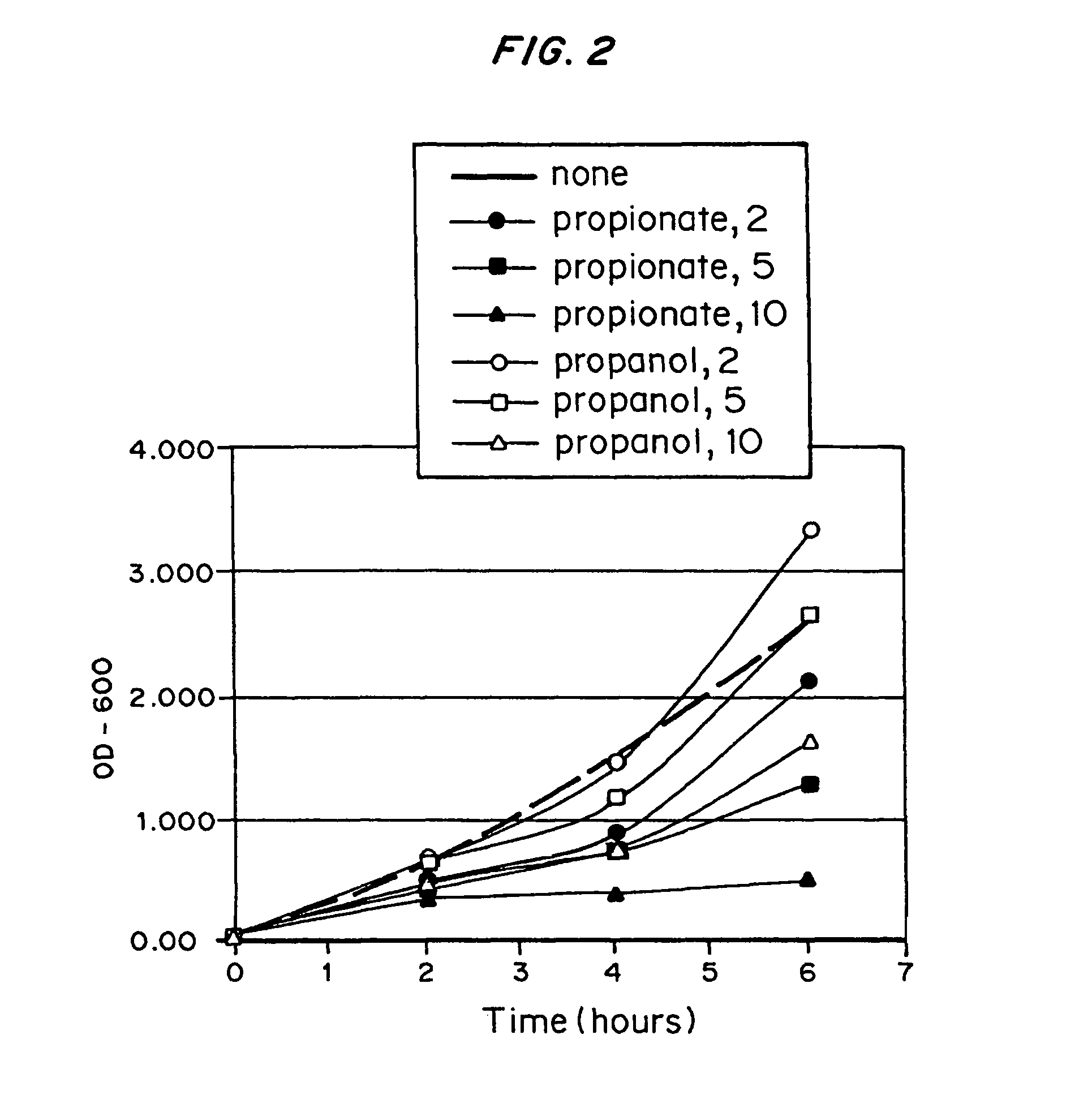Patents
Literature
Hiro is an intelligent assistant for R&D personnel, combined with Patent DNA, to facilitate innovative research.
49 results about "Acyl-CoA synthetase" patented technology
Efficacy Topic
Property
Owner
Technical Advancement
Application Domain
Technology Topic
Technology Field Word
Patent Country/Region
Patent Type
Patent Status
Application Year
Inventor
Polyunsaturated fatty acid production in heterologous organisms using PUFA polyketide synthase systems
InactiveUS20070245431A1Improve the level ofReduce competitionOther foreign material introduction processesOxidoreductasesBiotechnologyHeterologous
Disclosed are novel acyl-CoA synthetases and novel acyltransferases, nucleic acid molecules encoding the same, recombinant nucleic acid molecules and recombinant host cells comprising such nucleic acid molecules, genetically modified organisms (microorganisms and plants) comprising the same, and methods of making and using the same. Also disclosed are genetically modified organisms (e.g., plants, microorganisms) that have been genetically modified to express a PKS-like system for the production of PUFAs (a PUFA PKS system or PUFA synthase), wherein the organisms have been modified to express an acyl-CoA synthetase, to express an acyl transferase, to delete or inactivate a fatty acid synthase (FAS) expressed by the organism, to reduce competition for malonyl CoA with the PUFA synthase or to increase the level of malonyl CoA in the plant or plant cell, and in one aspect, to inhibit KASII or KASIII. Additional modifications, and methods to make and use such organisms, in addition to PUFAs and oils obtained from such organisms, are disclosed, alone with various products including such PUFAs and oils.
Owner:SEMBIOSYS GENETICS INC +1
Polyunsaturated fatty acid production in heterologous organisms using pufa polyketide synthase systems
ActiveUS20070270494A1Improve the level ofReduce competitionAntibacterial agentsOrganic active ingredientsHeterologousAcyl-CoA synthetase
Disclosed are novel acyl-CoA synthetases and novel acyltransferases, nucleic acid molecules encoding the same, recombinant nucleic acid molecules and recombinant host cells comprising such nucleic acid molecules, genetically modified organisms (microorganisms and plants) comprising the same, and methods of making and using the same. Also disclosed are genetically modified organisms (e.g., plants, microorganisms) that have been genetically modified to express a PKS-like system for the production of PUFAs (a PUFA PKS system or PUFA synthase), wherein the organisms have been modified to express an acyl-CoA synthetase, to express an acyl transferase, to delete or inactivate a fatty acid synthase (FAS) expressed by the organism, to reduce competition for malonyl CoA with the PUFA synthase or to increase the level of malonyl CoA in the organism, and in one aspect, to inhibit KASII or KASIII. Additional modifications, and methods to make and use such organisms, in addition to PUFAs and oils obtained from such organisms, are disclosed, alone with various products including such PUFAs and oils.
Owner:DSM IP ASSETS BV
Active components of Chinese-medicinal medicine with weight-losing and hypolipemic actions and its relative medicine
InactiveCN1363367AInhibit synthesisInhibition of differentiationMetabolism disorderUnknown materialsAcyl-CoA synthetaseActive component
The active hypolipemic components in 40 Chinese-medicinal materials and their relative medicines are disclosed. Said active components can suppress the activity of fatty acid synthetase and the differentiation from profat cells to fat cells and activate the activity of acyl-CoA synthetase. Said medicines feature high effect and low toxic by-effect.
Owner:PEKING UNIV +1
Polyhydroxyalkanoate production from polyols
InactiveUS20050239179A1Promote recoveryProduct can be usedBacteriaMicroorganism based processes3-Hydroxypropionic acidPropanoic acid
Organisms are provided which express enzymes such as glycerol dehydratase, diol dehydratase, acyl-CoA transferase, acyl-CoA synthetase β-ketothiolase, acetoacetyl-CoA reductase, PHA synthase, glycerol-3-phosphate dehydrogenase and glycerol-3-phosphatase, which are useful for the production of PHAs. In some cases one or more of these genes are native to the host organism and the remainder are provided from transgenes. These organisms produce poly (3-hydroxyalkanoate) homopolymers or co-polymers incorporating 3-hydroxypropionate or 3-hydroxyvalerate monomers wherein the 3-hydroxypropionate and 3-hydroxyvalreate units are derived from the enzyme catalysed conversion of diols. Suitable diols that can be used include 1,2-propanediol, 1,3 propanediol and glycerol. Biochemical pathways for obtaining the glycerol from normal cellular metabolites are also described. The PHA polymers are readily recovered and industrially useful as polymers or as starting materials for a range of chemical intermediates including 1,3-propanediol, 3-hydroxypropionaldehyde, acrylics, malonic acid, esters and amines.
Owner:CJ CHEILJEDANG CORP
Fermentative production of acetone from renewable resources by means of novel metabolic pathway
ActiveUS20100261237A1YieldHigh yieldSugar derivativesHydrolasesAcyl Coenzyme A SynthetasesAcyl-CoA synthetase
The invention describes a process for preparing acetone starting from acetyl-coenzyme A comprising process steps A. enzymatic conversion of acetyl-CoA into acetoacetyl-CoA B. enzymatic conversion of acetoacetyl-CoA into acetoacetate and CoA and C. decarboxylation of acetoacetate to acetone and CO2, which is characterized in that the coenzyme A is not transferred in process step B to an acceptor molecule. In addition, process step B is surprisingly catalysed by enzymes of the classes of acyl-CoA thioesterase, acyl-CoA synthetase or acyl-CoA thiokinase.A completely novel metabolic pathway is concerned, because the enzymatic hydrolysis of acetoacetyl-CoA without simultaneous transfer of CoA to a receptor molecule has never previously been described for any microbial enzyme.
Owner:EVONIK OPERATIONS GMBH
Polyunsaturated fatty acid production in heterologous organisms using pufa polyketide synthase systems
InactiveCN101573451AImprove the level ofReduce competitionMicrobiological testing/measurementAcyl Coenzyme A SynthetasesBiotechnology
Disclosed are novel acyl-CoA synthetases and novel acyltransferases, nucleic acid molecules encoding the same, recombinant nucleic acid molecules and recombinant host cells comprising such nucleic acid molecules, genetically modified organisms (microorganisms and plants) comprising the same, and methods of making and using the same. Also disclosed are genetically modified organisms (e.g., plants, microorganisms) that have been genetically modified to express a PKS-like system for the production of PUFAs (a PUFA PKS system or PUFA synthase), wherein the organisms have been modified to express an acyl-CoA synthetase, to express an acyl transferase, to delete or inactivate a fatty acid synthase (FAS) expressed by the organism, to reduce competition for malonyl CoA with the PUFA synthase or toincrease the level of malonyl CoA in the organism, and in one aspect, to inhibit KASII or KASIII. Additional modifications, and methods to make and use such organisms, in addition to PUFAs and oils o btained from such organisms, are disclosed, alone with various products including such PUFAs and oils.
Owner:DSM IP ASSETS BV
Production of fatty alcohols from engineered microorganisms
The invention generally relates to the production of a fatty alcohol composition from recombinant microbial cells. The fatty alcohols are produced by expressing a gene encoding a heterologous fatty alcohol forming acyl-CoA reductase (“FAR”); a gene encoding a heterologous thioesterase (“TE”) gene and a gene encoding an acyl-CoA synthetase (“ACS”).
Owner:CODEXIS INC
Polyhydroxyalkanoate production from polyols
Organisms are provided which express enzymes such as glycerol dehydratase, diol dehydratase, acyl-CoA transferase, acyl-CoA synthetase β-ketothiolase, acetoacetyl-CoA reductase, PHA synthase, glycerol-3-phosphate dehydrogenase and glycerol-3-phosphatase, which are useful for the production of PHAs. In some cases one or more of these genes are native to the host organism and the remainder are provided from transgenes. These organisms produce poly (3-hydroxyalkanoate) homopolymers or co-polymers incorporating 3-hydroxypropionate or 3-hydroxyvalerate monomers wherein the 3-hydroxypropionate and 3-hydroxyvalerate units are derived from the enzyme catalysed conversion of diols. Suitable diols that can be used include 1,2-propanediol, 1,3 propanediol and glycerol. Biochemical pathways for obtaining the glycerol from normal cellular metabolites are also described. The PHA polymers are readily recovered and industrially useful as polymers or as starting materials for a range of chemical intermediates including 1,3-propanediol, 3-hydroxypropionaldehyde, acrylics, malonic acid, esters and amines.
Owner:CJ CHEILJEDANG CORP
System for screening fatty acid transport inhibitors, methods of use and modulators identified thereby
Methods for identifying modulators of fatty acid transport and / or uptake, comprising contacting, under conditions favorable for fatty acid uptake, a putative modulator, e.g., an inhibitor with a system comprising genetic material encoding a fatty acid transport mediator (“TTM”), particularly FAA1, FAA2, FAA3, FAA4, FAT1, fadL, fadD, FATP, CD36 and FABP, or orthologs, homologs, isoforms, variants, analogs, derivatives or fragments thereof, and combinations thereof, or fatty acid transport mediator proteins (“TTMps”), e.g., Faa1p, Faa2p, Faa3p, Faa4p, Fat1p, FadL, fatty acyl CoA synthetase, FATP, CD36 and FABP, or orthologs, homologs, isoforms, variants, analogs, derivatives or fragments thereof, and combinations thereof, and determining the effect of the putative modulator. The test system may be a cell such as Saccharomyces cerevisiae, E. coli, H. sapiens, etc. or an in vitro system.
Owner:ALBANY MEDICAL COLLEGE
Acyl-coenzyme A synthetase and application thereof
Owner:WUXI NEWWAY FERMENTATION TECH RES INST
Methods and compositions for determining the responsiveness of cancer therapeutics
InactiveUS20120252748A1Activity of siRNA be facilitatedInhibition is effectiveBiocideGenetic material ingredientsAcyl-CoA synthetaseOncology
The present invention relates to methods for predicting the responsiveness of a patient to a breast cancer treatment regimen by assaying a biological sample to determine the level of expression of the long-chain fatty acyl-CoA synthetase 4 (ACSL4) in the biological sample. The present invention also provides ACSL4 inhibitors and uses of ACSL4 inhibitors as adjuvant therapies in breast cancer treatment regimens.
Owner:NEW YORK UNIV
Biosynthetic production of acyl amino acids
InactiveCN107075463ABacteriaMicroorganism based processesAcyl Coenzyme A SynthetasesAcyl-CoA synthetase
Owner:EVONIK DEGUSSA GMBH
Polynucleotide encoding acyl-coa synthetase homolog and use thereof
ActiveUS20120322992A1Improve production efficiencyEfficient preparationCosmetic preparationsFungiAcyl Coenzyme A SynthetasesBiotechnology
The present invention relates to an acyl-CoA synthetase homolog protein from microorganisms of the genus Mortierella, a polynucleotide encoding the protein, and so on. The invention provides polynucleotides comprising an acyl-CoA synthetase homolog protein gene from, e.g., Mortierella alpina, expression vectors comprising these polynucleotides and transformants thereof, a method for producing lipids or fatty acids using the transformants, food products containing the lipids or fatty acids produced by the method, etc.
Owner:SUNTORY HLDG LTD
Byosynthetic Production of Acyl Amino Acids
InactiveUS20170130248A1PurityYield andLigasesAcyltransferasesAcyl Coenzyme A SynthetasesAcyl-CoA synthetase
The present invention relates to a cell for producing acyl glycinates wherein the cell is genetically modified to compriseat least a first genetic mutation that increases the expression relative to the wild type cell of an amino acid-N-acyl-transferase,at least a second genetic mutation that increases the expression relative to the wild type cell of an acyl-CoA synthetase, andat least a third genetic mutation that decreases the expression relative to the wild type cell of at least one enzyme selected from the group consisting of an enzyme of the glycine cleavage system, glycine hydroxymethyltransferase (GlyA) and threonine aldolase (LtaE).
Owner:EVONIK DEGUSSA GMBH
Active components of Chinese-medicinal medicine with weight-losing and hypolipemic actions and its relative medicine
InactiveCN1159047CInhibit synthesisInhibition of differentiationMetabolism disorderUnknown materialsAcyl-CoA synthetaseActive component
The active hypolipemic components in 40 Chinese-medicinal materials and their relative medicines are disclosed. Said active components can suppress the activity of fatty acid synthetase and the differentiation from profat cells to fat cells and activate the activity of acyl-CoA synthetase. Said medicines feature high effect and low toxic by-effect.
Owner:PEKING UNIV +1
Production of polyhydroxyalkanoates with a defined composition from an unrelated carbon source
Cells and methods for producing polyhydroxyalkanoates. The cells comprise one or more recombinant genes selected from an R-specific enoyl-CoA hydratase gene, a PHA polymerase gene, a thioesterase gene, and an acyl-CoA-synthetase gene. The cells further have one or more genes functionally deleted. The functionally deleted genes include such genes as an enoyl-CoA hydratase gene, a 3-hydroxyacyl-CoA dehydrogenase, and a 3-ketoacyl-CoA thiolase gene. The recombinant cells are capable of using producing polyhydroxyalkanoates with a high proportion of monomers having the same carbon length from non-lipid substrates, such as carbohydrates.
Owner:WISCONSIN ALUMNI RES FOUND
Recombinant bacterium for synthesizing butantriol oleate and construction method and application thereof
ActiveCN110791466AAchieve synthesisRealization of esterificationBacteriaHydrolasesEscherichia coliAcyl-CoA synthetase
The invention discloses a recombinant bacterium for synthesizing butantriol oleate as well as a construction method and application of the recombinant bacterium, belonging to the technical field of gene engineering. For the recombinant bacterium, escherichia coli is used as an original strain, and a gene for encoding acyltransferase, a gene for encoding acyl CoA synthetase, a gene for encoding enoyl ACP reductase, a gene for encoding glycerol kinase, a gene for encoding 3-phosphoglycerol acyltransferase and a gene for encoding DAGP phosphatase are introduced into the escherichia coli to obtainrecombinant bacterium. Through fermentation, first synthesis of 1,2,4-butantriol oleate is realized. The recombinant bacterium constructed by the invention is fermented in an LB culture medium for 24hours, and the esterification of butantriol and sodium oleate can be realized to obtain the butantriol oleate, so that a new thought is provided for separation and purification of the butantriol.
Owner:QINGDAO INST OF BIOENERGY & BIOPROCESS TECH CHINESE ACADEMY OF SCI
Cells and methods for producing fatty alcohols
Recombinant cells and methods for improved yield of fatty alcohols. The recombinant cells harbor a recombinant thioesterase gene, a recombinant acyl-CoA synthetase gene, and a recombinant acyl-CoA reductase gene. In addition, a gene product from one or more of an acyl-CoA dehydrogenase gene, an enoyl-CoA hydratase gene, a 3-hydroxyacyl-CoA dehydrogenase gene, and a 3-ketoacyl-CoA thiolase gene in the recombinant cells is functionally deleted. Culturing the recombinant cells produces fatty alcohols at high yields.
Owner:WISCONSIN ALUMNI RES FOUND
Fatty acid-producing hosts
Described are hosts for overproducing a fatty acid product such as a fatty acid. The hosts include an exogenous nucleic acid encoding a thioesterase and, optionally, an exogenous nucleic acid encoding an acetyl-CoA carboxylase, wherein an acyl-CoA synthetase in the hosts are functionally deleted. The hosts preferably include the nucleic acid encoding the thioesterase at an intermediate copy number. The hosts are preferably recombinantly stable and growth-competent at 37° C. Methods of producing a fatty acid product comprising culturing such hosts at 37° C. are also described.
Owner:WISCONSIN ALUMNI RES FOUND
Four-gene pathway for wax ester synthesis
ActiveUS8962299B2Reduce the amount of solutionEfficient and cost-effectiveSugar derivativesHydrolasesAcyl Coenzyme A SynthetasesPhylum Cyanobacteria
The invention relates to methods for producing a wax ester in recombinant host cells engineered to express a thioesterase, an acyl-CoA synthetase, an alcohol-forming fatty acyl reductase, and a wax ester synthase. The methods of the invention may take place in photosynthetic microorganisms, and particularly in cyanobacteria. Isolated nucleotide molecules and vectors expressing the thioesterase, acyl-CoA synthetase, alcohol-forming fatty acyl reductase, and wax ester synthase, recombinant host cells expressing the thioesterase, acyl-CoA synthetase, alcohol-forming fatty acyl reductase, and wax ester synthase, and systems for producing a wax ester via a pathway using these four enzymes, are also provided.
Owner:EXXON RES & ENG CO
Method for efficiently producing mevalonic acid from fatty acid and constructed gene engineering bacterium
ActiveCN103571785AEfficient conversionBacteriaMicroorganism based processesEscherichia coliFatty Acid Transport Proteins
The invention discloses a method for efficiently producing mevalonic acid from fatty acid and a constructed gene engineering bacterium. The method comprises the following steps: overexpressing a fatty acid transport protein gene (fadL) and an acyl-CoA synthetase gene (fadD) in an Escherichia coli, thus obtaining a recombinant Escherichia coli; and using the recombinant Escherichia coli to produce the mevalonic acid through fermentation. According to the method disclosed by the invention, long-chain fatty acid is used as a carbon source for synthesis of the mevalonic acid, the mevalonic acid yield can be up to 230mg / L, and the productivity can be up to 56%. The method disclosed by the invention can also be used for producing isoprene taking mevalonic acid as an intermediate product and terpenoid compounds synthesized by taking isoprene as a unit through fermentation.
Owner:QINGDAO INST OF BIOENERGY & BIOPROCESS TECH CHINESE ACADEMY OF SCI
Fermentative production of acetone from renewable resources by means of novel metabolic pathway
ActiveCN101423850AIncrease productionFavorable direction offsetHydrolasesLigasesAcyl Coenzyme A SynthetasesAcyl-CoA synthetase
The invention describes a process for the preparation of acetone starting from acetyl-coenzyme A comprising the process steps A. enzymatic conversion of acetyl-CoA to give acetoacetyl-CoA B. enzymatic conversion of acetoacetyl-CoA into acetoacetate and CoA, and C. decarboxylation of acetoacetate to give acetone and CO2, which process is characterized in that, in process step B, the coenzyme A is not transferred to an acceptor molecule. Moreover, surprisingly, process step B is catalyzed by enzymes from the classes acyl-CoA thioesterase, acyl-CoA synthetase or acyl-CoA thiokinase. This is an entirely novel metabolic pathway since the enzymatic hydrolysis of acetoacetyl-CoA without the simultaneous transfer of CoA to a receptor molecule has never been described before for any microbial enzyme.
Owner:EVONIK OPERATIONS GMBH
Polyunsaturated fatty acid production in heterologous organisms using pufa polyketide synthase systems
InactiveCN101573451BImprove the level ofReduce competitionMicrobiological testing/measurementHeterologousAcyl-CoA synthetase
The present application discloses novel acyl-CoA synthases and novel acyltransferases, nucleic acid molecules encoding the acyl-CoA synthases and acyltransferases, recombinant nucleic acid molecules and recombinant host cells containing the nucleic acid molecules, and recombinant host cells containing the nucleic acid molecules. Genetically modified organisms (microorganisms and plants) of the recombinant nucleic acid molecules and recombinant host cells and methods of obtaining and using the organisms. The present application also discloses genetically modified organisms (eg, plants or microorganisms) that have been genetically modified to express a PKS-like system (PUFA PKS system or PUFA synthase) to produce PUFA, wherein the organism has been genetically modified to express an acyl-CoA synthetase, has been genetically modified to express an acyltransferase, has been genetically modified to remove or inactivate a fatty acid synthase (FAS) expressed by said organism to convert malonyl in said organism CoA reduces competition with PUFA synthase or increases malonyl-CoA levels, and in one aspect, has been genetically modified to inhibit KASII or KASIII. In addition to PUFAs and oils derived from the above-mentioned organisms, the present application also discloses other modifications and methods of obtaining and using the above-mentioned organisms and various products including the above-mentioned PUFAs and oils.
Owner:DSM IP ASSETS BV
Polynucleotide encoding acyl-CoA synthetase homolog and use thereof
ActiveUS9289007B2Improve production efficiencyEfficient preparationCosmetic preparationsPeptide/protein ingredientsAcyl Coenzyme A SynthetasesBiotechnology
The present invention relates to an acyl-CoA synthetase homolog protein from microorganisms of the genus Mortierella, a polynucleotide encoding the protein, and so on. The invention provides polynucleotides comprising an acyl-CoA synthetase homolog protein gene from, e.g., Mortierella alpina, expression vectors comprising these polynucleotides and transformants thereof, a method for producing lipids or fatty acids using the transformants, food products containing the lipids or fatty acids produced by the method, etc.
Owner:SUNTORY HLDG LTD
Process for screening active components playing weight losing and hypolipemic role from Chinese-herbal medicines
InactiveCN1363686AClearly targetedThe mechanism is clear and reliableMicrobiological testing/measurementNew medicationsAcyl-CoA synthetase
A process for screening the active weight losing-hypolipemic component from Chinese-medicinal materials features that one or more of fatty acid synthetase, acyl-CoA synthetase and the differentiationof mouse and human pre-fat cells to mature fat cells are combined as target of said screening. Its advantages are clear target, and large-scale screening.
Owner:PEKING UNIV +1
Methods of using acyl-coa synthetase for biosynthetic production of acyl-coas
ActiveUS20170247733A2Easy to produceFacilitate subsequent productionLigasesFermentationAcyl coasAcyl-CoA synthetase
A biosynthetic method of making carboxyl CoA from long-chain carboxylic acid including expressing an ACS in a cellular system, feeding a long chain carboxylic acid to the cellular system, growing the cellular system in a medium, and producing carboxyl CoA.
Owner:CONAGEN INC
Free fatty acid detection kit
InactiveCN106442496AEliminate the effects ofImprove accuracyMaterial analysis by observing effect on chemical indicatorAcyl-CoA synthetaseIon exchange
The invention relates to the technical field of biology, and discloses a free fatty acid detection kit. The detection kit comprises a reagent R1 and a reagent R2, wherein the reagent R1 is prepared from triphosadenine, metal ions, fatty acyl-CoA synthetase and 4-aminoantipyrine; the reagent R2 is prepared from coenzyme A, Trinder's chromogen and diacylglycerol transferase. According to the embodiment, metal ions are added into the reagent R1, the metal ions and sulfydryl on the coenzyme A which is the free coenzyme A obtained after a reaction with free fatty acid can have an ion exchange and complexing reaction to form a stable chelate, and the influence generated on hydrogen peroxide by sulfydryl on the coenzyme A is eliminated. Accordingly, the purposes of improving the accuracy of the free fatty acid detection kit and improving the stability of the kit are achieved.
Owner:SHANGHAI KEHUA BIO ENG
Production of polyhydroxyalkanoates with a defined composition from an unrelated carbon source
Owner:WISCONSIN ALUMNI RES FOUND
Plant acyl-CoA synthetases
InactiveUS7105722B2Inhibit expressionSugar derivativesOther foreign material introduction processesAcyl Coenzyme A SynthetasesAcyl-CoA synthetase
The present invention relates to genes encoding plant acyl-CoA synthetases and methods of their use. In particular, the present invention is related to plant acyl-coenzyme A synthetases. The present invention encompasses both native and recombinant wild-type forms of the enzymes, as well as mutant and variant forms, some of which possess altered characteristics relative to the wild-type enzyme. The present invention also relates to methods of using acyl-CoA synthetases, including altered expression in transgenic plants and expression in prokaryotes and cell culture systems.
Owner:WASHINGTON STATE UNIV RES FOUND INC
Polyhydroxyalkanoate production by coenzyme A-dependent aldehyde dehydrogenase pathways
Organisms are provided containing genes encoding one or more enzymes, Coenzyme-A-dependent aldehyde dehydrogenase, acyl-CoA transferase, acyl-CoA synthetase, β-ketothiolase, acetoacetyl-CoA reductase and / or PHA synthase. In some cases one or more of these genes are native to the host organism and the remainder are heterologous genes provided by genetic engineering. These organisms produce poly (3-hydroxyalkanoate) homopolymers or co-polymers comprising 3-hydroxalkanoate monomers other than 3-hydroxybutryrate wherein these 3-hydroxyalkanoate units are derived from the enzyme-catalyzed conversion of alcohols to 3-hydroxyacyl-CoA monomers, where at least one step in the conversion pathway involves a Co-enzyme A-dependent aldehyde dehydrogenase activity. The PHA polymers are readily recovered and industrially useful as polymers for articles such as films, latexes, coatings, adhesives, fibers, binders, resins, and medical devices.
Owner:CJ CHEILJEDANG CORP
Features
- R&D
- Intellectual Property
- Life Sciences
- Materials
- Tech Scout
Why Patsnap Eureka
- Unparalleled Data Quality
- Higher Quality Content
- 60% Fewer Hallucinations
Social media
Patsnap Eureka Blog
Learn More Browse by: Latest US Patents, China's latest patents, Technical Efficacy Thesaurus, Application Domain, Technology Topic, Popular Technical Reports.
© 2025 PatSnap. All rights reserved.Legal|Privacy policy|Modern Slavery Act Transparency Statement|Sitemap|About US| Contact US: help@patsnap.com
